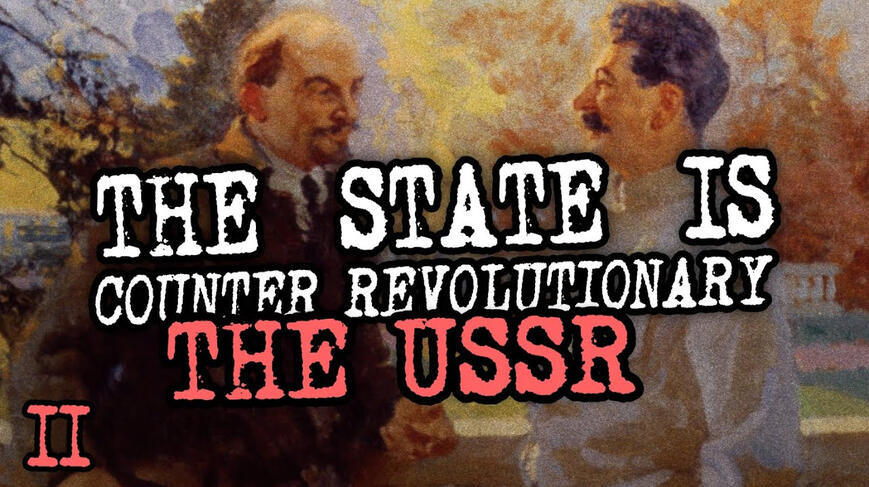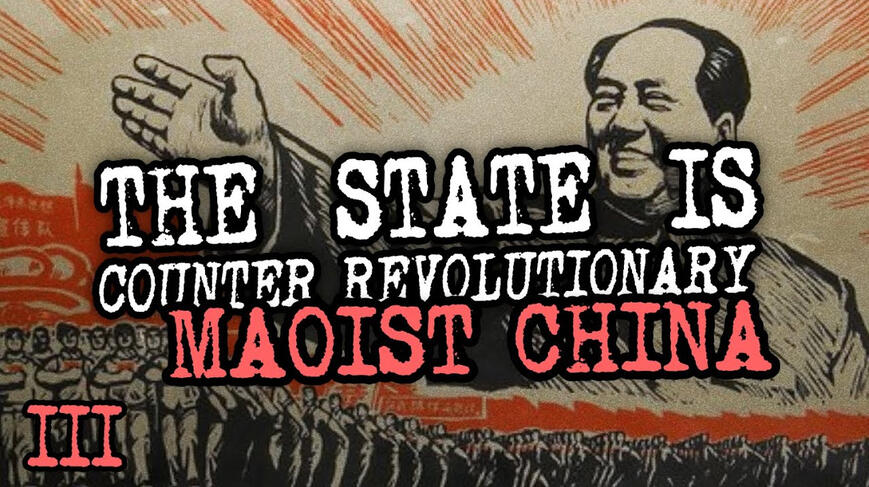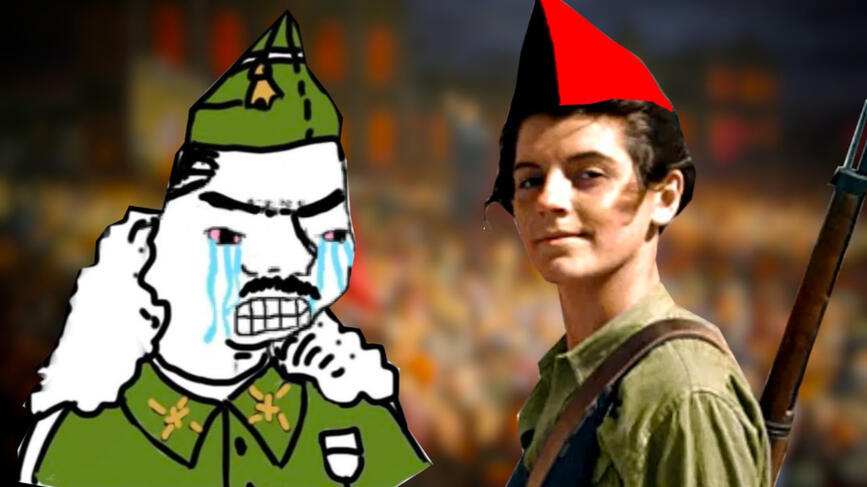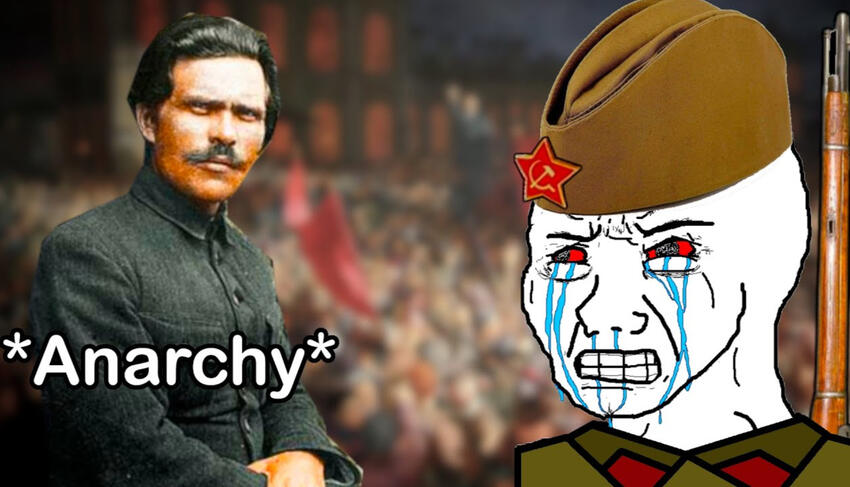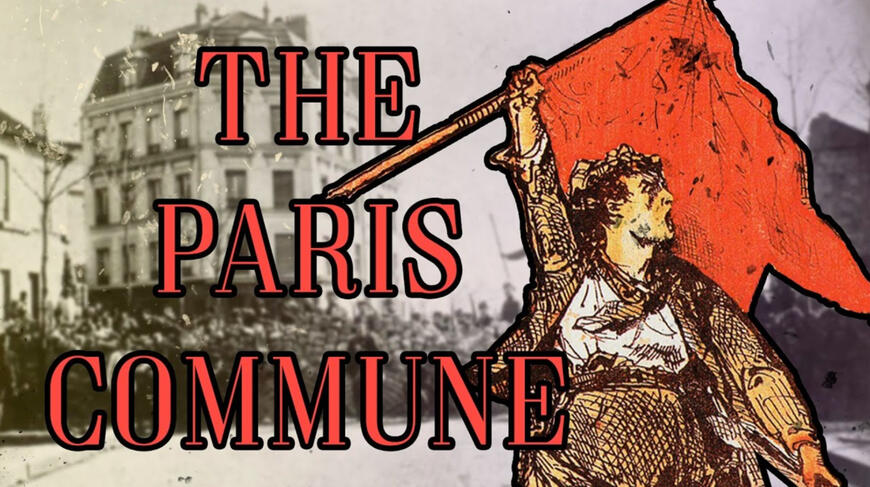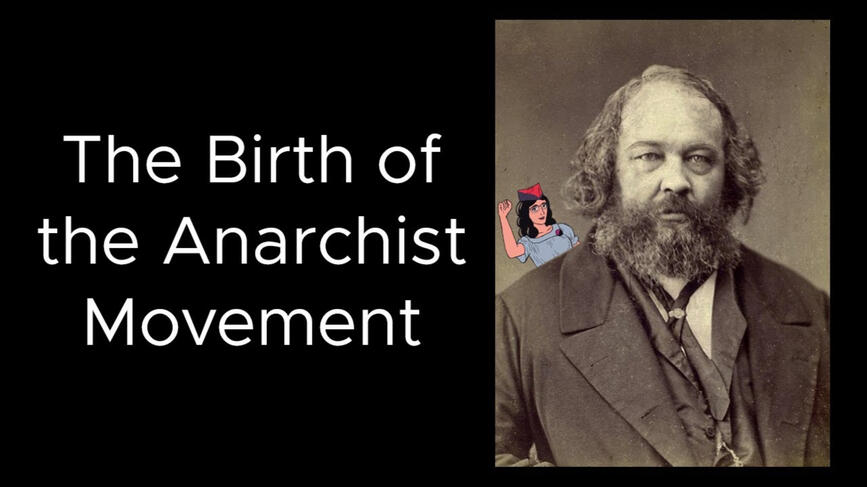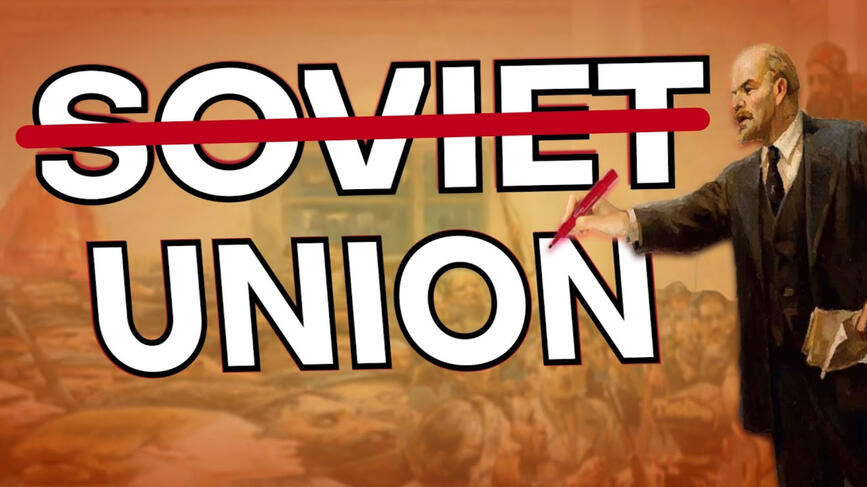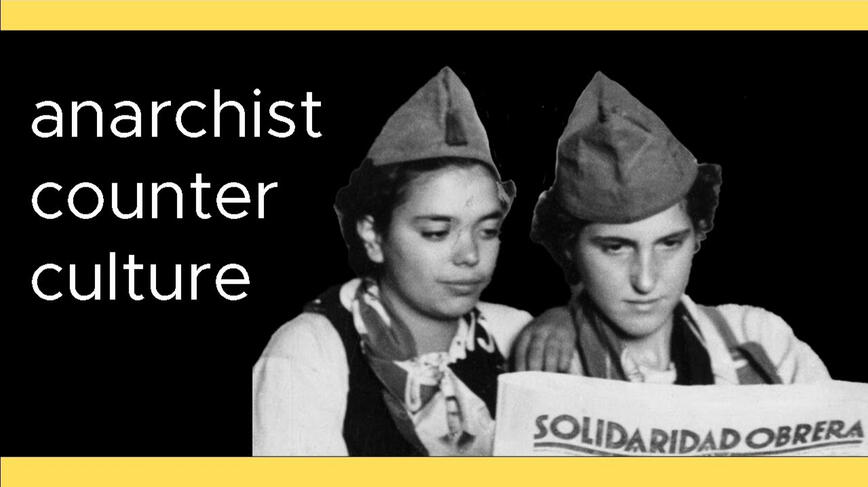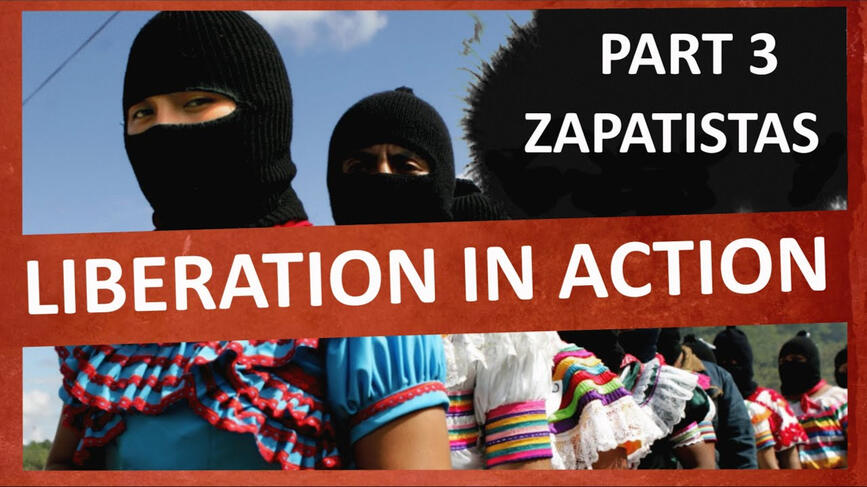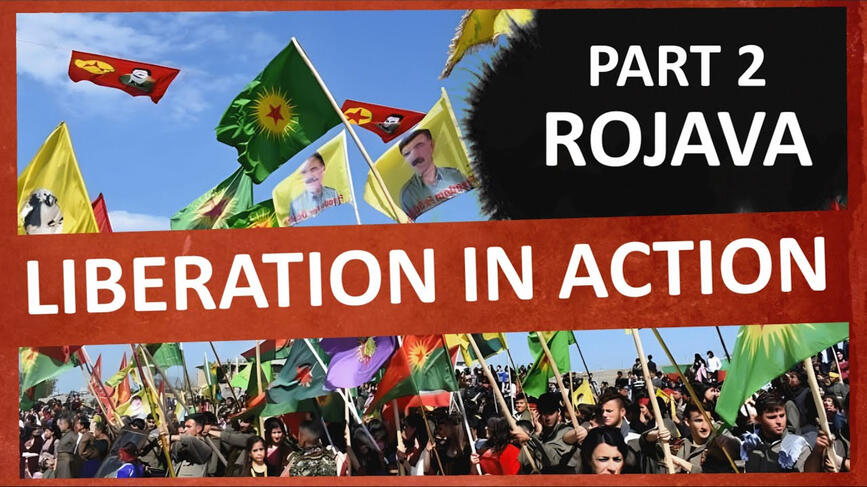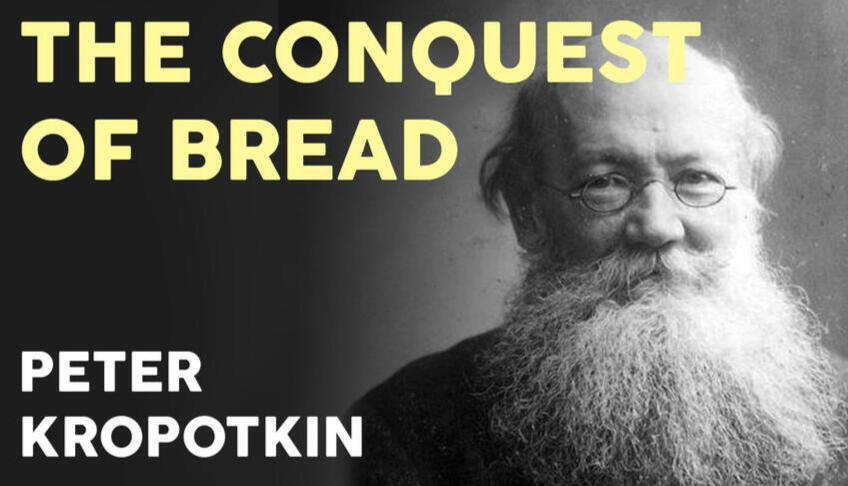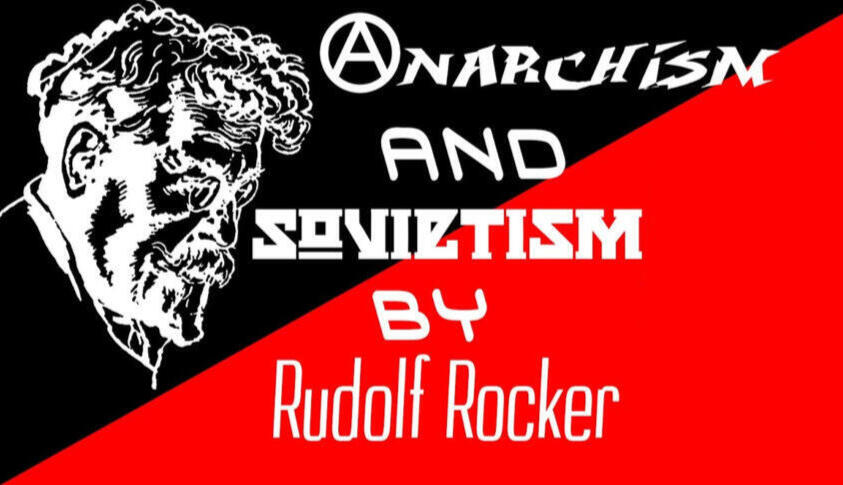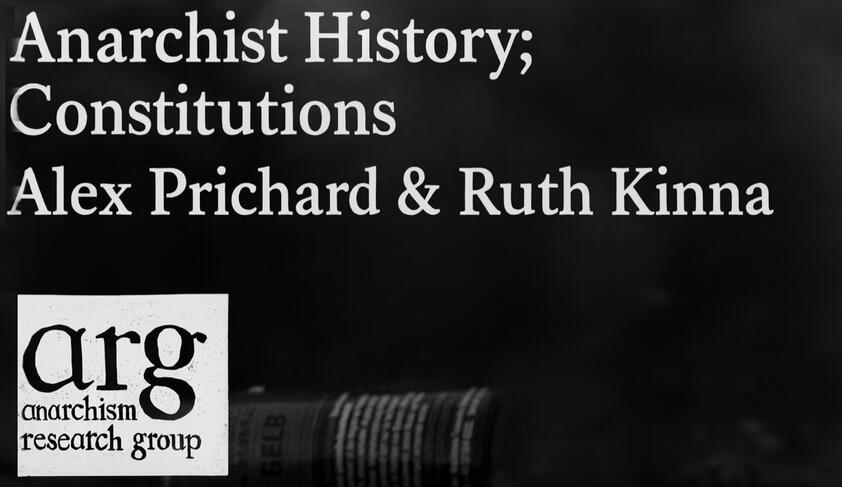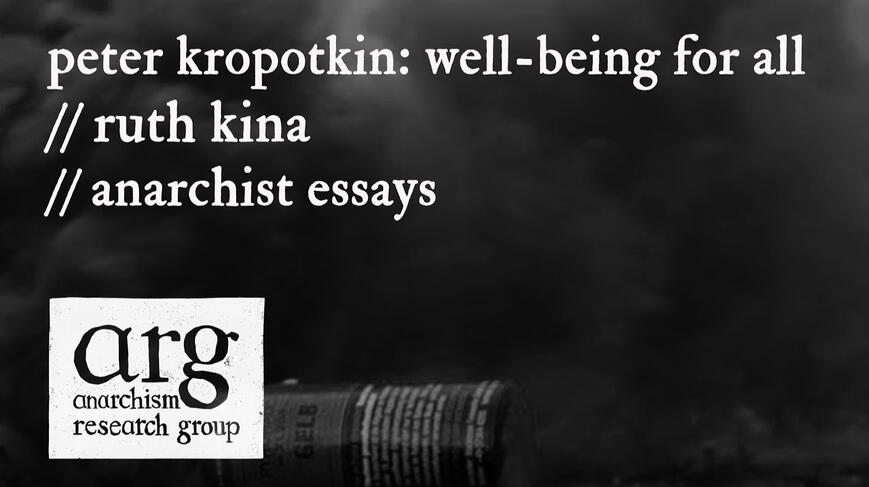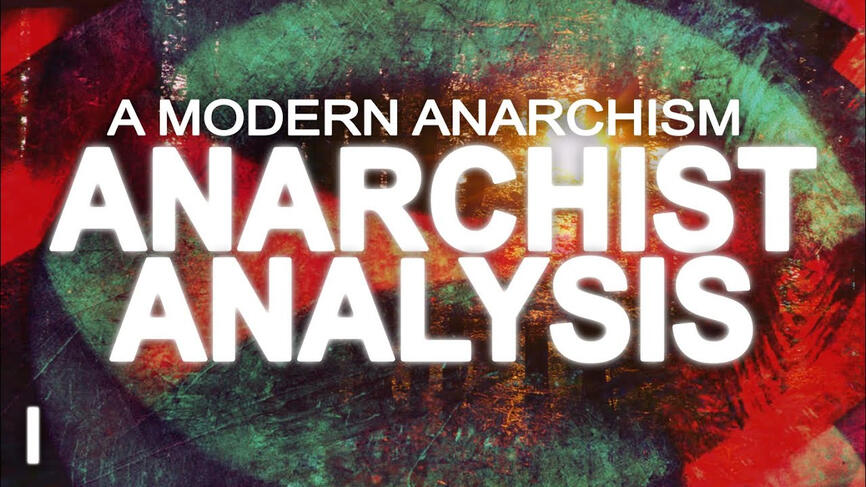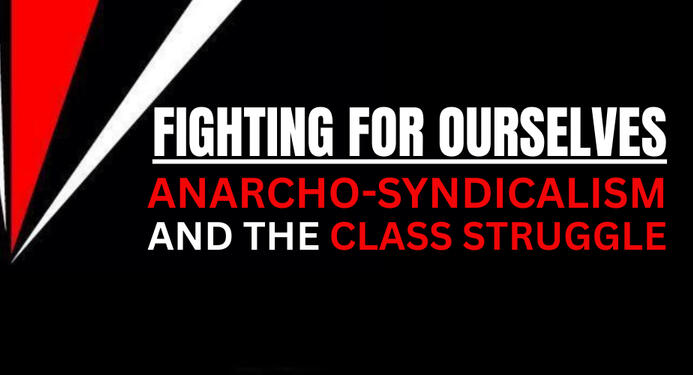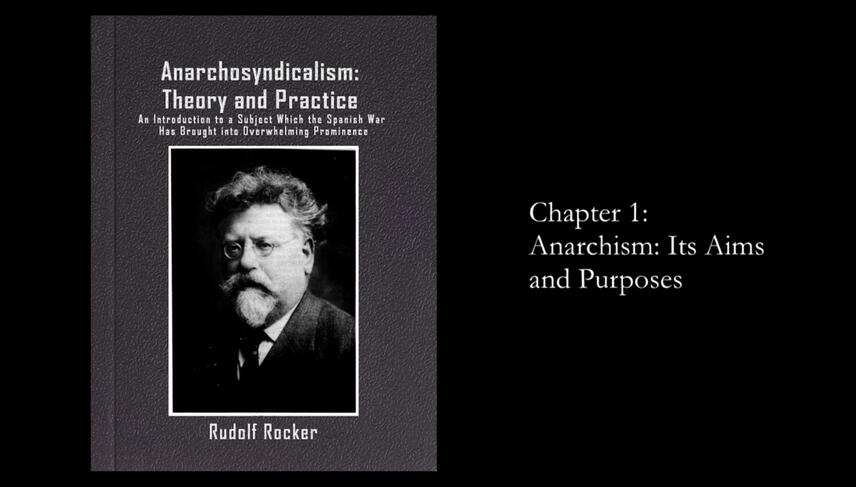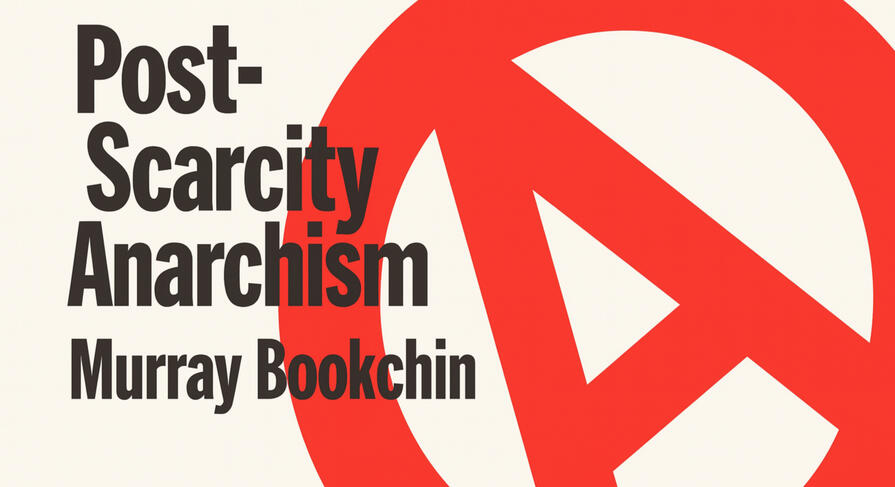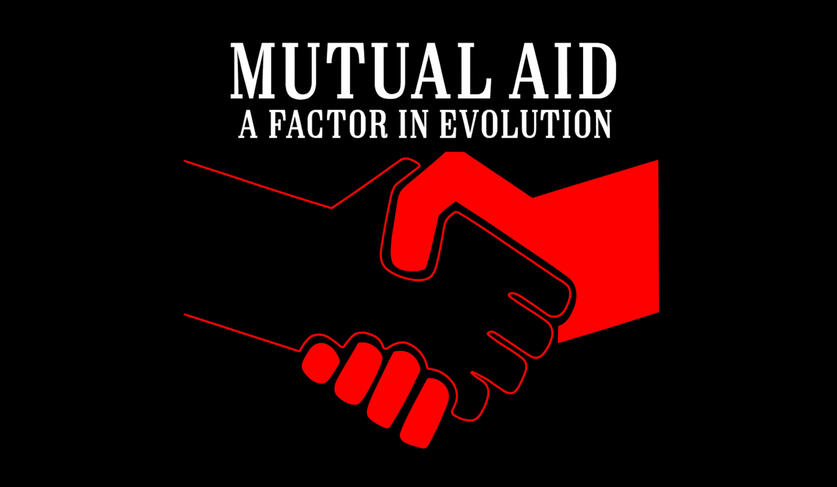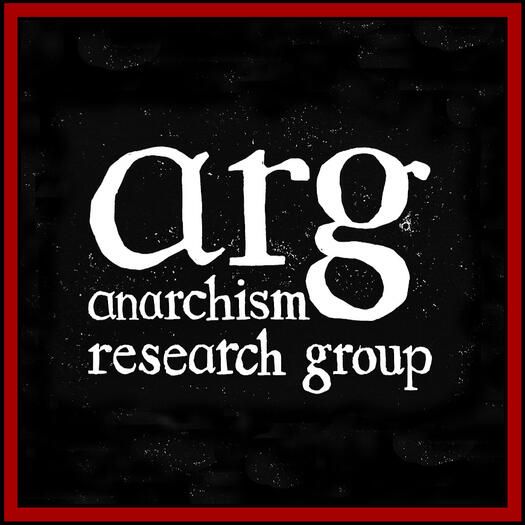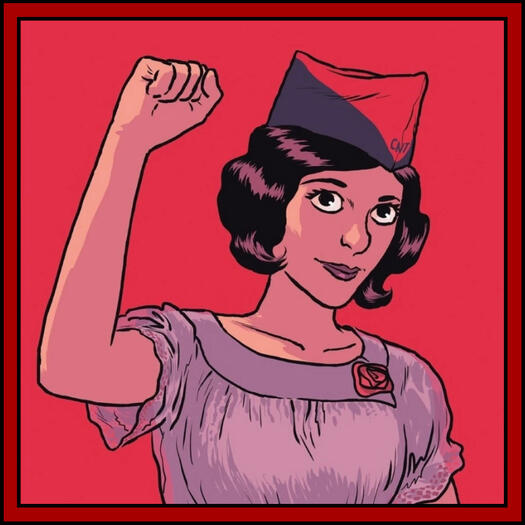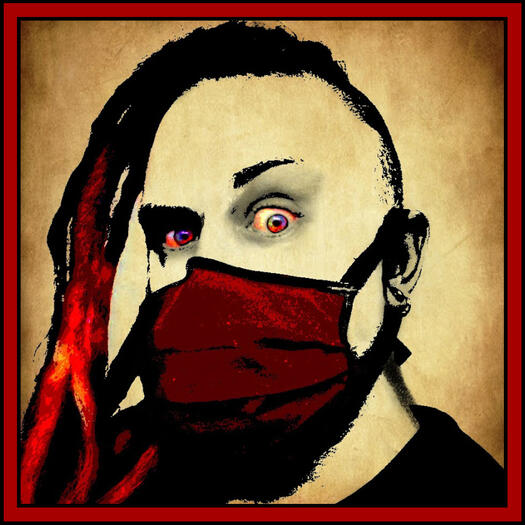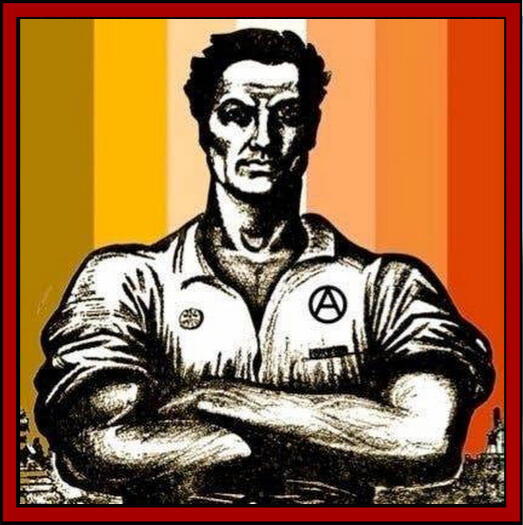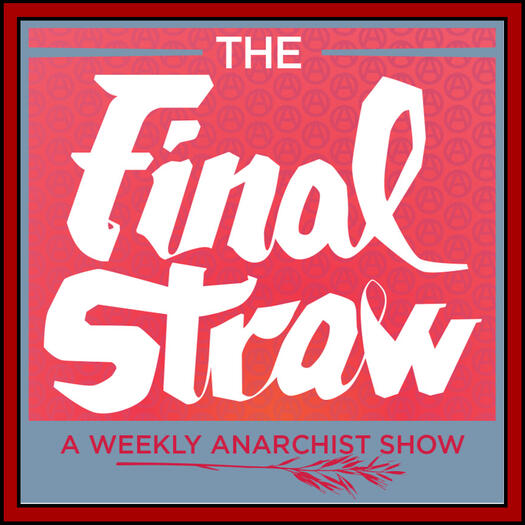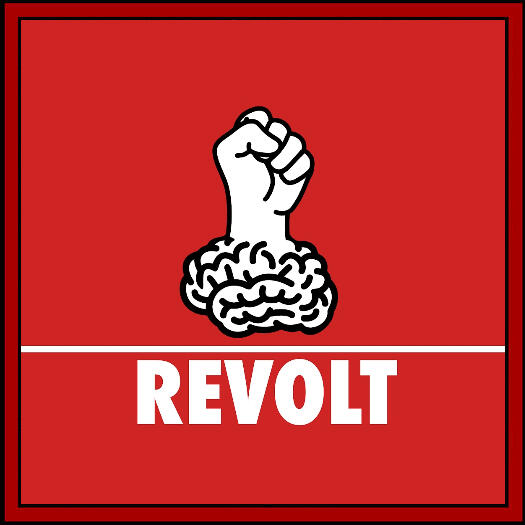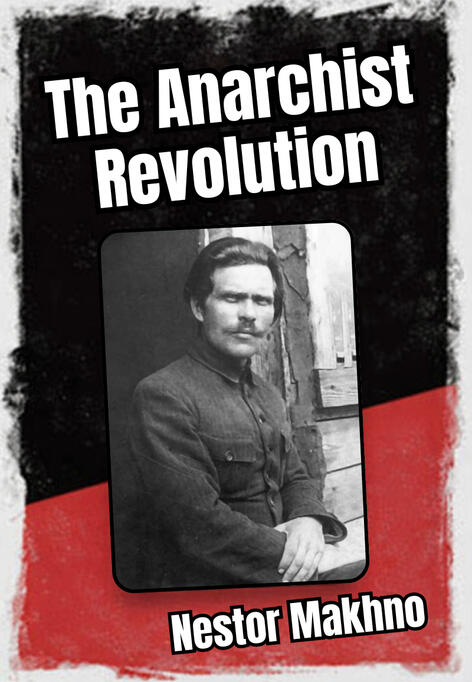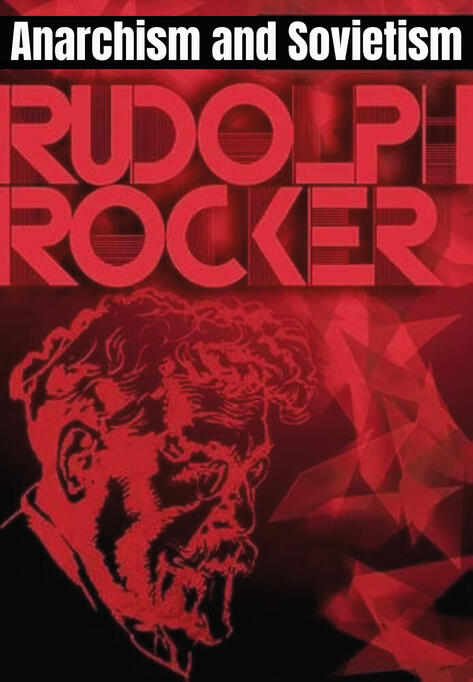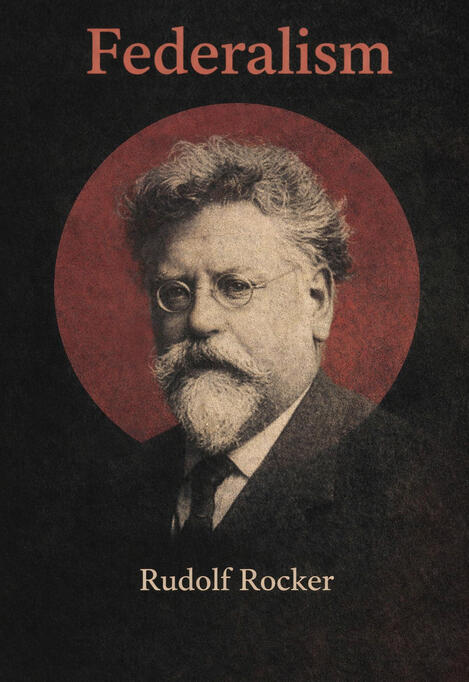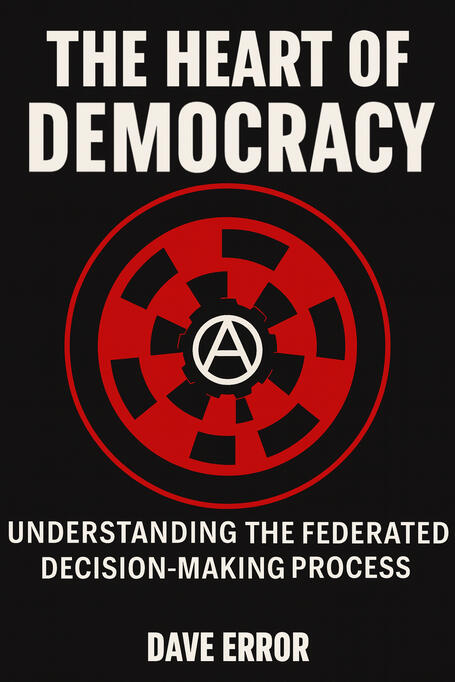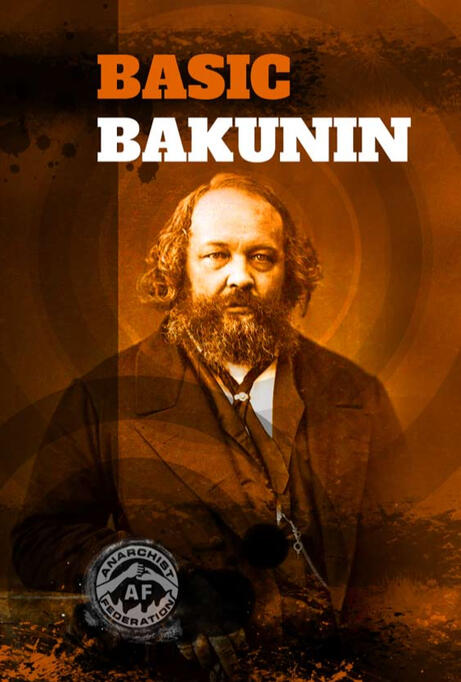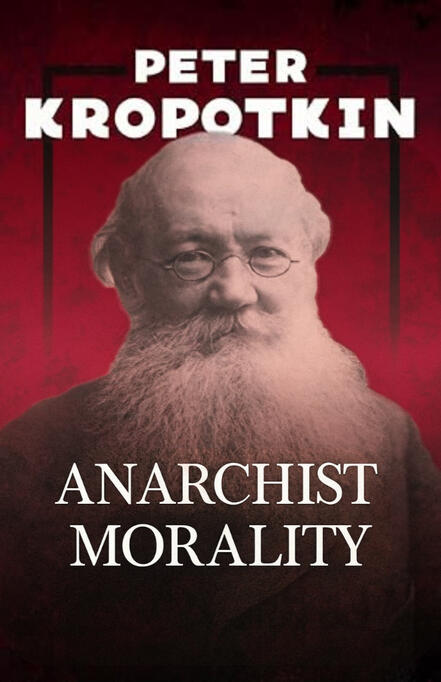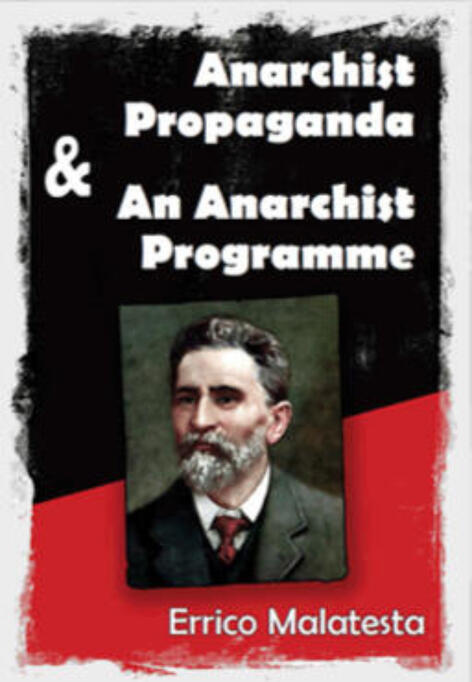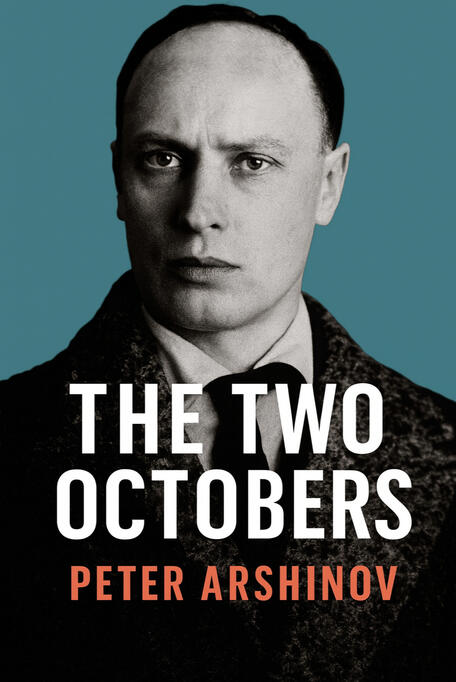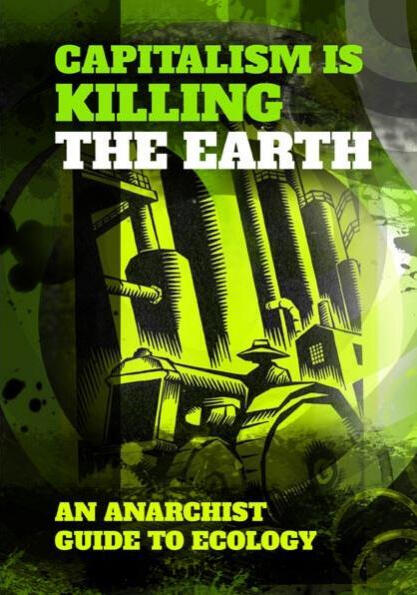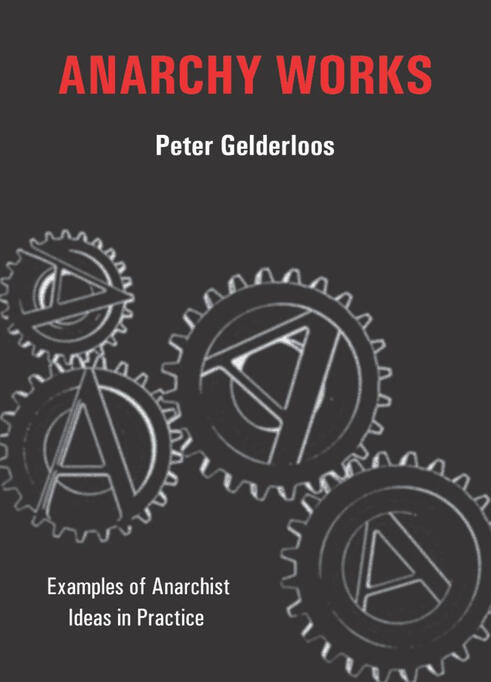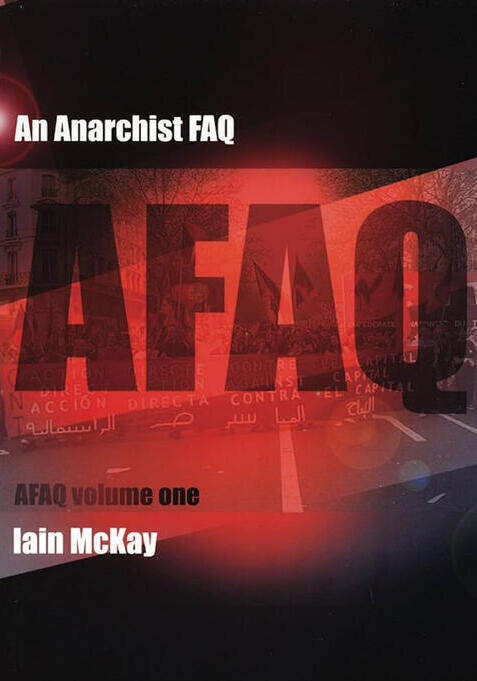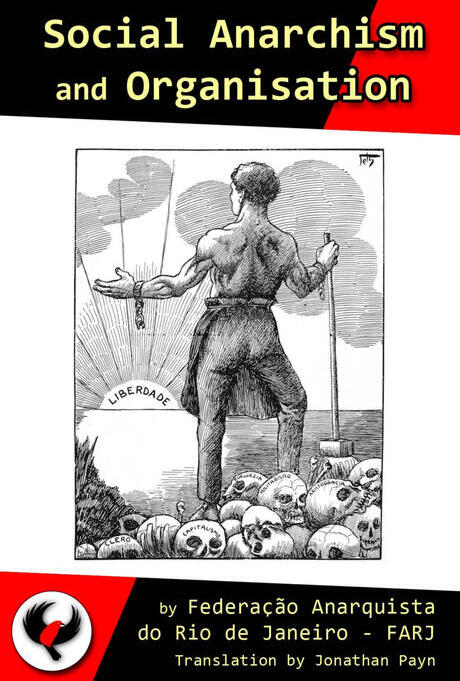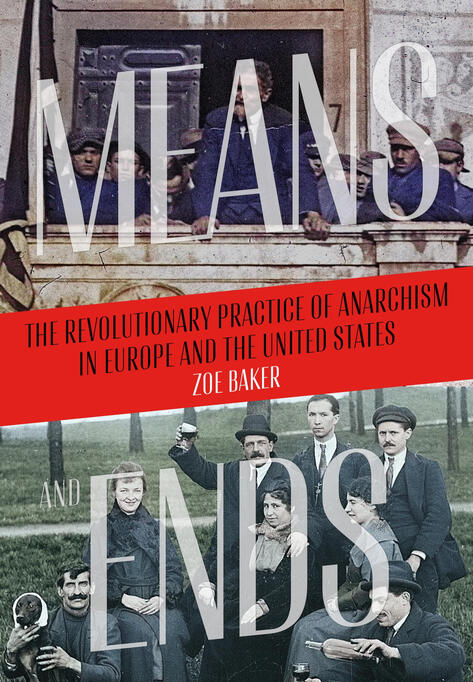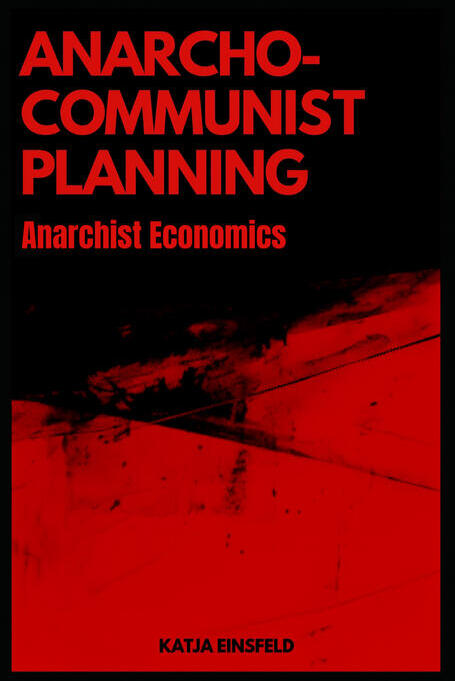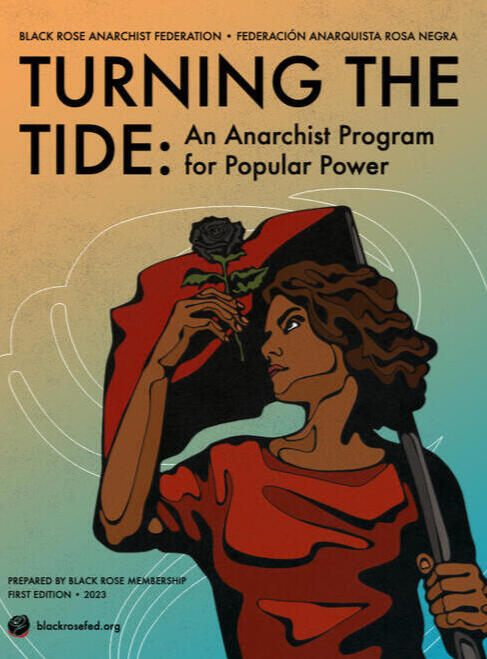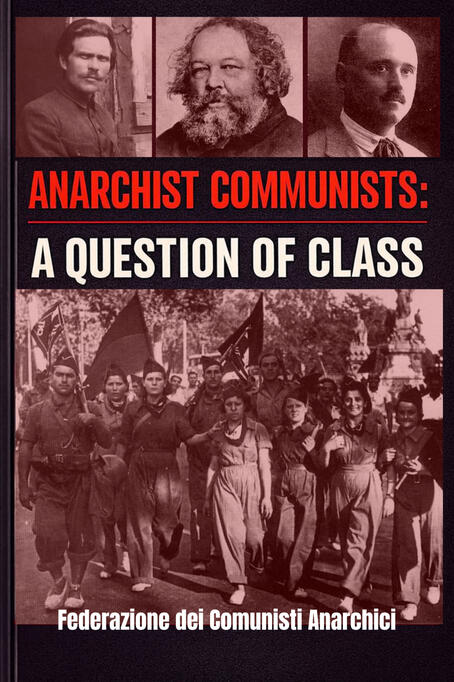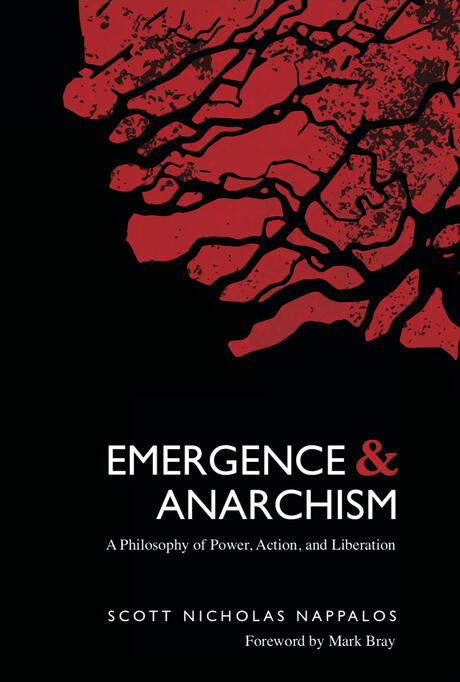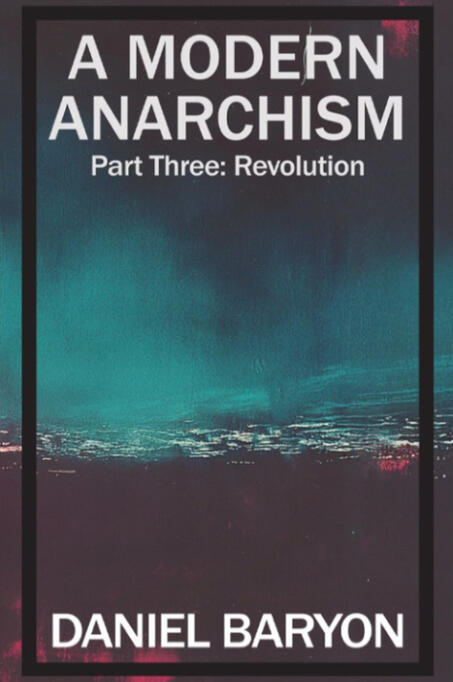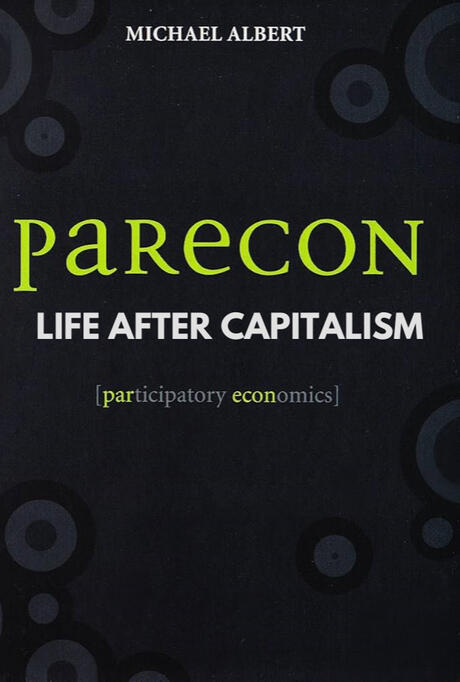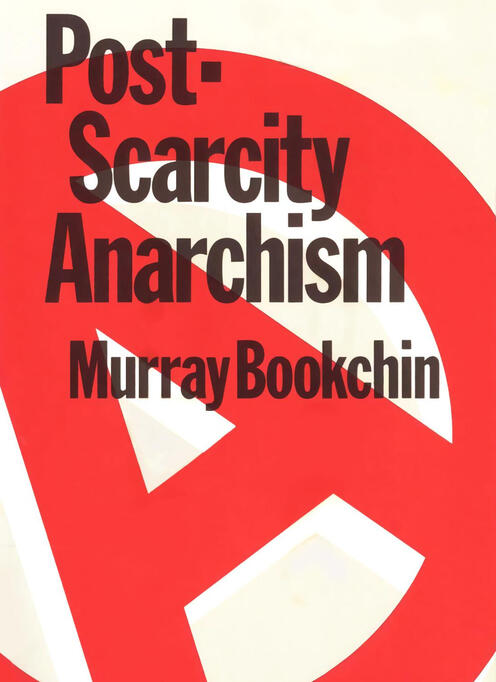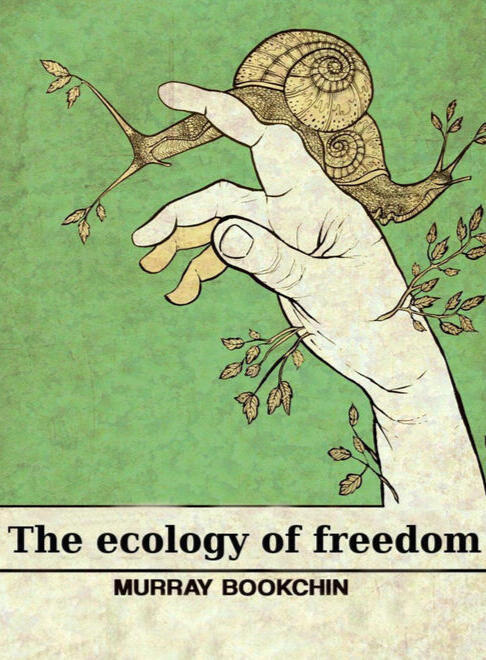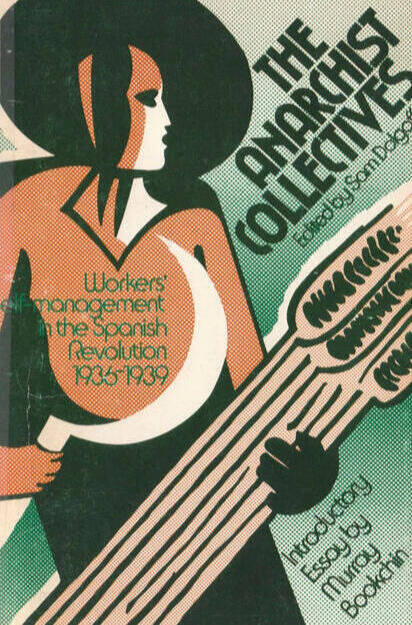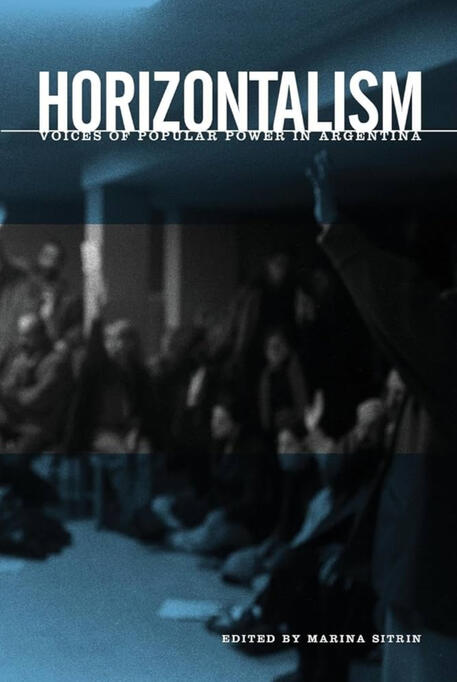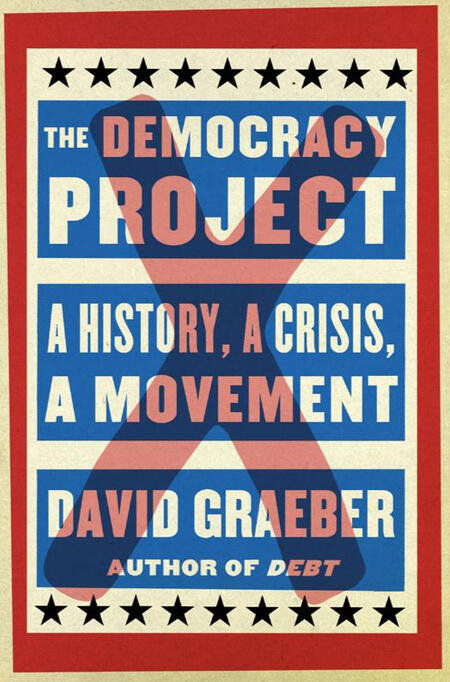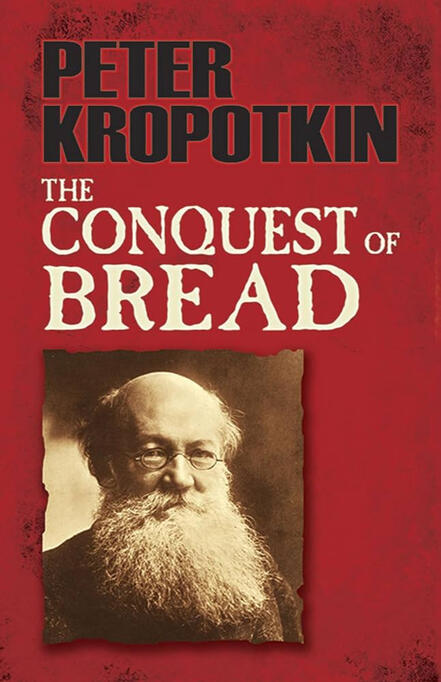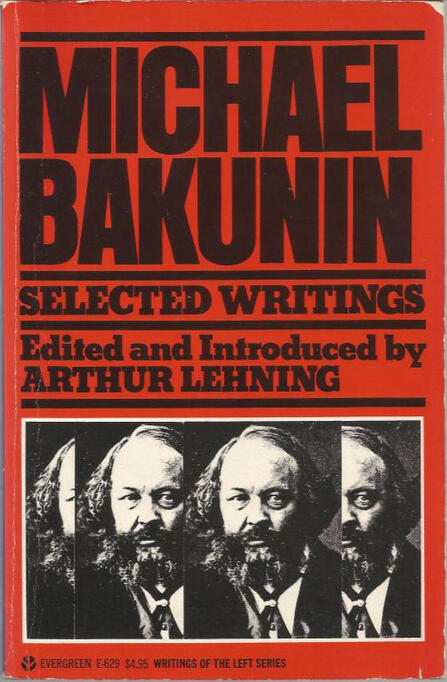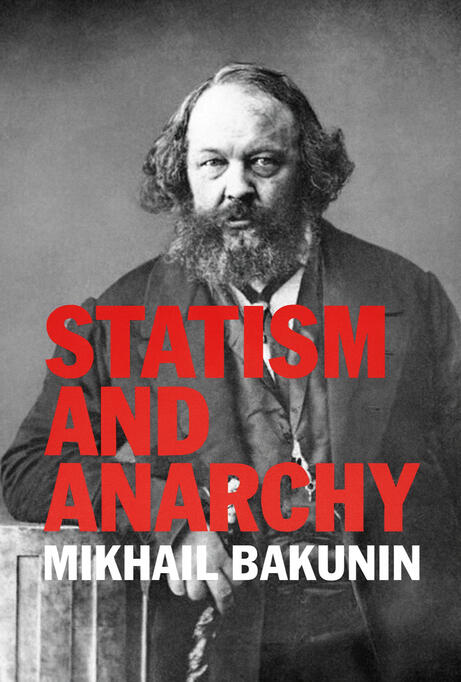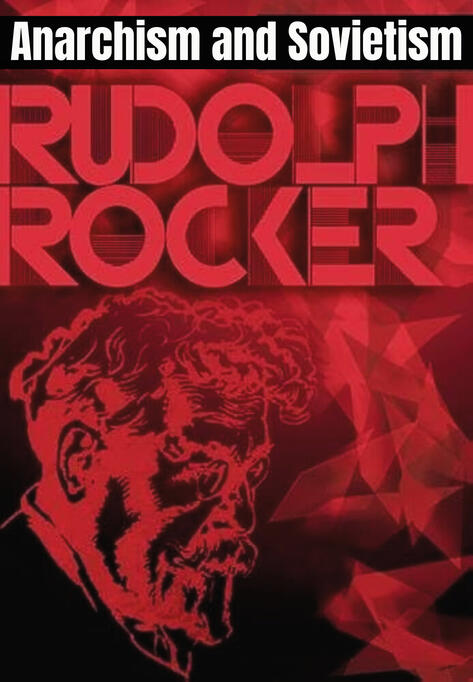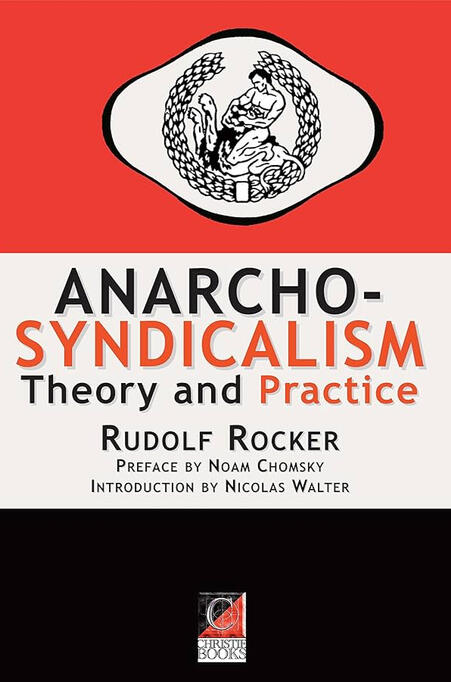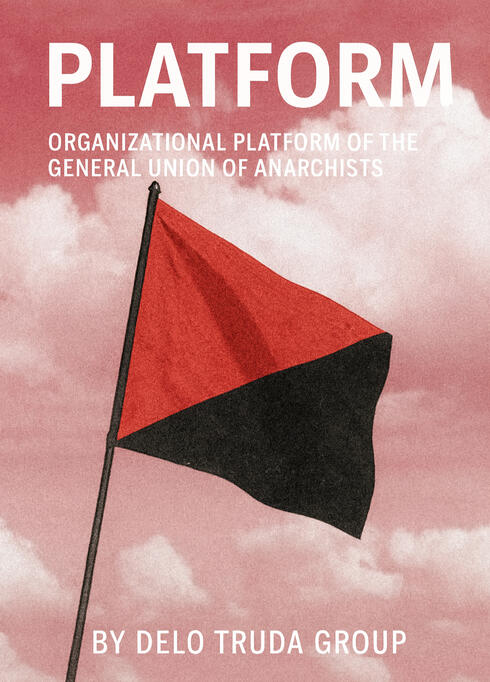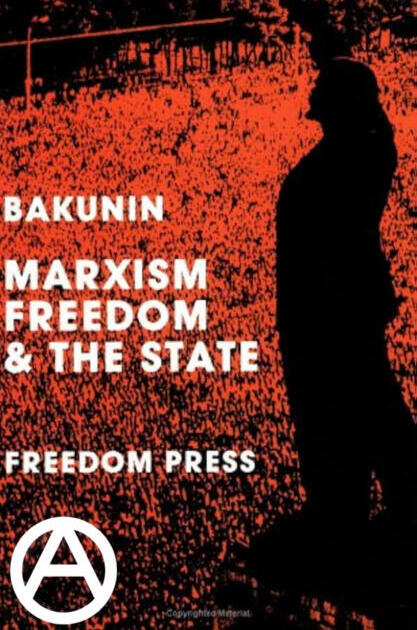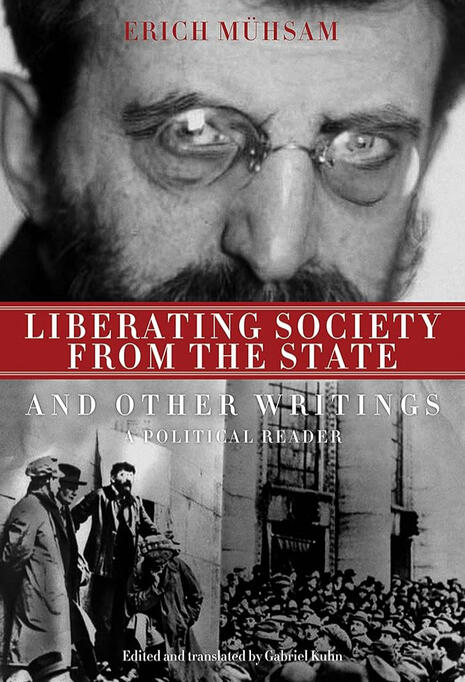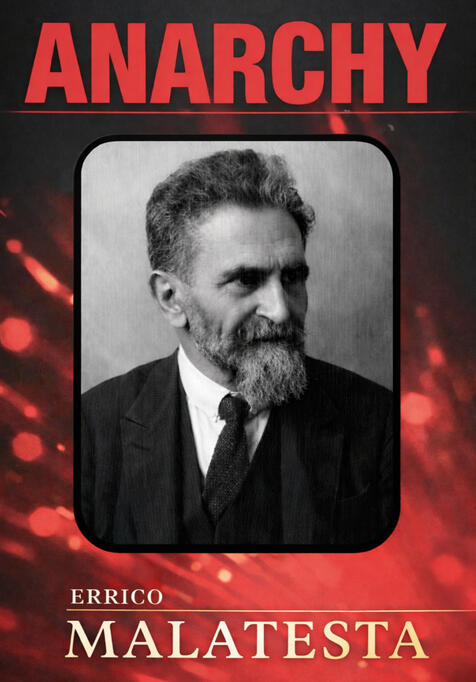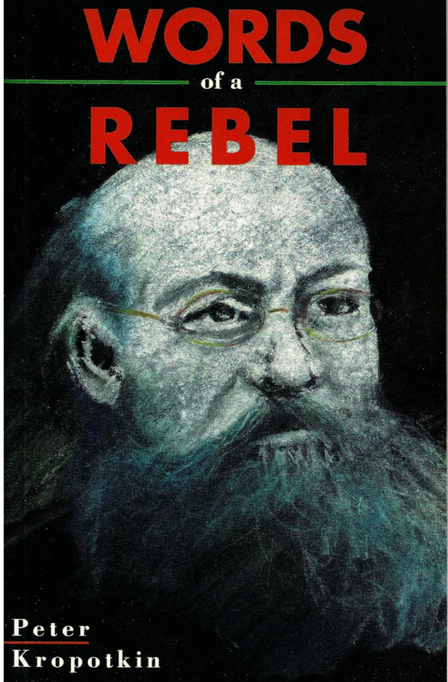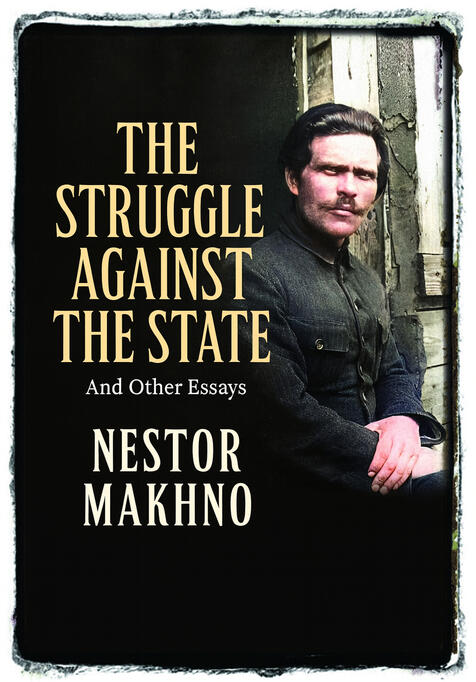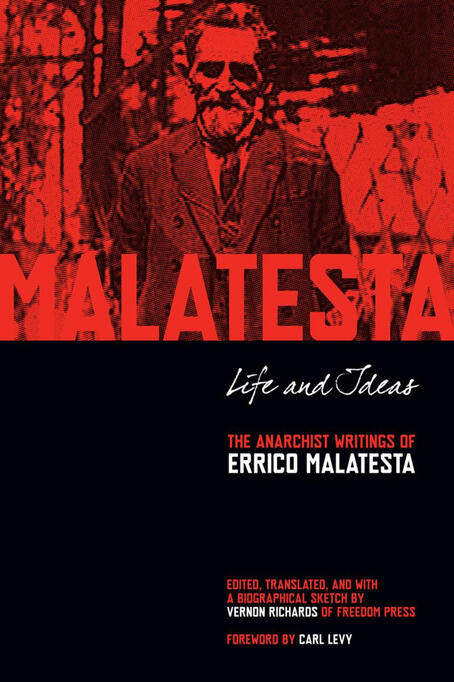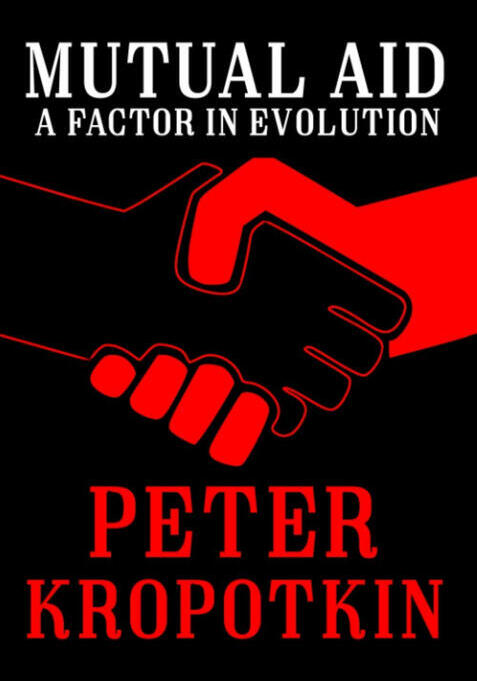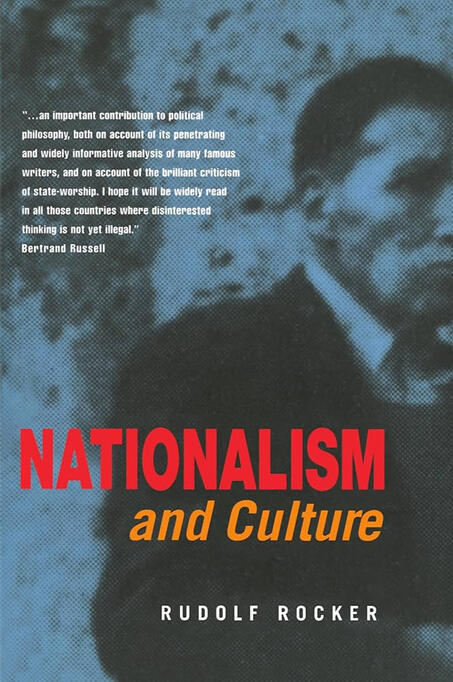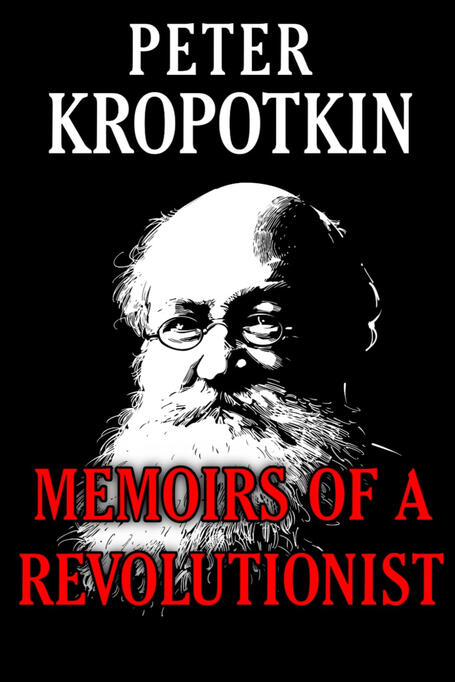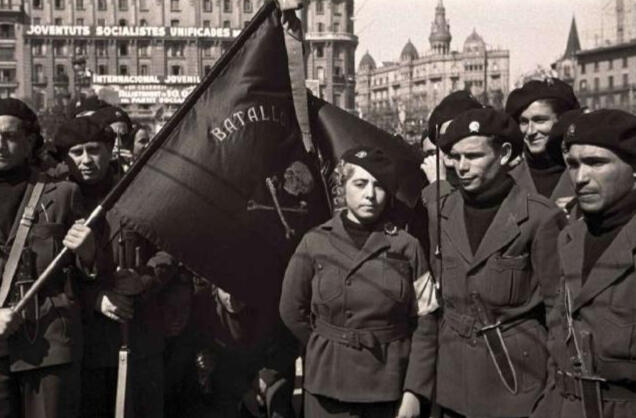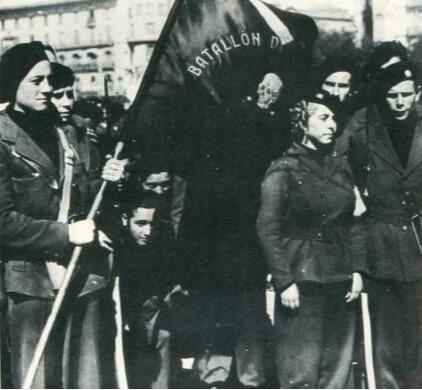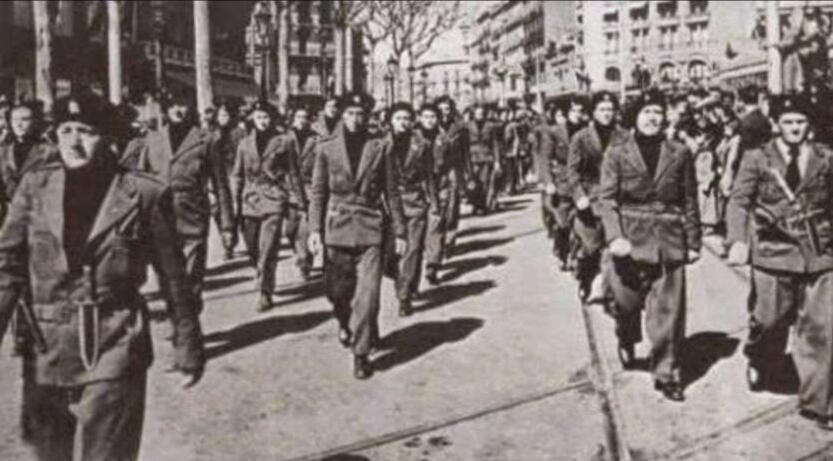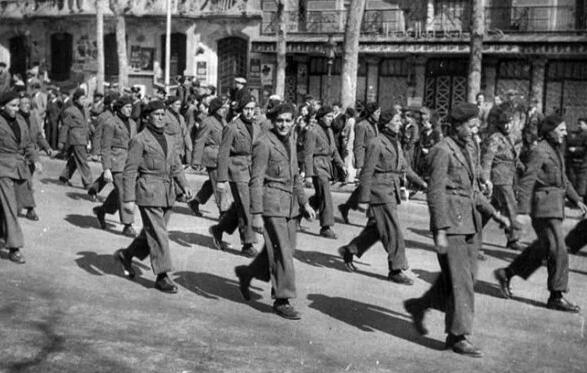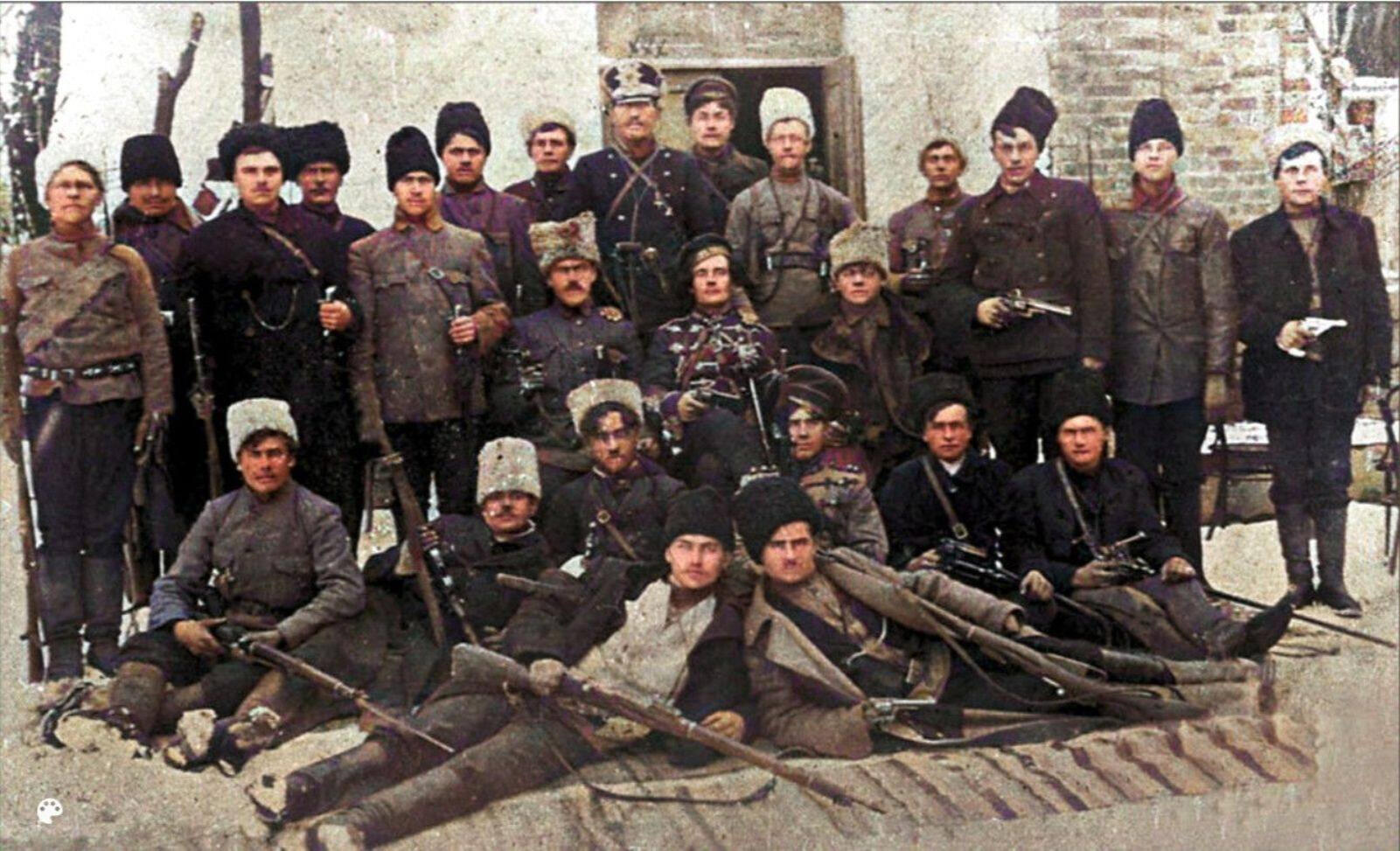Anarchism emerged as the anti-state wing of the socialist movement, which is commonly referred to as libertarian socialism or libertarian communism. Anarchists, without exception, are opposed to all structures of hierarchical domination, including capitalism, the state, white supremacy, heteropatriarchy, imperialism, and settler colonialism. Instead, anarchists strive for a horizontal, stateless, classless, socialist society free from domination, that is grounded in the principles of solidarity, self-management, freedom, federalism, ecological sustainability and mutual aid.Within the anarchist movement are diverse currents of thought and practice that all share these principles while emphasizing different priorities & tactics. Yet anarchists broadly agree that a new society can only be brought into being through social revolutionary action by independent mass movements, which advance dual-power, practice prefigurative politics, and organize workers' strikes.
Foundations - Bullet Points
● Classless Society: Abolition of capitalism and the state, with resources and decision-making collectively managed in a libertarian socialist framework.● Horizontalism: Rejection of hierarchical systems in favor of horizontal(i.e. non-hierarchical), self-managed structures without ruler positions, where power is distributed equally among everyone rather than concentrated at the top.● Means & Ends Unity: Commitment to prefigurative politics, holding that the struggle for a classless self-managed society must be organized through the same horizontal and self-managed means it seeks to establish, rejecting systems that reproduce the very hierarchical power structures they seek to abolish.● Mutual Aid: Reciprocal systems of support ensure universal access to essential goods, resources, and social wealth, managed collectively by communities. This also includes services like healthcare, education, and other vital services for the common benefit.● Council System: Abolition of state top-down structures and establishment of horizontal council-based decision-making systems. Interests are voiced through direct voting by self-managed workers or residents of a region and recallable delegates are chosen to coordinate and communicate council decisions, holding no personal power.● Federalism: Autonomous Communes / Districts / Regions join together with councils at higher and higher levels, using delegation, in order to manage increasingly complex matters, while keeping all power on the base level thus keeping decision-making horizontal.● Freedom & Accountability: Upholding the freedom of individuals to make choices about their own lives, including unrestricted bodily autonomy and self-expression, free from coercion and harm while holding people accountable who infringe on others.
Detailed - Foundations
Capitalist societies, like the feudal and slave-based systems before them, divide people into distinct classes with differing economic positions and social power. Anarchists highlight the power divide between the capitalist class i.e. those who own and control the factories, land, or housing, - and the working class, that is us, who have to sell their labor for a wage in order to make ends meet. Through markets, wages, and coercion, capitalists dictate how time is spent, how work is organized, and even who gets to live with dignity. The working class’s survival is bound to the profits of the capitalist class, giving capital not just economic power but social control over every sphere of life. For anarchists, the solution is clear: class society must be abolished, no matter what it looks like. This would include the abolition of private property i.e, the private ownership of factories, businesses, land etc. which should instead be collectively owned and controlled by the workers themselves. Anarchists seek to abolish capitalism and replace it with a libertarian socialist/communist system rooted in solidarity, self-determination, and collective access to what we need to live and thrive. Only then can we reclaim control over our lives, ensuring that decisions about work, production, and resources serve everyone, not the capitalist class. "Anarchism creates an economic and social basis that fuses the country's economic and social life into a harmonious whole and guarantees every individual parity with everyone else and affords the maximum well-being to all. This basis is common ownership in the form of the socialization of all of the means and instruments of production (industry, transport, land, raw materials, etc.)"The anarchist conception of class incorporates not just the economic relationship but also the relationship to the means of hierarchical administration and coercion (i.e. the state). The state is not a neutral tool, it is a hierarchical institution that, by its very nature, perpetuates class structures, forming its own ruling class. "The state is and can be nothing other than the centralized executor of a class detached from the people, for the subjugation of a people disenfranchised and reduced to a dominated class." - "A whole mechanism of legislation and of policing is developed to subject some classes to the domination of other classes. The state is therefore the perfect example of a hierarchical institution, developed over centuries to subject all individuals and all of their possible groupings to the central will. The State is necessarily hierarchical, authoritarian - or it ceases to be the State." Anarchists seek to abolish the state in favor of horizontal(i.e. non-hierarchical) self-management. "The class struggle created by the enslavement of workers and their aspirations to liberty gave birth, in the oppression, to the idea of anarchism: the idea of the total negation of a social system based on the principles of classes and the State, and its replacement by a free non-statist society of workers under self-management. Anarchism wants to transform the present capitalist society into a society which assures the workers the products of their labours, their liberty, independence, and social and political equality. This other society will be libertarian communism, in which social solidarity and free individuality find their full expression, and in which these two ideas develop in perfect harmony." Anarchists believe a stateless, classless society can only emerge through prefigurative revolutionary practices; by building structures- & organizing in ways that reflect the world we seek to build. This principle, known as "Means and Ends Unity."; insisting that in our struggle & transition toward a free society we use libertarian socialist means, (organizing horizontal and developing structures of collective self-management) rather than adopting the hierarchical structures of state socialism that inevitably reproduce class society. "There can be no separation of the revolutionary process from the revolutionary goal. A society based on self-administration must be achieved by means of self-administration."
Anarchists envision a society grounded in the principle of mutual aid: a system of reciprocal support and cooperation where everyone contributes according to their ability and receives according to their need. Labour and social contributions would be freely and fairly shared among all, just like wealth. Mutual aid is about collaborative exchange, where individuals offer what they can, and everyone has access to what they require. In an anarchist society goods and resources are held in common, and all people share the right to use them freely. "The means of production being the collective work of humanity, the product should be the collective property of the human race. Individual appropriation is neither just nor serviceable. All belongs to all." This vision also includes things like healthcare, education, housing, food, and access to important utilities; essentials that capitalism turns into commodities, forcing us into wage slavery. Under capitalism, we must sell our time and energy to survive, to enrich the capitalist class. Anarchism abolishes the production of commodities for profit and replaces it with production for human need. Decisions about what and how to produce will no longer be driven by the pursuit of individual wealth, but made collectively by all people in the interests of everyone’s well-being. We already do the work that keeps society functioning. We build and maintain everything, yet we don’t control any of it. Capitalism depends on our labour but excludes us from power. In an libertarian socialist/communist system, we take back that control and decide ourselves what work gets done. No more luxury apartments while others sleep outside. No more wasted labour producing junk while real needs go unmet. Instead we engage in necessary work, shared and planned together.Anarchism isn’t a dream where everyone becomes kind, generous, and wise. It doesn’t depend on some ideal human. It will involve average human beings doing average human things: getting tired, making mistakes, being selfish. That’s fine. Anarchism does not require morally perfect humans. The point is to build systems that empowers all of us, one that incentivizes cooperation instead of domination. People are shaped by the systems they live in and capitalism trains us to compete, hoard, and treat each other as threats or obstacles. But people are also capable of care, solidarity, mutual aid and cooperation, capacities that are as natural to us as breathing. Mutual aid is innate to humanity, while capitalism distorts or suppresses these capacities, anarchism builds on them instead. "The mutual-aid tendency in man has so remote an origin, and is so deeply interwoven with all the past evolution of humanity, that it has been maintained by mankind up to the present time" It starts from what already exists, the fact that humans cooperate every day, at work and in life, but under conditions we do not control. Without the profit motive, we depend on one another and build our lives on community interdependence where our collective goal becomes supporting the well-being of all people. "What is important is that a society should be brought into being in which the exploitation and domination of man by man is not possible; in which everybody has free access to the means of life, of development and of work, and that all can participate, as they wish and know how, in the organisation of social life"
Anarchists oppose "liberal democracy" because of its hierarchical and capitalist nature. "It proclaims freedom of speech, of the press, of association... In reality, all these freedoms are of a very relative nature: they are tolerated as long as they do not contradict the interests of the ruling class". It enshrines class structures, granting the capitalist class control over the economy, while wealth functions as political power, shaping policy, representation, the press, and education. Its hierarchical institutions protect politicians from accountability, which in practice makes "liberal democracy" a dictatorship of the ruling class.
In contrast, an anarchist society makes decisions collectively through the "Council System" also referred to as "Free Soviet System."(Soviet meaning workers' council.) The council system is built from the ground up, starting at the base usually commune level and expanding to higher-level councils in a federation. Higher-level councils are merely the direct expression of base-level councils used for coordination, not a central authority. At the base level, people gather in workers' councils & commune councils to make choices on issues that affect them using direct voting i.e. directly discussing and deciding on proposals instead of representatives. Only free and direct participation in decision-making allows for genuine self-management, unlike voting on representatives who wield power over us. "Representative democracy, however, harmonizes marvelously with the capitalist economic system. This new statist system, basing itself on the alleged sovereignty of the so-called will of the people, as supposedly expressed by their alleged representatives...who, while claiming to represent the people, unfailingly exploit them." Through these councils we all can self-manage the communes, organize housing, education, the distribution of goods, or regional projects like environmental conservation, and collectively establish the commune’s guidelines. Instead of a boss, the workers themselves coordinate the distribution of work shifts and tasks, the workplace policies, as well as the assessment and planning of production. Workers’ councils could arise through the organizational frameworks of syndicalist organizations or through autonomous workplace assemblies. Communes/Councils are based on free associations, allowing anyone to join or leave freely, so long as they agree to the collectively established guidelines of the commune/council.
A libertarian socialist/communist framework utilizes decentralized planning to ensure that everyone’s needs are met. Whether for shared infrastructure, fair distribution of goods, or complex production chains, such projects require broad coordination. "In the new system of production, the functions of organization will devolve upon specially-created agencies, purpose-built by the working masses: workers' councils or workers' administrations of factories and plants. These agencies, liaising with one another at the level of municipality, province and then country, will make up the municipal, provincial and thereafter general (federal) institutions for the management and administration of production." When it comes to a complex division of labor, for example the production of a tram, the affected industries in the supply chain could decide to send delegates to a higher-level council in the federation to manage coordination and to find common solutions. Delegates convey the affected council's proposal to a wider assembly, comprised of delegates from various groups within the federation. These delegates, unlike representatives, hold no personal power, they carry out council decision or tasks, following a specific mandate and can be recalled at any time if they act against the will of the base. Mandates, directly voted on, provide guidelines or instructions delegates must follow, keeping them accountable. At a higher level council, delegates sent from the base level engage in discussions to synthesize positions and develop proposals that reflect the will of participating commune/workers councils. The outcomes are then shared back with the base councils along with explanations and any implications for review and amendments through direct voting. If amendments are proposed, they are sent back up the federative structure for consideration. This iterative process ensures that the final decision is as participatory and inclusive as possible. The final ratification always rests with the base level, since in a horizontal federation power belongs collectively to all individuals, not representatives. "We consider the working people capable of building, on their own and without parties, commissars or generals, their own free soviet system, in which those who are elected to the Councils will not command and order us but on the contrary, will be only the executors of the decisions made in our workers' gatherings and conferences" The system works by balancing higher-level councils with the autonomy of lower ones and the direct voting on the base instead of representatives. "The council system when purely applied, creates no sort of bureaucracy, no special claim on the part of individuals, no comprehensive absoluteness of power." Because as an organizational model, the council system is fundamentally federalist. "Only a federalistic social organization, supported by the common interest of all, can free us from the curse of the political machine."
The basics of the federalist council system were first advocated by early anarchist thinkers such as Proudhon and Mikhail Bakunin and were later refined and expanded by a wide range of anarchist theorists. "The forerunners of the council system appreciated well that along with the exploitation of man by man would have to vanish also the domination of man by man. They realised that the state, being the organised power of the ruling classes, cannot be transformed into an instrument for the emancipation of labour. Likewise, it was their view that the primary task of the social revolution has to be the demolition of the old power structure, to remove the possibility of any new form of exploitation and retreat." Councils must operate free from the authority of hierarchical organizations & parties that seek to integrate them into the state apparatus. Councils should exclude political parties as decisions are made through direct voting with independent delegates, not party representatives ruling over us. "The state will be replaced by a federalist system of workers organisations, united federatively and self-managing. This system excludes just as much authoritarian organisations as the dictatorship of a party, whichever it might be." In hierarchical structures where a political party has authority over the councils, they inevitably centralize decision-making and suppress councils, turning them back into state organs. This process could be seen in the USSR, where the Bolsheviks subordinated the soviets(councils) to centralise power within the Bolshevik one-party state, ultimately stripping the soviets of their autonomy and power. "The council system tolerates no dictatorships as it proceeds from totally different assumptions. In it is embodied the will from below, the creative energy of the toiling masses. In dictatorship, however, only lives barren compulsion from above, which will suffer no creative activity and proclaims blind submission as the highest laws for all. The two cannot exist together. In Russia dictatorship proved victorious. Hence there are no more soviets there. All that is left of them is the name and a gruesome caricature of its original meaning." The anarchist conclusion is clear: "Everything for the councils! No power above them!"
Anarchism values self-determination as essential to its ideals, ensuring individuals can act freely as long as their actions impact only themselves and do not infringe on others. In an anarchist society, freedom of self-expression, speech, love, and identity is a fundamental freedom. This freedom allows individuals to live authentically and define their own lives without coercion. This principle of self-determination also means the recognition of abortion as a fundamental freedom, full full recognition of drug ownership, ownership of firearms, the allowance of sports fighting, the recognition of both suicide and assisted suicide etc. though we should implement systems to mitigate potential harm and ensure that choices are informed and non-exploitative. Anarchists do not settle for abstract or hypothetical notions of freedom, but insist on the real positive freedom to act, to create, to be, the freedom of actual and active opportunity to freely develop oneself.
"True liberty... is not the negative thing of being free from something, because with such freedom you may starve to death. Real freedom, true liberty is positive: it is freedom to something; it is the liberty to be, to do; in short, the liberty of actual and active opportunity." As Rudolf Rocker put it: "For the Anarchist, freedom is not an abstract philosophical concept, but the vital concrete possibility for every human being to bring to full development all the powers, capacities and talents." Anarchists do not believe that everyone should be able to "do whatever they like," because some actions invariably involve the denial of the freedom of others. For example, anarchists do not support the "freedom" to harm, exploit, or oppress others. Anarchism supports "freedom for everybody, with the only limit of the equal freedom for others; which does not mean that we recognise, and wish to respect, the 'freedom' to exploit, to oppress, to command, which is oppression and certainly not freedom." When individuals make decisions that affect others, they are held accountable for the outcomes, whether acting as an individual or as part of a decision-making body. One's freedom cannot include to terrorize, violate, attack or harm others. Discrimination on the basis of ability, race, gender, or sexuality reinforces and perpetuates hierarchical power structures. Anarchists understand that we live in relation to others, and true freedom cannot mean diminishing someone else's freedom by harming them. "Freedom for each individual so long as he does not violate the equal freedom of others."So what happens if someone violates another's autonomy, violently infringes on someone, harms or even kills someone? How would a community defend itself against this harm? Since an anarchist society rejects authoritarian & punitive means like the bourgeois justice system and police, the response lies instead in transformative justice, rehabilitation and community defense. Transformative justice is a set of community based practices that address harm by holding people accountable without punishment, repairing the harm done to the individual/community and changing the social conditions that allow harm and injustice to happen. Anarchists aim to address the root causes of harmful behavior by transforming the material and social conditions that create it things like poverty, hierarchy, oppression, inequality, stress, and the systems that continually reproduce them. "It is the result of economic conditions, of social inequality, of wrongs and evils of which government and monopoly are the parents. Government and law can only punish the criminal. They neither cure nor prevent crime. The only real cure for crime is to abolish its causes, and this the government can never do because it is there to preserve those very causes." But we do not believe that this will eliminate all anti-social behavior and as long as someone "violates the equal freedom of others... we must defend ourselves." In situations of immediate danger, anarchist communes may rely on community-defense militias. Unlike police forces, these groups hold no special authority or privileges; they consist of community members who coordinate collectively to provide self-defense and intervene when individuals pose harm to others. "We must reckon with a residue of delinquency which in the meantime will oblige the mass of workers to take defensive action... by making it impossible for anyone to derive personal advantage from the detection of crime, and by leaving defense measures to interested groups, society can reconcile complete freedom with protection against those who threaten it." Punishment has consistently failed to reduce harm, it entrenches oppression and pushes violence underground. Through transformative justice, we envision a system where offenders are held accountable in popular assemblies of the community and those affected, where we work to repair the harm done and move forward through rehabilitation. "Discarding every concept of punishment and revenge, which still dominate penal law, and guided only by the need for self-defense and the desire to rehabilitate."
The anarchist movement emerged in the 19th century from socialist debates within the working class as the anti-state wing of the socialist movement, which is commonly referred to as libertarian socialism or libertarian communism. Its emergence was closely tied to the International Workingmen's Association also known as the First International in the late 1860s, where the split between the state socialists and libertarian socialists arose. While socialist and libertarian ideas predated the 19th century, a concrete formulation of anarchist theory and program first emerged within the anti-state collectivist faction of the First International. This faction founded by Mikhail Bakunin, is considered the first specifically anarchist organization. During this period, several currents of anarchist thought took shape, including Anarcho-Mutualism, Anarcho-Syndicalism, and Anarcho-Communism. All key theorists were also revolutionaries who fought within the workers’ movement. As an ideological current of anarchism, Anarcho-Communism truly solidified in the late 19th century, quickly becoming the most widespread current of anarchism, strongly influenced by Mikhail Bakunin’s work. Peter Kropotkin, renowned for his concept of mutual aid, was also central to its development. It received further influences from revolutionary Marxism, with which it was in lively exchange and debate, both practically and theoretically. The anarchists argued that a stateless, classless, moneyless society can only be achieved through anarchism. Their ideas influenced theorists like Errico Malatesta, Emma Goldman and Erich Mühsam, and more importantly the minds of the revolutionary masses in the two great anarchist revolutions of the 20th century. For example 1918-1921 in Ukraine, where a revolution lead to the creation of an "Independent Anarchist Republic" later referred to as "Makhovshchina". The workers seized the means of production and land was seized from landlords and reorganized into collective or communal holdings. The revolution led to the creation of the "Free Soviet System" anarchist council structures that acted independently from any central authority, excluding all political parties from participation, and met to self-manage the production & activities of workers and peasants. They declared "Long live the free soviet system! - Where there will be neither landlords nor masters!" They established schools, hospitals and education programs. At the same time they expanded civil liberties, freedom of speech, press and association. The anarchist Revolutionary Insurgent Army proved militarily effective, defeating White army columns at Perehonivka, repeatedly breaking Red and White encirclements and seizing large quantities of arms, while remaining a democratized force governed by soldiers and the Regional Congress with elected, recallable commanders. The anarchist republic was ultimately betrayed by the Bolsheviks, as the Bolsheviks sought to further consolidate their own power. In the aftermath, revolutionaries like Nestor Makhno, Peter Arshinov and Ida Mett along the rest of the Delo Truda group refined strategies for revolutionary organization, referred to as "Platformism", learning from the brutal lessons of the conflict and missteps of the anarchist movement. The second example of an anarchist revolution was in Spain and catalonia. Here the anarcho-syndicalist union confederation "Confederación Nacional del Trabajo" (CNT) & anarchist federation "Federación Anarquista Ibérica" (FAI), believed that the social revolution should be carried out through the creation of workers’ councils and workplace collectives. These bodies would seize and manage production under workers’ control. They also argued that workers should establish federations of producers’ associations, to self-manage the larger industry, as well as libertarian communes in each locality to organize housing, education, and other social needs. These communes would then federate together to form the Confederation of Autonomous Libertarian Communes. Later they attempted to put this into practice both in Catalonia & Aragon during the Spanish Revolution (1936-1939), anarchist unions and militias expropriated the capitalist class, established self-managed communes, with around two thousand enterprises collectivized in catalonia alone and directly controlled by workers' committees through a union council system federated together into horizontal planning councils like the Economic Council of Catalonia. The revolution created self-management in all aspects, improved & free education, collective & equal food access, decommodification in multiple areas, free and improved healthcare. "They practised the social ethos 'from each according to their ability, to each according to their needs.' In a good number of collectives money was abolished, individuals being guaranteed a certain proportion of products from the common supply. The Council of Aragon abolished all money within its area, operating on the basis of a Producer's Card and a Consumer's Card." Education also improved and became a central priority for the libertarian movement. Schools throughout anarchist territory came under popular control and were transformed into libertarian institutions. The Spanish Civil War was ultimately lost. Marxist-Leninist parties, bolstered politically and materially by the USSR, denied weapons, marginalized and suppressed anarchists and other revolutionary groups not aligned with the USSR. The collaborationism of the CNT with the republican government lead to the repression of the revolution, the forced dismantling of anarchist institutions in Aragon and fatally undermined popular revolutionary organization and helped precipitate the defeat of the anarchist territory.
In the time after the Spanish Revolution’s defeat, anarchism suffered a massive blow as fascist and authoritarian regimes crushed revolutionary movements as Anarchists were hunted, imprisoned, and executed. The later Red Scare forced many underground or into exile while revolutionary trade unions were co-opted or dismantled. By the 1980s, the movement had shifted towards individualist and insurrectionary tactics, which struggled to build sustained power in the face of rising neo-liberal capitalism. Despite this, anarchists persisted in anti-colonial struggles, labor movements, and anti-fascist organizing, resisting both state repression and authoritarian leftist dominance imposed by the shadow of the USSR. In recent years, anarchism surged back into mainstream after the Occupy movement repopularized anarchist tactics like direct action, mutual aid, and direct voting. Today Anarcho-Communism is the most widespread and influential anarchist current and is represented in countless worldwide anarchist groups and regional federations. These federations often also represent anarchist liberation movements like Anarcha-Feminism or Black Anarchism. Now, more libertarian socialist organizations are emerging worldwide, actively engaging in union organizing, building community councils and fostering cooperative networks. Through this the anarchist movement has been strengthening collective power from the ground up, making solidarity and mutual aid the backbone of our movement. Besides the specific anarchist movement other libertarian socialist projects have emerged, such as the Zapatista Autonomous Municipalities in Mexico, where communities built a bottom-up autonomous-council alternative to state control with recallable delegation etc. based on an anarchist outlook with a heavy focus on indigenous rights called "Neozapatismo." Despite operating under the constant pressure of a hostile state and neoliberal global order, the Zapatistas have achieved remarkable gains in their autonomous region like decommodification, food sovereignty, collective health care, and self-determined education, demonstrating what is possible through sustained, revolutionary anarchist practices. As another example, in the most difficult of conditions of Syria, the Autonomous Administration of North and East Syria(Rojava) based on "Democratic Confederalism" has experimented with radical gender equality initiatives, and decentralized self-management based on grassroots community councils amid the Syrian Civil War. Rojava’s economy operates on a decentralized, collectivist model, with over three-quarters of property owned by workers through local communal planning, workers’ councils, co-operatives, and unions. Co-operatives play a major role in agriculture and are active across construction, manufacturing, and energy sectors, while workers’ councils oversee more than a third of overall production. While facing ongoing conflict and discrepancies in their revolutionary project due to many limitations, these efforts reflect a broader libertarian socialist momentum in Rojava leading toward horizontal and emancipatory structures, from which the anarchist movement itself can draw important lessons. Amidst all of this, the anarchist movement is reemerging as a relevant revolutionary force on the international stage again, offering tangible alternatives to the current crisis of capitalism, state and ecology through building collective power on the grassroots level and opposing fascism at every step.
- in the anarchist movement or development of anarchism
Michail Bakunin
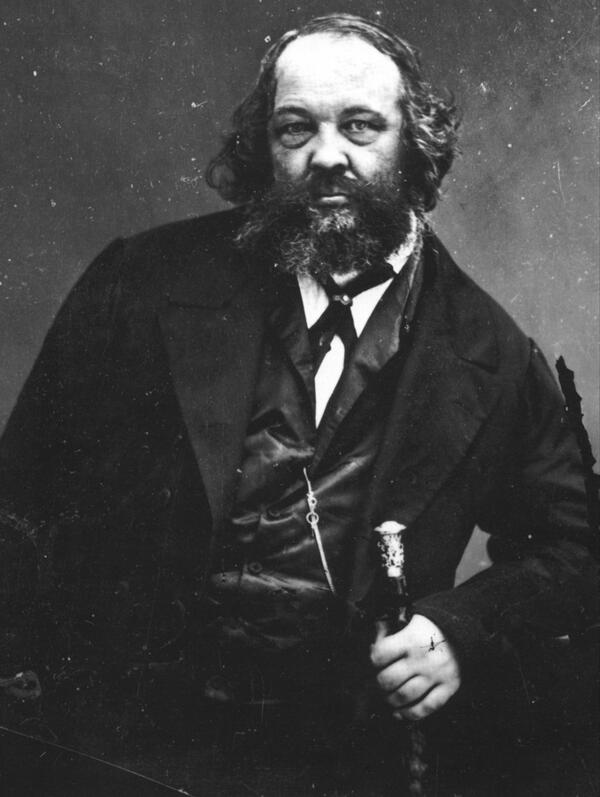
"Liberty without socialism is privilege & injustice; and socialism without liberty is slavery and brutality."
Mikhail Bakunin was one of the most influential revolutionary anarchists of the 19th century. While many of his core ideas remain central to anarchist thought, some of his more reactionary prejudices, common to his era, have since been rejected by the movement. Through his critique of authoritarianism in all forms he played a central role in laying the foundations for what would become the anarchist movement. Bakunin was a central figure in the ideological conflict within the First International. His opposition to Karl Marx’s program of centralized political action, and his advocacy for a federalist, anti-statist approach, culminated in the split of the International between libertarian and statist socialist and thus the formation of a distinct anarchist current in the socialist movement.Bakunin, often regarded as the father of anarchism, heavily influenced the anarchist conception of large-scale self-management, laying the foundations for the federalist council system. He wrote, "The future social organization should be carried out from the bottom up, by the free association or federation of workers, starting with the associations, then going on to the communes, the regions, the nations, and, finally, culminating in a great international and universal federation. It is only then that the true, life-giving social order of liberty and general welfare will come into being, a social order which, far from restricting, will affirm and reconcile the interests of individuals and of society." He also outlined the basic principles of delegation within this horizontal federalism: "There will be provided delegates invested with imperative-, always responsible- and always revocable mandates. The communal council thus organized will be able to choose, from its own members," "The Commune will be organized by the standing federation... by the creation of a Revolutionary Communal Council composed of one or two delegates, vested with plenary but accountable and removable mandates."During the late 1860s and early 1870s, Bakunin became the first to advocate organizational dualism the organizational method that anarchists should both take part in broad, public movements such as trade unions, and also organize in smaller, explicitly anarchist groups to advance a clear revolutionary program. Bakunin also pushed the libertarian socialist movement towards a materialist analysis "Who is right, the idealists or the materialists? The question, once stated in this way, hesitation becomes impossible. Undoubtedly the idealists are wrong and the materialists right.Yes, facts are before ideas; yes, the ideal, as Proudhon said, is but a flower, whose root lies in the material conditions of existence. Yes, the whole history of humanity, intellectual and moral, political and social, is but a reflection of its economic history"As Bakunin was a vocal critic of Karl Marx, he warned that Marx’s "dictatorship of the proletariat" brought about through a state would in practice, create a bureaucratic class dominating the masses. As the earliest theorists of the newly formed anarchist movement he had a great influence on shaping the analysis of "Means and Ends" He believed using the means of the state to transition to a stateless, classes society would be doomed to fail as the socialists who enter the state would constitute a new ruling class. "There will be a new class, a new hierarchy" It might be argued in response that although these representatives would form a minority they would still be workers and so not constitute a distinct political ruling class. Bakunin replied to this argument by insisting that such individuals are "former workers, who, as soon as they become rulers or representatives of the people will cease to be workers and will begin to look upon the whole workers’ world from the heights of the state. They will no longer represent the people but themselves and their own pretensions to govern the people." Written decades before the USSR, where many of these predictions about a state bureaucratic ruling class came to pass.
Peter Kropotkin
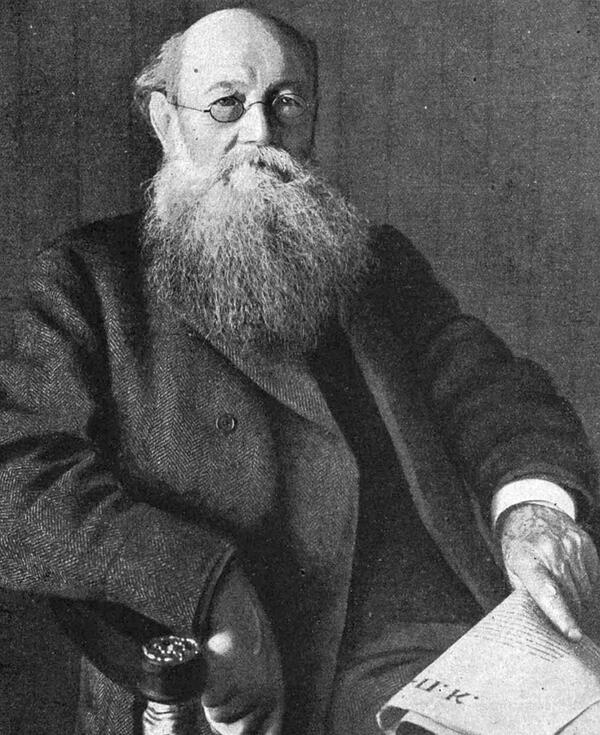
"The means of production being the collective work of humanity, the product should be the collective property – All belongs to all!"
Peter Kropotkin was many things: revolutionary, naturalist, sociologist, theorist. But one thing much more than all this, he was one of the most important anarchists of the 19th and 20th centuries and the central theorist of anarchist communism. As the son of a privileged family, he grew up in the Russian Empire in well-protected circumstances and, after being trained in the page corps, was transferred to Siberia in order to lay the foundation for his natural and sociological research. There he also came into contact with Proudhon's theories of Anarchism who Kropotkin described as "the no-government form of socialism." The consequences of becoming an anarchist meant deciding against a promising career in science and the Russian upper class. He was persecuted, expelled and imprisoned in Russia, Switzerland and France, he fought especially in the Jura as part of the Jura Federation. In England he finally wrote a large part of his works and developed both the theories of mutual aid. "The mutual-aid tendency in man has so remote an origin, and is so deeply interwoven with all the past evolution of the human race, that it has been maintained by mankind up to the present time, notwithstanding all vicissitudes of history." There he also developed his theories on Anarcho-Communism inspired by the works of Proudhon, Bakunin and Marx arguing that "the means of production being the collective work of humanity, the product should be the collective property – All belongs to all!" elaborating that "We do not want to rob any one of his coat, but we wish to give to the workers all those things the lack of which makes them fall an easy prey to the exploiter, and we will do our utmost that none shall lack anything, that not a single man shall be forced to sell the strength of his right arm to obtain a bare subsistence for himself and his children. This is what we mean when we talk of Expropriation; this will be our duty during the Revolution."He advocated for the establishment of free communes "the abolition of individual property and communism; and the abolition of the State, its replacement by the free commune, and the international union of working men." and the self-management of production through workers' councils "The idea of soviets, that is to say, of councils of workers and peasants, – the idea of such councils controlling the economic and political life of the country is a great idea. All the more so, since it necessarily follows that these councils should be composed of all who take a real part in the production of national wealth by their own efforts." He described the clash between Marxist and Bakuninist branches in the first international which lead to the birth of the anarchist movement as "the necessary conflict between the principles of federalism and those of centralization, the free commune and the state’s paternal rule"At the end of his life he returned to Russia in 1917 and was enthusiastic about the developments of the October Revolution. Nonetheless, he was a major critic of the authoritarian policies of the developing Soviet state. He left us not only an extensive theoretical work, but also an unshakable positive view of both our natural prehistory and the possibility of a future solidary and truly humane society!
Nestor Makhno
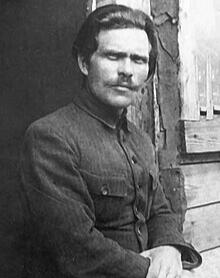
"The social and political visage of anarchism is a free, anti-authoritarian society, one that enshrines freedom, equality and solidarity."
Nestor Makhno was a Ukrainian anarchist-communist, platformist, who became famous for his role in the anarchist revolution in Ukraine during the Russian Civil War. Makhno was born in 1888 in the Ukrainian town of Huliaipole. His family being extremely impoverished, Makhno began work at an early age. While he served stints as a shepherd, a painter, and for wealthy peasants as a farmhand, it wasn't until he began laboring in an iron foundry that he discovered radical politics. Witnessing the abortive 1905 revolution from afar. Inspired by this, Makhno joined an anarchist group in Huliapole, no matter the cost. Arrested in 1908 on a police spy’s testimony, his death sentence was commuted to life. In prison he met anarchist intellectual Peter Arshinov, who shaped his politics. Both were freed in 1917 by the February Revolution. Upon his release, Makhno returned to Huliaipole. During his prison years, Makhno embraced mass organization as the means for revolutionary transformation. In Huliaipole Makhno and the remaining members of the anarchist group set about organizing peasant unions. These unions were eventually transformed into soviets(aka councils) which sought to expropriate land from powerful landlords and kulaks, collectivizing it in the process.He believed "Anarchism is part of human nature, communism its logical extension." Inspired by these anarchist principles, Makhno set out to challenge the emerging Bolshevik power in Ukraine, calling for collectivization and the establishment of a "Free Soviet" council system, seeking to establish a society rooted in self-management and free-association. "The best method to create new collective freedom is the 'Free Soviet.' Proceeding from this conviction, the anarchist revolutionary will call the enslaved to struggle for these free associations." "There will be no bosses... In the new system of production, the functions of organization will devolve upon specially-created agencies, purpose-built by the working masses: workers councils or workplace committees. These agencies, liaising with one another at the level of municipal(base), province(zone) and then country(federal), will make up the municipal, provincial and thereafter general (federal) institutions for the management and administration of production. Appointed by the masses and continually subject to their supervision and control, these bodies are to be constantly renewed, thereby achieving the idea of genuine self-management of the masses. Unified production, in which the means of production and their output belong to all, with wage slavery replaced by the principle of comradely cooperation and equality of rights for all producers an established fact, production overseen by workers' administration bodies elected by the masses."As the Bolsheviks came to power through the October Revolution, a bloody civil war broke out. Tsarist and bourgeois nationalist forces formed the White Army in order to oust the Bolsheviks. In 1918 a Ukrainian anarchist congress was held in which a peasant-worker volunteer militia, the Revolutionary Insurgent Army of Ukraine), was formed in order to both combat the Whites and advance the revolutionary anarchist project. Makhno would serve as its lead military strategist Makhno demonstrated remarkable military and strategic skills during the Russian Civil War. The Black Army's successes in several battles against both the Bolsheviks and the Whites bolstered Makhno's reputation as a capable commander. These military achievements garnered support from those who saw him as a competent commander in the face of external threats. At the time Makhno was revered as a heroic figure and visionary by the members of the anarchist movement in ukraine, who saw him as a symbol of resistance against the oppressive regime. By 1920 the anarchists controlled Ukraine's south east, where they enjoyed success in implementing libertarian-communism. Though the Anarchists and the Bolsheviks initially had a military alliance, this collapsed after the defeat of the White Army and the anarchists refusal to join the Bolshevik sphere of influence. After an extensive anti-anarchist propaganda campaign, the Red Army began a military incursion into the anarchist territory, eventually prevailing. By 1921 Makhno and his supporters were forced into exile, if not arrested or killed.Forced to abandon Ukraine, Makhno moved through western Europe until settling in Paris with his family in 1925. There, he joined other Russian and Ukrainian anarchist exiles to form the Dielo Truda (Workers’ Cause) group, which sought to understand their defeat by the Bolsheviks. This led to the creation of platformism, Makhno's significant contributions to the creation of the platform positioned him as one of its key authors. Their ideas emphasized the importance of "adopting a shared framework, tactical unity, and collective responsibility within anarchist organizations". He strongly encouraged revolutionary discipline "Responsibility and discipline must not frighten the revolutionary. They are the traveling companions of the practice of social anarchism." In 1927, Makhno met with Spanish anarchists Buenaventura Durruti, praising their movement’s organizational strength and pledging support if revolution came. He died in 1934, just before the Spanish Civil War. Today his writings are seen as a valuable framework that encourages organizational discipline, strategic focus, and a shared commitment to anarchist principles.
Lucy Parsons
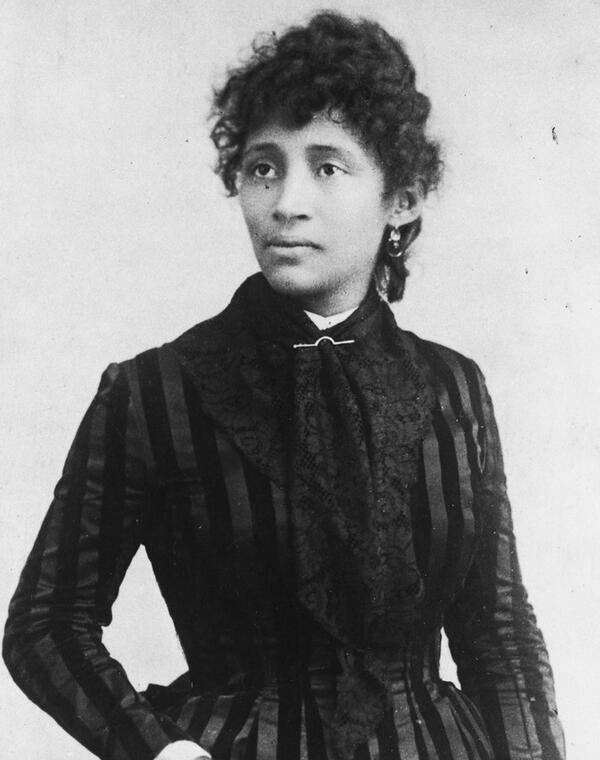
"Never be deceived that the rich will allow you to vote away their wealth."
Lucy Gonzalez Parsons was an anarcho-communist & syndicalist revolutionary, militant labor organizer, black liberation advocate and writer. Few specifics are known about her early life. Born in Virginia in 1851, her mother Charlotte was a slave. In 1863 during the American Civil War, Lucy and her mother were forcibly relocated to Texas. In 1869 she met Albert Parsons, a former Confederate soldier turned radical abolitionist. By 1872 they married and shortly after were forced to flee North to avoid recently enacted anti-miscegenation laws in Texas. Settling in Chicago, Lucy and Albert became enmeshed in radical labor organizations. The couple eventually adopted anarchism as a guiding ideology. In 1886, during the national fight for an eight hour work day, Albert was among those prominent anarchist labor leaders arrested and spuriously blamed for the Haymarket Riot. He was executed in 1887. These events left a lasting mark on Lucy, forever emboldening her.
Over the course of her life she would contribute to countless periodicals, collaborate and speak alongside Peter Kropotkin, participate in the 1905 founding of the Industrial Workers of the World (IWW), and face numerous arrests. She would continue to publicly orate nearly up until her death at ninety-one in 1942.Despite the victory of the recent formation of the IWW, in 1907 Lucy penned a letter to the editor of the anarchist periodical The Demonstrator, lamenting the disorganized state of the anarchist movement but also expressing hope about the move toward formal organization at the Amsterdam Anarchist Congress of the same year. The 1907 Congress gathered movement luminaries like Errico Malatesta, Rudolf Rocker, and Luigi Fabbri, among others. In Lucy's letter she begins by excoriating the open interpretation of anarchism and the failures that have resulted from the lack of formal organizing especially in the USA:
"The Anarchist cause has lacked a plan of procedure or organization. To be sure, there have somehow, here and there, drifted together a few persons who, in a loose way, formed a sort of group, calling themselves Anarchists, but these groups were composed, for the most part, of young, inexperienced people who had about as many conceptions of the real aims of Anarchism as there were members composing the group."
She then goes on to examine the specific results of the lack of formal organization at the time, which was especially a problem in the anarchist movement in the USA: "Consequently, the result has been as might reasonably have been expected. The anarchist cause has lacked concentration of effort, and a vivifying force to lend energy and direction toward a common aim.
The result is that the realization of the anarchistic ideal, grand as it is, is not in the least encouraging when we take a retrospective view of the last twenty. years. Really, what evidence have we of a genuine growth of Anarchism in the last twenty years?"
Parsons was an active public speaker into her late 80s. She died in 1942 at the age of 91 in a house fire in her community living area.
Errico Malatesta
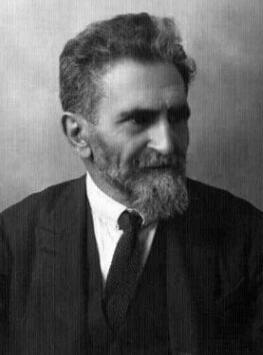
"Anarchism is the abolition of exploitation and oppression of man by man, that is, the abolition of private property and state"
Errico Malatesta was one of the most important anarchist figures of the 19th and 20th centuries and a key figure in the construction of Italian and South American anarchism. During his time in Italy, he built up an anarchist Italian national federation with his comrades from the groups previously organized in the 1st International and took part in numerous uprisings and revolts Italy. Despite the growing size of the federation and the multiple uprisings, the social revolution failed to materialize and a rupture occurred between the parliamentary wing and the social-revolutionary wing.Due to the growing repression of the Italian and the other states, he had to change his place of residence again and again; from Egypt to Switzerland and via Romania to Paris. He was in Argentina, fled to Malta and the USA and lived in London for a long time. Always hounded by state persecution, expulsion and revolutionary work. He also returned to Italy several times and founded, among other things, the anarchist daily newspaper "Umanita Nova" which he publishes (with a circulation of up to 50,000 copies). Furthermore, even in his twilight years, he was an advocate of anarchist principles in debates, such as his consistently internationalist and class-struggle position against anarchist advocates of war in World War I. Despite the bans and surveillance in fascist Italy, he remained one of the most important critics and representatives of the anarchist movement to the end.Malatesta had a part in shaping the "Means & Ends Unity" of anarchism. He believed if revolutionaries make the mistake of using the wrong or inappropriate means then they will produce people who will create a different society to one they initially intended. To quote Malatesta, "It is not enough to desire something; if one really wants it adequate means must be used to secure it. And these means are not arbitrary, but instead cannot but be conditioned by the ends we aspire to and by the circumstances in which the struggle takes place, for if we ignore the choice of means we would achieve other ends, possibly diametrically opposed to those we aspire to, and this would be the obvious and inevitable consequence of our choice of means. Whoever sets out on the highroad and takes a wrong turning does not go where he intends to go but where the road leads him."Malatesta also influenced how anarchists think about crime, violence and how to address it in an anarchist society. He saw crime not as someone who breaks state law, acts out their autonomy or steals to survive but as someone infringing on others freedom. "A criminal is not someone against nature or subject to a metaphysical law but someone who offends their fellow humans by violating the equal freedom of others." He believed in addressing violence/crime by ensuring peoples material and social needs are met "To eliminate all social causes of crime & to seek useful alternatives to crime, these are the steps one must take." And he strongly advocated for rehabilitation "Discarding every concept of punishment and revenge, which still dominate penal law, and guided only by the need for self-defense and the desire to rehabilitate"
Emma Goldman
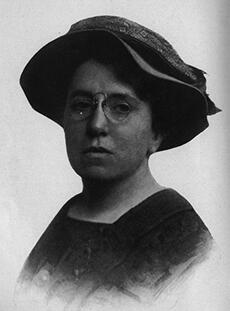
"History tells us that every oppressed class gained true liberation from its masters only through its own effort."
Emma Goldman was a leading anarchist feminist, and peace activist whose life spanned some of the most turbulent social and political struggles of the late 19th and early 20th centuries. Goldman was born to conservative Jewish parents in the Russian Empire and after moving with her family to St.Petersburg in 1882, she was drawn into circles of rebellious students and radical literature. In 1885 Goldman and her sister Helene emigrated to the United States in search of freedom. Instead, she was quickly disillusioned: "Instead of a Tsar, there were hordes of them, and the Cossacks had been replaced by the policeman with his club." The Haymarket Affair of 1886 and the execution of anarchists in Chicago profoundly influenced her. She immersed herself in anarchist and socialist writings, which cemented her identity as an anarchist. After relocating to New York in 1889, Goldman’s oratory talent made her a leading figure in the anarchist movement of the USA. In 1893 she was arrested and became the first woman in the U.S. convicted for a political offense, serving a year in Blackwell’s Island prison for "incitement to riot." Despite harassment from police and frequent arrests, she built a reputation as a fiery speaker and organizer, participating in strikes, anarchist congresses, and workers’ protests across the country. Goldman believed anarchism aimed at the fullest development of the individual alongside freely chosen cooperation. She opposed centralized authority, censorship, religious dogma, and state control, seeing education and agitation as essential tools for liberation. A central theme of her activism was women’s emancipation. She argued that true liberation must begin in girlhood and that marriage and enforced motherhood were institutions that shackled women. Her feminism, however, was inseparable from her anarchism: she heavily criticized liberal feminism, she believed freedom for women must go hand in hand with dismantling of all oppressive institutions. She also argued for the unity of means and ends writing "All human experience teaches that methods and means cannot be separated from the ultimate aim. The means employed become, through individual habit and social practice, part and parcel of the final purpose; they influence it, modify it, and presently the aims and means become identical."In 1916 she was arrested for their antiwar activities, in 1919, after two years in prison, they were deported to Soviet Russia with hundreds of others. Initially hopeful about the Russian Revolution, Goldman and Berkman quickly grew disillusioned with the USSR and Bolshevik repression. By 1920, they had left Russia and eventually settled in Europe, living in Berlin, Paris, and other cities. She continued to lecture, write, and support libertarian education projects, such as the "Modern Schools." Goldman remained deeply engaged with radical politics in exile. She maintained international anarchist connections, wrote about her disillusionment with Russia, and continued to champion feminist causes, particularly women’s freedom to control their own bodies and the concept of "voluntary motherhood." From 1936 to 1939, she threw her energy into supporting anarchists in the Spanish Civil War, traveling, organizing, and advocating abroad. The defeat of the Spanish anarchists was a profound personal blow. In 1940, while on a lecture tour in Toronto, Goldman suffered a collapse and died. Her writings and speeches remain a testament to her fight for personal and collective liberation, ensuring her place as one of the most influential anarchists and feminists of the 20th century
Rudolf Rocker
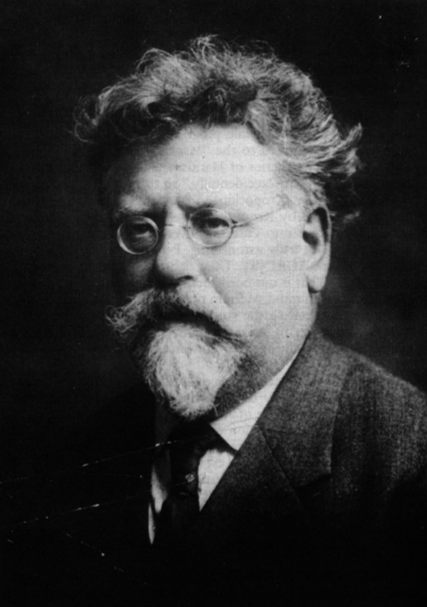
"Socialism will be free, or it will not be at all."
Rudolf Rocker was an influential Anarcho-Syndicalist writer and activist. He was born on March 25, 1873 in Mainz. After the early death of his parents, he grew up in an orphanage, attended elementary school, and later trained as a bookbinder. As a member of the bookbinders trade association, Rocker became familiar with the writings of Johann Most and Michael Bakunin. Leading a social-democratic reading circle for young workers in Mainz brought him into conflict with the increasingly authoritarian SPD(Social Democratic Party). Rocker joined the opposition group and was expelled from the SPD because of his criticism.In 1892, Rocker fled to France because of his illegal propaganda work and became active in a group of independent socialists. From 1895, he lived in London, where, as a non-Jewish immigrant, he played a major role in the Jewish workers’ movement and became editor of several Yiddish-language newspapers. During this period, he also met Peter Kropotkin who's work he was heavily inspired by. In regards of organization Rocker considerd himself a syndicalist anarchist and promoted and wrote about the history of the federalist council system "It is beyond question that the council idea arises naturally out of a libertarian socialist vision which has so taken root in a large part of the international labour movement. as opposed to the state idea with its wake of bourgeois ideological traditions" - "Only a federalistic social organization, supported by the common interest of all, can free us from the curse of the political machine." Rockers theoretical works on Anarcho-Syndicalism and his critique of bolshevik suppression of workers' councils made him a prominent anarchist figure. "The idea of the council system is intimately intergrown with Socialism and is unthinkable without it; dictatorship, however, has nothing whatever in common with Socialism, and at best can only lead to the most barren of state capitalism." He proclaimed "The council system tolerates no dictatorships as it proceeds from totally different assumptions. In it is embodied the will from below, the creative energy of the toiling masses. In dictatorship, however, only lives barren compulsion from above, which will suffer no creative activity and proclaims blind submission as the highest laws for all. The two cannot exist together. In Russia dictatorship proved victorious. Hence there are no more soviets there. All that is left of them is the name and a gruesome caricature of its original meaning."In November 1918, he returned to Germany and joined the Free Association of German Trade Unions, a localist union organization opposing the big centralized unions. When the Free Association renamed itself the Free Workers’ Union of Germany at the 12th Syndicalist Congress in December 1919, Rocker had played a key role in drafting its new program. He was also a leading figure in the founding of the International Workers’ Association in 1922, a global syndicalist organization. Until he was forced into exile by fascism, Rocker tirelessly worked as an organizer and theorist for a libertarian (anti-authoritarian) form of socialism in Germany. He died in 1958 in Crompond, USA.
Erich Mühsam
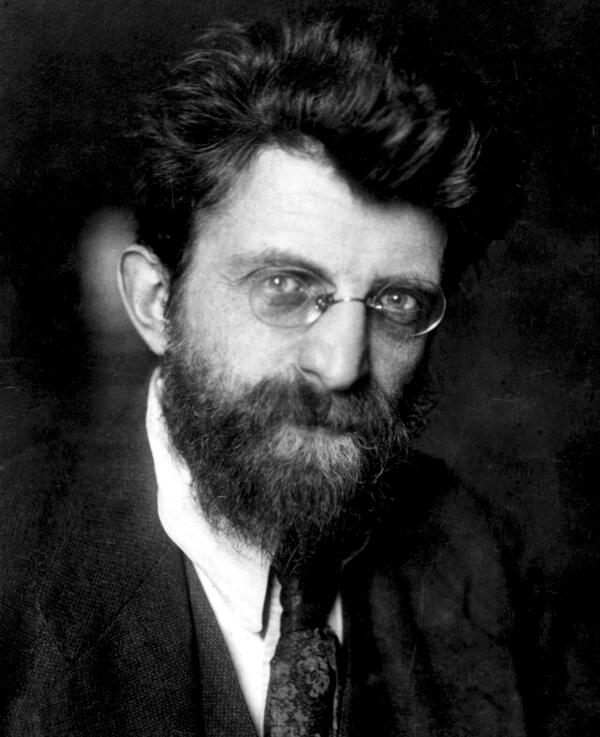
"Anarchism rejects the distinction between society and individual. It regards society as the sum of individual persons and the individual as an insoluble part of society."
Erich Mühsam was a jewish german anarchist essayist, poet, and playwright. He was known for his radical political activism and literary works. He became involved in socialist and anarchist circles early on, influenced by the ideals of Kropotkin and Bakunin. "The freedom of anarchy is the free confederation of free people in a free society." He moved to Munich, where he was advocating for workers' rights, anti-militarism, and direct action. He strongly advocated for the council system (i.e. workers' councils) and also used the term Council Republic to describe Proudhon's federalism & the council system "A council society, a council republic - this word republic in no way automatically designates a form of state, rather the self-administration of a commonwealth by the people - a council economy is only conceivable as a federative construct and can never be a state or find a place within the whole of a state. The council republic is created from the bottom up. Its actual center of motion is the local urban and rural councils. According to circumstance and necessity, they can in occasional or regularly scheduled meetings of residents take note of, discuss, criticize, and expand upon the activities of the industrial or regional councils, making them the foundation of their own decisions. They can set up committees for specific purposes which might deal with specialized questions and independently under general vigilant supervision entrust individual persons with the carrying out of contracted duties."Mühsam was also contributing to and editing several anarchist journals. These writings made Mühsam the target of constant police surveillance and arrests as he was considered among the most dangerous anarchist agitators in Germany. The press seized the opportunity to portray him as a villain accused of anarchist conspiracies and petty crimes. As a special issue of his journal Fanal, which he made available to the "Anarchistischen Vereinigung" Mühsam published "Liberating Society from the State." Mühsam played a key role in the Bavarian Council Republic as a vocal figure of the "Anarchistischen Vereinigung"(Anarchist Union). When the revolution was crushed by right-wing paramilitary forces and their collaborators, Mühsam was arrested and sentenced to prison, where he continued to write. Shortly after the Reichstag fire he was brought to a concentration camp and killed by the Nazis in prison, becoming a martyr for the anarchist movement.
Murray Bookchin
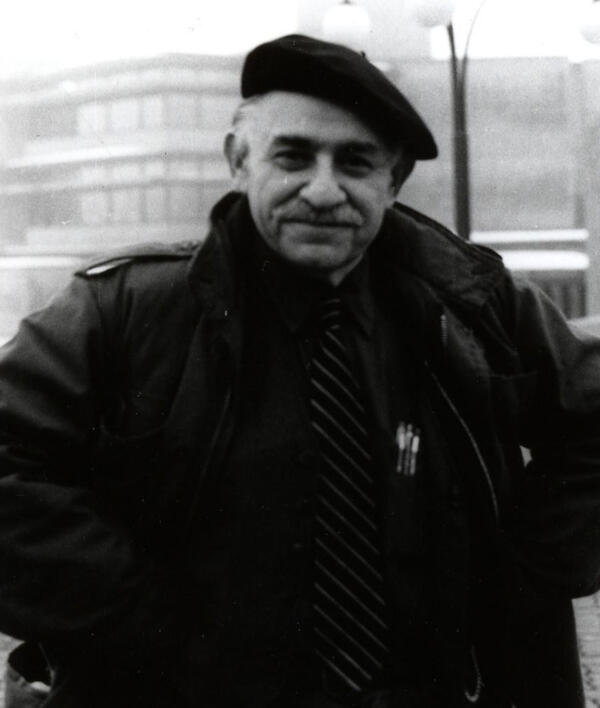
"As long as hierarchy persists, as long as domination organises humanity around a system of elites, the project of dominating nature will continue to exist and inevitably lead our planet to ecological extinction."
Murray Bookchin was a prominent figure in the late 20th-century libertarian socialist movement, known for his influential contributions of social ecology and his conception of libertarian municipalism. His works influenced the analysis of ecology in the anarchist movement and environmental activism in general. His journey began in the Communist Party, but he became disenchanted with its hierarchical structure and failure to address ecological concerns. "Power to the people' can only be put into practice when the power exercised by social elites is dissolved into the people. Each individual can then take control of his daily life. If 'Power to the people' means nothing more than power to the 'leaders' of the people, then the people remain an undifferentiated, manipulatable mass, as powerless after the revolution as they were before." This led him to develop social ecology, a theory highlighting the interconnectedness of social and ecological issues. At the core of Bookchin's thought was the concept of hierarchy and domination as the root causes of social and environmental injustice. He argued that dismantling all forms of hierarchy was essential for a truly free and egalitarian society, including economic, political, and social systems. Bookchin acknowledged Marx's correctness in analyzing class but criticized him for not taking the analysis far enough to address the broader web of hierarchical structures of domination in society that went beyond class. And advocated for the analysis of "Means & Ends" writing "There can be no separation of the revolutionary process from the revolutionary goal. A society based on self-administration must be achieved by means of self-administration."Bookchin often advocated for directly democratic grassroots assemblies in local communities with a confederation ensuring cooperation and solidarity while maintaining regional self-determination. Bookchin strongly criticized individualist/egoist anarchism for its embrace of "lifestylism" leading him to distance himself from the larger movement. As an ardent environmentalist he emphasized the need for ecological balance and promoted sustainable practices in harmony with nature, including agriculture. His writings like "The Ecology of Freedom" and "Post-Scarcity Anarchism" revived interest in anarchism, inspiring a new generation of activists. Bookchin's ideas continue to inspire movements focused on social justice, environmentalism, and grassroots democracy.
David Graeber
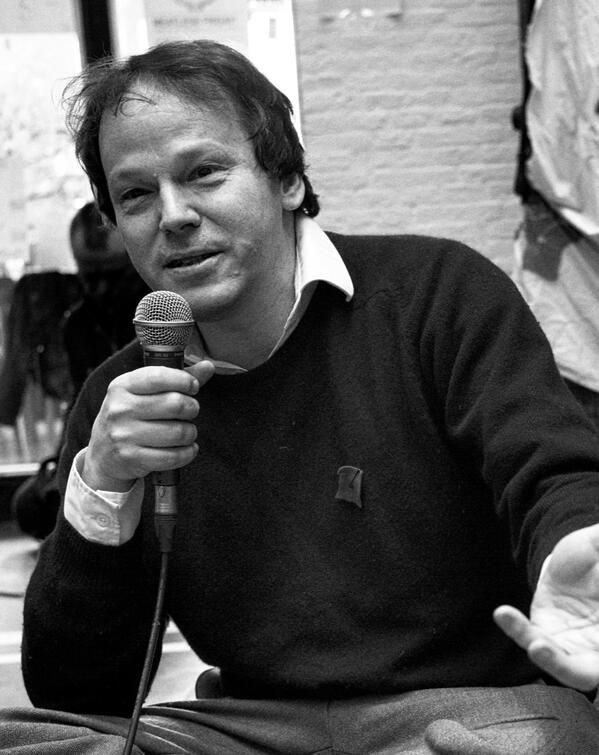
David Graeber was a modern influential anthropologist, anarchist theorist and activist whose work reshaped modern understandings of value, debt, and human cooperation. Known for explaining anarchist ideas in a straightforward, accessible way, Graeber was an important anarchist figure in the contemporary anarchist movement and one of the most visible organizers of the "Occupy movement", which brought back anarchism into the mainstream and repopularized anarchist tactics. He especially advocated for horizontal direct-democracy in the form of consensus. "Anarchism is democracy without the government. Most people love democracy and most people don't like the government very much. Keep one, take away the other, that's anarchism." He challenge conventional economic and political assumptions, through his anthropological lens revealing how social relations, not markets or states, form the foundation of human life.Graeber’s work, "Debt: The First 5000 Years", published in 2011, dismantled the barter myth, examined the origins of money and debt, arguing that debt is not simply an economic instrument but a moral and political construct used to justify systems of domination. "If history shows anything, it is that there’s no better way to justify relations founded on violence, to make such relations seem moral, than by reframing them in the language of debt." His critique extended to the modern nation-state & capitalism, where he identified the proliferation of meaningless busywork and a incoherent bureaucratic systems. In "Bullshit Jobs: A Theory", Graeber observed that entire sectors of the modern economy are structured around sustaining the illusion of necessity, writing that "We have become a civilization based on work, not even ´productive work´ but work as an end and meaning in itself."Throughout his work, Graeber consistently emphasized the possibilities of direct democracy, mutual aid, and horizontal organization while drawing on ethnographic studies, he gives examples of stateless, cooperative societies that had long existed on many different scales and that human beings are naturally inclined toward mutual aid and cooperation rather than competition. He advocated for means & ends unity writing "one’s means must be consonant with one’s ends; one cannot create freedom through authoritarian means" and engaged with prefigurative politics "Prefiguration is the idea that one is 'building a new society in the shell of the old', as the Wobblies used to put it. Rather than just overthrowing the current regime, figuring something new will somehow just spontaneously emerge afterwards, you try to make the form of your resistance a model for what the society you are trying to create might actually be like. This also means you can’t put off, say, question of women’s rights, 'till after the revolution,' you have to address those things right now. Obviously, what you come up with will never be an exact model of a future free society, but at the very least it’s a social order that could exist outside coercive or oppressive structures." Both his activism and theoretical contributions heavily shaped the contemporary anarchist movement.
This is obviously just a short list of a few notable examples of the incredible number of theorists and revolutionaries that contributed to anarchism.
Not all currents of anarchist thought are mutually exclusive, but differentiate in tactics and organizational methods or have different priorities and some focus on issues that might otherwise be overlooked.
Anarcho-Communism, also known as "Libertarian Communism" & "Anarchist Communism" is one of the most widespread and influential forms of anarchism. Its principles and practices have significantly shaped and influenced all other anarchist currents, serving as a foundational framework for various movements and theories within the broader anarchist movement.
It asserts that the only way to achieve a communist (i.e. stateless, classless, post-capitalist) society is through an anarchist analysis and the use of anarchist tactics. It holds that centralized power is inherently counter-revolutionary and that a horizontal, decentralized structure is essential for genuine transformation towards communism.
It rejects markets as oppressive and advocates for a libertarian communist system utilizing decentralized planning and distribution methods.
Anarcho-Communism places high importance on class struggle, viewing class structures as a primary source of hierarchical oppression thus emphasizing the abolition of class society.
Emphasizes collective action as the driving force for revolutionary change. Rather than relying on individual or isolated efforts, Anarcho-Communists believe that social transformation can only be achieved through the united efforts of the working class and oppressed groups.
Different organizational tactics often take form as Syndicalism or Platformism.
A introduction can be found in "Anarchist Communism: Its Basis and Principles", its extremely important foundations can be found in "The Conquest of Bread." An overview of its structures can be found in "Anarchism and Sovietism" and its economics modern & historical can be found in "Anarcho-Communist Planning".
Anarcho-Syndicalism is based on the framework of Anarcho-Communism and is an organizational strategy to achieve it by emphasizing union struggle and worker self-organization and improving the living conditions of the working class in capitalism as steps on the way towards the major system change as a method to keep the masses engaged in class struggle by fighting for these small victories.
Anarcho-syndicalists usually form their own trade union federations, which are independent of the social democratic and reformist trade unions.
The transformation concept of the Anarcho-Syndicalis, envisions the workers unions taking over the administration of the coming society organized through the council system.
The most common tactics employed by anarcho-syndicalists include strike action like wildcat strike & general strikes, sabotage, boycotts, and workplace occupations, all aimed at disrupting capitalist systems and empowering workers to take collective control of production.
On the path to anarchy, anarcho-syndicalism seeks to collectivize as many workplaces as possible, aiming to make worker self-management without bosses a tangible experience in the present while building dual power for the workers movement.
A comprehensive introduction to Anarcho-Syndicalism can be found in "Fighting for ourselves: Anarcho-Syndicalism and the Class Struggle" & "Anarcho-syndicalism: Theory and Practice" by Rudolf Rocker
Platformism is a Anarchist organizational strategy that emphasizes the usage of an explicit anarchist organization, often referred to as "General Union of Anarchists," "Anarchist Party" or "Platform" that rejects individualist cells or statist vanguards. Explicitly rejecting individualistic currents and consciously distinguishes itself from Bolshevism.
Platformist groups aim to struggle against the state and to advance radicalization, prefiguration, coordination, revolutionary organization and dual power depending on what tactics the group agrees on. Unlike the vanguard model of authoritarians, a Platform is horizontal& power is never centralized among a few leaders but shared equally among members, i.e. the groups Committees work through recallable delegation instead of representation. The group doesn't rule over communities or enforces decision in their councils but instead acts as a cooperator in coordination and confidant, not a superior, the group works alongside the oppressed rather than above them.
This Platform should have Unity of Ideology (anarcho-communist), Tactical Unity with Collective Action, Collective Responsibility, Federalism, and have a high degree of formal basis in organizing.
Unity of Ideology does not mean that everyone has to always agree, instead it means that all members should agree to uphold the group's collectively established political framework (Anarcho-Communism). Tactical Unity emphasizes the strength of collective action by agreeing on shared tactics and working together to ensure their successful implementation, rather than acting as isolated individuals. Collective Responsibility means there is no chairman or executive but every member is accountable for the organization's success, actively participate in the decision-making, and upholding the collective decisions. The Platform as a whole is answerable for the revolutionary and political activity of each member of the Platform; likewise, each of its members is answerable for the revolutionary and political activity of the Platform as a whole. Federalism means the group should not be centralized i.e. both individuals and regional groups should possess a high level of autonomy. Regional groups have the freedom to act according to their own circumstances but are all part of a shared tactical line and votes in the general congress should be binding on all groups part of the Platform. This balance allows for both flexibility and unity within the movement, ensuring that different regions can respond to their own needs while still working toward common goals.
The original conception can be found in "Organizational Platform of the General Union of Anarchists by Dielo Trouda" and a more modernized text summarizing the original text and all the extra pamphlets later added to clarify on the original text can be found in "Platformism in action by Organise!" A text about platformism in practice across the world can be found in "The Global Influence of Platformism."
Advocates for the establishment of a "Specific Anarchist Organisation" with Unity of Theory & Tactics similar to the organizational principles of Platformism and is typically viewed as a theoretical extension or development of Platformism.
Aims to spur radicalization, prefiguration and advance revolutionary organization and dual power and is heavily focused on pushing anarchist politics in pre-existing social movements. This is the process of "social insertion" which emphasizes active involvement of the catalyst group aka. "Specific Anarchist Organisation" in autonomous and broad social movements, aiming to influence these movements in an anarchist direction without co-opting or coercing them, while supporting their self-organization and militant fight for their own interests.
"Social insertion" is also supposed to combat counter-revolutionary forces like liberalism, opportunism, vanguardism, and electoral politics, in these movement, ensuring they remain focused on their revolutionary goals.
While Especifismo and Platformism are not identical, differing in certain technical details and terminology, they largely overlap in both theory and practice. As a result, many contemporary platformist organizations also consider themselves as especifist, and vice versa.
More on Especifismo and its connection to Platformism can be found in "Social Anarchism and Organisation"
A modern example of Platformism and Especifismo can be found with ICOA(International Coordination of Organized Anarchism) which is made up of a collection of Especifist & Platformist orgs. across the world.
Eco-anarchism, also known as "Green Anarchism" emphasizes ecology and environmental issues grounded in an anarchist analysis, connecting environmental issues with the larger anarchist struggle.
Eco-anarchism varies based on ecological philosophy but is fundamentally rooted in anarchist principles recognizing that the root cause of environmental degradation lies in hierarchical systems and/or social hierarchies. Most eco-anarchists are also communist-anarchists.
Challenges the dominant culture of consumerism and overconsumption rooted in capitalism.
Strong presence in Degrowth-movements since it questions the growth-based economic system and advocates for simpler, more sustainable lifestyles that prioritize well-being over material accumulation.
A good overview piece is "The Ecological Challenge: Three Revolutions are Necessary." by Alternative Libertaire. Another overview piece to an anarchist ecology can be found in "Capitalism is Killing the Earth" by the Anarchist Federation.
A popular conception of Social Ecology in the movement comes from Murray Bookchin and can be found in "The Ecology of Freedom."
Anarcho-Mutualism advocates for a society based on voluntary, reciprocal exchange without hierarchical coercion and is open to any form of mutual exchange including market mechanisms.
Believes that for voluntary exchange in a market-like system the socialist worker ownership of the means of production is necessary.
Mutualist economics emphasizes mutual access to essential goods, credit co-operatives and non-capitalist markets.
Similar to Anarcho-Communism believes that not just the means of production but land in general should not be a commodity to be bought and sold, but promotes the concept of "Occupancy and Use" by advocating that individuals only have legitimate ownership over property, including means of production and homes as long as they actively use them / work in them, actively abolishing absentee ownership.
Closely aligned with "market socialism" but commerce in mutualism would be entirely fluid, they often encourage mutual credit systems, vouchers and peer-to-peer barter or even planned distribution, depending on the needs and wants of the commune.
Mutualism is primarily associated with Pierre-Joseph Proudhon and was important to the development of anarchism in its historical context but has been less relevant in modern day as anarchism evolved further.
Anarcha-Feminism & Anarcha-Queer
Anarcha-Feminism(Feminist anarchism) & Anarcha-Queer(Queer anarchism) are interconnected liberation movements rooted in anarchism, centering the fight against patriarchal oppression of women and queer people. Both currents advocate for intersectionality and the feminist transformation of society.
They challenge and seek to abolish all forms of oppression tied to gender, sexuality, and relationships, along with every hierarchical power structure, including the complete dismantling of heteropatriarchy. Heteropatriarchy is seen as a core part of authoritarian hierarchical social structures, perpetuating domination and exploitation throughout society.
These movements emphasize the interconnectedness of struggles, asserting that resistance to heteropatriarchy cannot be separated from opposition to capitalism and the state, as these systems are deeply entwined and must be confronted together.
They defy heteropatriarchal norms and resist their control over reproductive autonomy, affirming the unrestricted right to bodily self-determination.
Both currents have played crucial roles in revolutionary struggles, ensuring that intersectional concerns are not sidelined and that movements remain inclusive, resisting reactionary tendencies.
Anarcha-Feminism & Anarcha-Queer are heavily represented in Communist-anarchist, Eco-anarchist, Individualist-anarchist circles.
Theory on intersectionality in anarchism can be found in the Anarcha-Feminist text "Insurrections at the Intersections". While a lot of the more specific concepts for Anarcha-Queer can be found in "Queer Social Anarchism" by Elisha Williams.
Individualist anarchism, also known as Anarcho-Individualism, prioritizes individual freedom and "self-ownership" in all aspects and includes multiple individualistic anarchist currents that are typically influenced by the philosophy of Max Stirner or the conceptions of Benjamin Tucker.
Benjamin Tucker was a mutualist-oriented libertarian socialist emphasizing individual autonomy, while Max Stirner’s egoist philosphy isn’t explicitly anarchist but aligns with anarchism through its focus on self-determination.
The main division between social anarchists and individualist anarchists is often understood to lie in their differing views on the relationship between the individual and the collective. Social anarchists generally reject the separation of the individual and collective, while individualist anarchists predominantly believe that the individual is the only entity that exists and collectives(including society) are figments that impose oppressive constraints on individuals.
Thus individualist anarchists are wary of "collective control" fearing it could subject people to majoritarian pressures and thus threaten individual autonomy. But this doesn't mean individualists reject all collective organizing only forms that aren't based on self-interest, mutuality and reciprocity.
Individualist Anarchism emphasizes freedom from coercion, with self-interest and self-determination guiding all interactions. This principle underpins the rejection of hierarchy and externally imposed authority.
While prioritizing individual self-interest, this current also recognizes the importance of social interaction. Individuals encourage voluntary associations and exchanges, based on their skills, preferences, and mutual benefit. Cooperation is meaningful only when freely chosen and aligned with personal autonomy.
Places less importance on collective action & class struggle. Instead some engage in non-formal groups & insurrection while others support the creation of spaces or independent communes to act freely in the current conditions.
Synthesis anarchism is a Anarchist organizational strategy that advocates for the creation of an explicitly anarchist organization, rejecting disorganization and statist vanguards. But unlike Platformism & Especifismo, it does not call for theoretical or tactical unity, instead advocating for a broad diversity in anarchist thought.
Synthesis Anarchism proposes that Communist-, Mutualist- & Individualist- Anarchists should work in the same pluralistic organizations that is united by the common principles of anarchism. Its approach places importance on building a "big tent" anarchist movement with broad unity and flexibility that emphasize diversity of tactics.
Like Platformism it is organized based on federalism but Synthesis aims for a more loosely organized federation.
Key texts include Sébastien Faure’s "The Anarchist Synthesis" and Voline's "Synthesis (Anarchist)" which presents the basic organizational theory of the synthesis approach and the reasoning behind it.
Attempt at Reactionary Co-option
"Anarcho"-Capitalism, Radical Propertarianism
Anarcho-capitalism has no legitimate place in anarchist discourse and is as contradictory as calling something "socialist capitalism." It’s universally dismissed by all other anarchist currents and is categorically excluded from actual anarchist spaces and rightly so. In reality this recent phenomena originating in the USA is a extreme form of "right-libertarianism" and so it’s a complete contradiction of anarchism’s core principles. In the 80s, segregationist holocaust deniers like Samuel Edward Konkin III appropriated anarchist terminology, inspired by The Chicago School “Economist” Murray Rothbard’s appropriation of the term ‘Libertarian’ from the anarchist movement.Anarchists seek to dismantle hierarchical power and build a society based on mutual aid and self-management. Anarcho-capitalism, on the other hand, shamelessly embraces the very capitalist hierarchies that anarchism opposes. This dates back to the origin of the word as an ideology, before it developed further; the very first person to identify as an anarchist, Pierre-Joseph Proudhon, also considered himself a socialist and vehemently opposed private property. In his seminal work "What Is Property?", he famously declared, “Property is theft” & and classified anarchism as inherently anti-capitalist. "I deny all kinds of proprietary domain. I deny it, precisely because I believe in an order wherein the instruments of labor will cease to be appropriated and instead become shared; where the whole earth will be depersonalized." This understanding of anarchism as a form of socialism can be seen right from the beginning of the movement with Bakunin where the anarchist movement was born out of the first international as the anti-state wing of the socialist movement. This connection only evolved further with Kropotkin's writings on Anarcho-communsim. "Anarchy leads to Communism, and Communism to Anarchy"Murray Bookchin accurately denounced this new reactionary re-framing of anarchism and categorized them as what they are, “Propertarians,” since it describes their obsession with property rights at the expense of human autonomy. While these propertarians claim to reject the state, they willfully ignore the hierarchical structures within capitalism especially this unbridled version, concentrations of wealth, corporate power, and entrenched inequality would be inevitable. They call it “voluntary exchanges,” yet overlook the fundamental coercion embedded in a capitalist framework, one that inevitably produces dystopian realities of extreme wealth disparity and unchecked corporate dominance. In such a world, corporations and private entities would function as de facto states, imposing their will on workers and communities, leaving individuals dependent on them for survival. The so-called “voluntary” choice between selling one’s labor or facing destitution is no choice at all, it’s a thinly veiled form of economic enslavement.Anarcho-capitalism is a grotesque mutilation of anarchist ideals, a reactionary attempt to co-opt leftist language in service of preserving the status quo. To consdier these propertarians “anarchists” is as absurd as considering the Nazis genuine “socialists” simply because they had socialist in their name.
Anarchist Analysis of Class
We live in a class society. In simple terms this means that the population is hierarchically segmented into different groups, with each group being defined by their relationship to each other. But this arrangement is not voluntary. Indeed, a central feature of all class societies (be they feudal, capitalist, or otherwise) is domination and exploitation of some classes by others. If we oppose class society and want to overturn it, we must accurately understand how it functions. In the following, drawn largely from the anarchist text "Turning the Tide", we explore the anarchist conception of class.Before we dive into our understanding of class, we should first step back and start with a more general concept: Power.
Some revolutionaries, even some anarchists, incorrectly see power as indistinguishable from domination and/or exploitation and thus as something that we should try to destroy. We, instead, understand power as a relationship. One that is shaped by the ongoing struggle between social forces in society, particularly between the dominant and dominated classes. Our task as revolutionaries is to shift this balance of power in favor of the dominated classes. Like power, we conceive of class as a relationship. One dimension of this relationship is economic. In this sense class is partly defined in relation to ownership and control of society's means of production (machinery, land, etc). We share this analysis with Marxists.However, unlike Marxists, we do not limit our understanding of class to its economic dimension. Whereas Marxists tend to conceive of class as purely a relationship to society's productive means, the anarchist conception of class incorporates both the economic relationship and the relationship to the means of coercion and administration (i.e. the state). We recognize the key and interrelated role played by political bodies in directing, maintaining, and enforcing class society. Those who own or control the means of production, coercion, and administration are inherently part of the dominant classes (e.g. capitalists, political officials, military leadership, police, judges, governors), placing them in a structural position to exploit, oppress, extract from, and generally dominate those who do not.
Those who do not own or control the means of production, coercion, and administration are part of the dominated classes. Those of us who are waged, unwaged, and precarious workers, the unemployed, and the incarcerated. In other words, the vast majority of the population. The dominated classes are not a monolith. While we are united by our lack of ownership or control over the means of production, coercion, and administration, we often experience or understand this shared status in different ways due to a number of factors: from how we are racialized and gendered, to our citizenship status. The dominated classes represent the vast majority of the population in all its diversity, but those of us at the sharpest edges of the system - Black, Indigenous, LGBTQ people undocumented immigrants, and incarcerated people, etc. are disproportionately represented in its ranks. We also maintain that class domination is inseparable from other forms of domination. The same structures and relationships that define class, for example, also shape racialized and gendered domination, and vice versa.
Race, class, gender, sexuality, ability, among other social categories, are mutually constructed elements that define the system of domination.
In this way we reject any reductive analysis.For anarchists this has meant the inclusion of social groups in our revolutionary strategy that sit outside of Marxism's strictly economistic notion of class. For example: peasants, queer people, students, the unemployed, those laboring in the black or gray markets, incarcerated people, tenants, etc. some of which Marxists would consider "lumpenproletariat." Each of these groups has a particular social relationship, one of exploitation and domination to the means of production, coercion, and administration.
Anarchist Definition of the State
The state is a centralized top down hierarchical institution that inherently perpetuates minority class rule, which maintains its power both by a monopoly of violence and through the transmission and reproduction of statist power relationships throughout society, Kropotkin, for example, writes that the state “not only includes the existence of a power situated above society, but also of a territorial concentration and a concentration of many functions in the life of societies in the hands of a few... A whole mechanism of legislation and of policing is developed to subject some classes to the domination of other classes.” The state is therefore “the perfect example of a hierarchical institution, developed over centuries to subject all individuals and all of their possible groupings to the central will. The State is necessarily hierarchical, authoritarian - or it ceases to be the State.”
The anarchist understanding of the state, unlike the authoritarian conception, avoids the overly broad and idealist framing and instead the anarchist analysis focuses on the concrete, contemporary, and historical features of the state, describing it mechanically as it exists in practice rather than imposing ideological or abstract attributes onto it.From these mechanical features inherent to the state, anarchists identify the state as fundamentally antithetical to revolutionary goals. Anarchists conclude that the presence of these features in the revolutionary process leads to the death of the revolution itself.
Why reject the state to transition to a stateless, classless society?
The Anarchist Critique of Seizing State Power
A common falsehood often spread by uneducated leftist and authoritarian socialists is that anarchists "skip" the transition phase to communism. In reality, anarchists reject the transition state and vanguard rule, not a transitional phase itself. Anarchists reject the "Dictatorship of the proletariat" in favor of the social revolution. No one believes that full anarchism/communism will be brought about over night or can be instantly established. Instead anarchist aim to establish the structures from which communism would emerge from, in practice this means the transition must be rooted in the prefiguration of libertarian socialism, rejecting the hierarchies and centralization of power in state structures. Most authoritarian socialists fail to understand why anarchists reject hierarchical structures for revolutionary change. The following text provides an overview of the reasons libertarian socialists oppose the state to enact this change, instead making use of horizontal decentralized methods that are based on prefiguraton."The forerunners of the council system appreciated well that along with the exploitation of man by man would have to vanish also the domination of man by man. They realised that the state, being the organised power of the ruling classes, cannot be transformed into an instrument for the emancipation of labour. Likewise, it was their view that the primary task of the social revolution has to be the demolition of the old power structure, to remove the possibility of any new form of exploitation and retreat."-Rudolf Rocker
1. The State is Counter-Revolutionary:
Libertarian socialists and state socialists have fundamentally different understandings of the role of the state. Marxist-Leninists for example cling to the dangerous illusion that the state is simply a tool by which one class suppresses another class that, when seized, can be used to create a "workers state," to liberate the working class and oppress the bourgeoisie. This understanding of the state is not only naive but reckless. The state, by its very nature, is a mechanism of centralized power that is designed to suppress direct control by the people. It entrenches power in the hands of bureaucrats who, as members of an insulated governing structure, holds different relations to power and develop interests that are inherently opposed to the broader working class. Besides the inherently different relation to these power structures, this bureaucrat class of state officials, forming the new ruling class, have the disposal over the product, hence over the surplus-value, whereas the workers receive wages only, thus forming an exploited class. The state apparatus, by design, exists to undermine revolutionary change and should never be empowered through centralization. It must be recognized as an inherently counter-revolutionary force, one that, like capitalism, must be relentlessly challenged and dismantled at every stage during the transition process. The state must be dismantled and pushed back continuously, ultimately aiming for its abolition to achieve a actual transition to a communist society. Thus, the misguided authoritarian concept of a "workers state" is not just wrong but turns them into collaborators with the very class structures they claim to oppose, reinforcing the same class hierarchies under a different banner while maintaining the illusion of revolution. "The state is and can be nothing other than the centralized executor of a class detached from the people, for the subjugation of a people disenfranchised and reduced to a dominated class."State socialists often argue that these representatives or bureaucrats would still be workers, thus not forming a distinct ruling class, completely ignoring the fact that, as part of a governing hierarchy, their interests inevitably diverge from the working class. Bakunin replied to this argument by insisting that such individuals are “former workers, who, as soon as they become rulers or representatives of the people, will cease to be workers and will begin to look upon the whole worker's world from the heights of the state. They will no longer represent the people but themselves and their own pretensions to govern the people.” Those who hold power are structurally inclined to consolidate and use it for their own benefit, often at the expense of the masses freedom and well-being. "Every law giver, be he supreme court justice, minister or parliamentarian, feels himself elevated above those for whom he can create regulations, thus becoming, even when he wasn’t before, the agent of an elite divorced from the whole with different, increased needs and life goals."-Erich Mühsam. As a result the state, no matter who is in position of authoritarian rule, will always reinforce class hierarchies, rendering it fundamentally incapable of advancing toward a truly communist society. Rudolf Rocker for example wrote: "Just as the functions of the bodily organs of plants and animals cannot be arbitrarily altered, so that, for example, one cannot at will hear with his eyes and see with his ears, so also one cannot at pleasure transform an organ of social oppression into an instrument for the liberation of the oppressed. The state can only be what it is: the defender of mass exploitation and social privileges, the creator of privileged classes and castes and of new monopolies. Who fails to recognize this function of the state does not understand the real nature of the present social order at all, and is incapable of pointing out to humanity new outlooks for its social evolution."2. Means and Ends Unity:
The connection between Means and Ends is essential in pursuing the vision of a stateless, classless society. To quote Bookchin:-"There can be no separation of the revolutionary process from the revolutionary goal. A society based on self-administration must be achieved by means of self-administration." Human beings engage in activities that transform themselves and the world around them. The means used to achieve our goals must align with the desired end state. If revolutionaries use inappropriate means, they may inadvertently create a society different from their original intentions. Revolutionaries therefore have to use means that are constituted by forms of practice that will actually transform individuals into the kinds of people who will be able to and want to create a stateless, classless, horizontal society. If revolutionaries make the mistake of using the wrong or inappropriate means, then they will produce people who will create a different society to the one they initially intended.To quote Malatesta:
"It is not enough to desire something; if one really wants it, adequate means must be used to secure it. And these means are not arbitrary, but instead cannot but be conditioned by the ends we aspire to and by the circumstances in which the struggle takes place, for if we ignore the choice of means we would achieve other ends, possibly diametrically opposed to those we aspire to, and this would be the obvious and inevitable consequence of our choice of means. Whoever sets out on the highroad and takes a wrong turning does not go where he intends to go but where the road leads him."Many Anarchists argue that the state, like all social structures, is constituted by forms of human activity and so participating in the state produces and reproduces particular kinds of people and particular kinds of social relations. This occurs irrespective of the intentions or goals of people because what matters is the nature of the social structure they are participating in and the forms of activity this social structure is constituted by and reproduced through. Socialists who enter the state “have placed themselves in determinate conditions that in turn determine them.” - Reculus.
Those who wield state power will therefore engage in forms of human activity that will over time transform them into oppressors of the working class who are concerned with reproducing and expanding their power over other people. Anarchists held that this process of socialists being transformed into oppressors would occur both to socialists who are elected into the currently existing capitalist state and also to socialists who attempt to seize the existing state via a coup and transform it into a "workers state".The state not only has a negative effects on those who wielded its power. It also harm the vast numbers of people who are subject to it by making them engage in forms of practice that did not develop them into the kinds of people needed for a communist society. This is because instead of learning how to self-organize their lives effectively workers are subject to the power of a ruling minority and so are forced to do as instructed. They learn to obey and defer to their superiors rather than to think and act for themselves. Instead of learning how to associate with others as equals they learn to put those in power on a pedestal and venerate them in just the same way that people under capitalism learn to hero worship so-called ‘captains of industry’ or political figureheads like the British royal family. As Bakunin wrote, -“power corrupts those invested with it just as much as those compelled to submit to it.”Just like hierarchical social-relations reproduce themselves, libertarian socialist horizontal social-relations would aswell and over time by human beings engaging in these anarchist forms of activity and in so doing continuously creating and re-creating both anarchist social relations and themselves as people with the right kinds of capacities, drives and forms of consciousness for an anarchist society. For example, under anarchism workers within their local councils would make decisions through a system of direct-democracy in which every member has a vote. Through participating in these local councils they would not only make decisions but also reproduce themselves as people who are able to and want to make decisions in this manner, such as being able to effectively take minutes, formulate proposals that people will support and make sure that a small minority of people do not do all the talking in meetings. People who want to and are able to reproduce a communist society will not magically come into existence. A communist society can only emerge through a social revolution that abolishes capitalism.This commitment to aligning means with ends is why anarchists have embraced prefigurative politics in building organizations and dual-power structures. The use of prefigurative politics in these structures is a form of human activity that reproduces egalitarian, horizontal social relations. For this reason many anarchist theorists also argued that we should form mass working class social movements which struggle for immediate reforms in the present via direct action and organized in a manner that prefigures an anarchist society and thus produces and re-produces these libertarian social relations. Even within the constraints of capitalist society or the limitations of a socialist transitional society, these prefigurative structures need to strive to engage in horizontal, participatory forms of action that reinforce the horizontal social framework they envision for the future.3. Corruption and Benevolent Rulers:
Statists ignoring this understanding of reproduction of certain social relations ternd to argue that in the framework of a revolutionary vanguard party, class conscious socialist rulers could truly represent the workers, claiming that the real challenge is to keep corrupt individuals out of power. Anarchists, however, see corruption as a product of hierarchical systems themselves. Even under a so-called "benevolent rulers" hierarchies are inherently fragile to corruption, as people who don’t prioritize the public good will inevitably gain executive power. Anarchists argue that "getting the right people in power" is futile because the system itself incentivizes corruption, once inside, individuals gain disproportionate control over how power is distributed, often using it for personal or factional interests. There is no one person, vanguard or state that can "represent" the people, this is a liberal mythology to justify the hierarchical structure of republic governance. Hierarchical systems are inherently structured to reward power consolidation, leading to a concentration of unchecked authority at the top and diminishing accountability to those below. But even if "class conscious benevolent rulers" genuinely committed to representing workers and advancing socialism gain power, such a system is doomed to fail on a long enough timeframe. Eventually, individuals who lack this commitment can rise to power, whether through "democratic" processes or party politics. Centralizing power in a single figure or institution creates a critical failure point where a single person or a small group of people can subvert the whole revolution. This makes the system vulnerable to coups, imperialist sabotage, or the rulers' removal. If the "benevolent rulers" are deposed, the entire structure becomes vulnerable, leaving it ripe for manipulation or control by foreign interests. This failure point can be time and time again seen in state "socialist" experiments like the USSR or China where rulers became detached from the people or were replaced by such people over the years to come. Centralization ultimately creates a inherent failure point in the system and undermines the resilience and autonomy of movements needed for lasting social change. Thus, even well intentioned progress towards socialism can be quickly undone when those with self-serving motives assume control.
4. Self-Perpetuation of the State:
The Leninist notion that a centralized state could ever "wither away" is a naive fantasy unsubstantiated in reality. It ignores a core principle of political power dynamics, that centralized authority, once established, becomes self-preserving and expansionist by nature. Instead of withering, a state apparatus structured to enforce "proletarian dictatorship" through a vanguard party will inevitably seek to perpetuate its control, as it creates layers of loyal bureaucracy and rigid hierarchies whose survival depends on the continuation and growth of state power. Rather than dissolving, such states historically entrench themselves, transforming into sprawling authoritarian systems that prioritize their own preservation over any emancipatory ideals they claimed to represent.The power of the state is what allows those people to act in their self-interest. Therefore, it is in the interest of all people that currently operate the state, to perpetuate the power of the state. With this in mind, each time the power of the state is threatened, those who operate the state will have a tendency to obstruct that threat. But every power structure that exists, is competition for the state. Thus, the state stands at odds with any structure which may threaten its control over society. The masses, however, have an inherent power in their numbers and in their primary function as the laborers that make society run. So, the state will always have an institutional tendency to view the masses as a threat to the unitary power of the state. And, therefore, the state will always seek to control and suppress the latent power of the masses, except when it serves the interests of the state.
"The old class domination which was destroyed is then reproduced in a modified form and regenerates a new exploiter class. Right up to his death, Trotsky laboured under the false illusion that the USSR was a “degenerated workers’ state” — in other words, given that as the basis of ownership within society had changed (from bourgeois individual property to collective property under the control of the State), the revolution was irreversible, as Trotsky, good Marxist that he was, could never believe that an organizational superstructure could modify the structure of the production relationships. Instead, a new class (in the real sense) gave rise to a form of privileged appropriation of goods and so a new form of exploitation came into being wherever Marxist parties came into power and took control of the State apparatus. It is for this reason that the State never withered away having exhausted its usefulness as Marxism predicted it would, but instead the worst predictions about “barrack-house communism” (Bakunin) advanced by Anarchist Communists were to come true. "Closing Words:
These observations and predictions by theorists like Bakunin, Malatesta, Kropotkin, Rocker etc. and history has shown this to be true time and time again.The state inevitably reproduces hierarchies, it is not a neutral tool to be seized, its a structure designed to maintain class structures and protect existing power relations. Authoritarian theorists cling to the idea of a centralized state fail to grasp the nature of the state itself. The only real path to libertarian communism is through the complete destruction of capitalist power and the dismantling of the state apparatus, this is what all socialism should be about. Only by embracing a libe
What is a modern-day social revolution?
1.Skepticism on Revolution in a Modern Nation-State?
The first problem already arises with the doubt about whether a revolution is even possible.
Skepticism and pessimism about the possibility of a social revolution in First-World nations are common. Phrases like “We need a socialist revolution, but it’ll never happen here,” or “Isn’t the working class too ‘privileged’ to revolt?” often reflect this. For example many claim the USA, is too "powerful" and "stable" for revolution. Yet history shows no system is unbreakable. If revolution can happen in the imperial core it enshrines that change is possible everywhere. After decades of anti-capitalist ideology in schools and media, coupled with the post-WWII economic boom that dulled class consciousness and weakened unions, it's easy to assume the US will remain capitalist forever. However, the tide is turning, and even the world's most powerful imperialist nation is not immune to the onset of a revolutionary situation that challenges the power of the ruling class. The german revolution of April 1919 declaring the Bavarian Council Republic, along with the British General Strike of 1926, demonstrate that even in the strongest economic centers of capitalism, its inherent contradictions cannot be overcome. Remarkably, in 1968, France a nation celebrated for its high living standards, experienced the largest revolutionary general strike in history, despite being in a period of economic prosperity., revealing that it is not merely the absolute level of poverty or deprivation that ignites such movements. Instead, it is the persistent contradictions of the system leading to instability & oppression that drives the masses toward a tipping point. Over time, the constant cycles of exploitation, inequality, and insecurity push the working class to recognize that the existing system does not exist to address their needs or resolve their struggles and realize that the only solution is to take matters into their own hands, sparking the conditions necessary for revolution. If that weren’t enough, we must remember that consciousness evolves over time and is shaped by events. A 2023 poll found that 11% of Americans over 28 million adults support communist economics. This shows a significant support for communist radical-left ideas in a country with limited class consciousness and weak worker organization. Recent history also shows a clear trajectory: the 2011 Occupy movement, rooted in anarchist principles like horizontal self-management, consensus & direct-vote, brought masses to the streets and reignited interest in anarchism. Similarly, the BLM protests, rising labor actions, and unionization efforts reveal that economic and political instability fuel liberatory movements and intensify class struggle. Anarchist theorists typically differentiate between three distinct periods of societal transformation: the periods of evolution, characterized by gradual, incremental changes through for examples gains made by unions, and the periods of revolution, which involves rapid, fundamental large scale shifts catalyzed by moments of rupture that lead to social upheaval. The period of evolution is often seen as a preparatory period, where smaller gains accumulate and lay the groundwork for the conditions necessary to achieve large-scale revolutionary outcomes. They also describe a period of incubation, which lies between evolution and revolution. The period of incubation is the period that transforms a revolutionary situation into a fully realized revolutionary period. Then anarchists intervene in the revolutionary period as an organized mass movement in order to ensure that it becomes a social revolution and won't be co-opted. Currently, society is in a period of evolution, as the structural conditions and collective momentum needed for a full-scale social revolution have not yet materialized. The question isn’t “if” a revolution will happen, but “when” and whether we’ll be prepared.
Afterall we dont simply want a political revolution or coup, we want a "social revolution.",2.What is a social revolution?
In order to understand what social revolution is, it is helpful first to distinguish it from political revolution. Political revolution-examples of which include the French Revolution, the Revolutions of 1848, and later state socialist revolutions such as Cuba etc. involves the total seizure of state power. This swapping of one ruling minority for another may result in alterations to the structures of domination, but it is not capable of uprooting and destroying them, for this a strong movement is needed. This is precisely because the state itself is fundamentally a structure of domination, not a neutral instrument which can be seized upon and used for emancipatory ends. A social revolution is marked by both destruction and creation. It destroys-with the aim of preventing its future reemergence-the total system of domination. This includes the abolition of the state and the capitalist mode of production along with private property and the active overturning of old cultural norms, as well as the destruction of social classes and all other forms of domination such as white supremacy, settler colonialism, and patriarchy. These acts of destruction are intertwined with a process of creation. The means by which the system of domination is destroyed are themselves the same means through which a libertarian socialist society will be born. In other words, when the front of dominated classes have accumulated the necessary social force to initiate this final confrontation with the system of domination, it will take place primarily in the institutions where social movements are rooted-our workplaces, schools, neighborhoods, prisons-in some cases expropriating and placing them under self-management and in others razing them. "A social revolution is wholly different from a political revolution. In the former, the issue is to put the people in command, in the latter, the leadership commands the people."-Lorenzo Kom'boa Ervin. In order to create and re-create anarchist relations workers are creating the anarchist society by using anarchist systems of organization and decision-making (i.e. horizontal popular councils) even if they don't identify as anarchists.3.When? & How?
The dominated classes accumulate the necessary social force and organization to carry out a social revolution by engaging in the everyday battles of class struggle through social movements. Anarchist revolutionaries, inserted in these social movements, work to orient them to our principles and to unite them into a broad front of dominated classes aimed at attacking the system of domination. We refer to the ability of these social movements, after having accumulated sufficient force and organization, to challenge the structures of domination as popular power. Having achieved popular power and engaged in careful preparation, the front of oppressed classes (the broad front of social movements acting together) can seize upon an opportune moment of upheaval to heighten it and transform it into a truly revolutionary rupture. Many anarchists believe that the role of a revolutionary anarchist organization begins well before a social revolution unfolds. Its members participate in social movements to shape them, infuse them with our principles, and prepare them for the confrontation that social revolution entails. That does not mean we want to impose an exact absolute vision on the revolutionary process, but principles of self-management, federalism, and socialism must be core to a social revolution. For the revolution to truly succeed it will need to create a revolutionary army, liquidation the counter-revolution, give the working class absolute control of public order, stand steadfast against any armistice and establish proletarian justice. For the social revolution to build up enough dual power and successfully sustain itself during the process of a revolutionary rupture, we must build resilient dual power structures on a large scale.
What is Dual Power / Counter Power?
When anarchists, libertarian communists & socialists, and other revolutionaries discuss revolution, the concept of "Dual Power" is often described as a critical step - but what exactly does "Dual Power" mean?Dual Power, sometimes referred to as Counter Power by anarchists to differentiate it from its leninist origins, in its broadest sense, describes a situation where two or more competing political frameworks exist in the same territory at the same time. It implies a high level of popular mobilization, in which large numbers of people participate in alternative institutions set up outside and against those of the state. One of capitalism’s most insidious mechanisms has been making us dependent on our exploiters for survival, this is why it is crucial to build "Dual Power Structures", alternatives to provide for ourselves outside of our current framework.So what does it mean to build "Prefigurative Dual Power Structures?"
Establishing prefigurative dual power structures involves creating and connecting institutions of direct participatory democracy to challenge the existing systems of state and capitalist power, with the ultimate aim of achieving a revolutionary break. This process of building counter-institutions includes:•Establishing regional popular councils as alternative decision-making bodies to replace statist structures, ensuring that during a revolutionary rupture we have a viable alternative. These structures should be organized horizontal where power is held collectively and decisions are made democratically from the ground up rather than by centralized authorities. (A good overview for implementing this during large-scale uprisings can be found in "The Formation of Local Councils by Omar Aziz").•Developing strike power through radical unions and independent workers' councils, which can halt capitalist production and transition economic control directly to workers during revolutionary upheaval.•Organizing defense militias as alternatives to state-controlled military and police forces, providing protection for revolutionary movements against state repression and counter-revolutionary forces. These militias would need to recruit & train new members locally to ensure sustainable, community-led defense and preparedness.•Establishing community emergency services, such as medical training programs and first-aid networks, to provide immediate care and ensure communities can remain resilient when systems are disrupted. This includes training more people locally to handle medical emergencies and build a local healthcare infrastructure.•Establishing food supply centers and mutual aid distribution networks to sustain communities during periods of economic disruption and ensure that resources remain accessible when state or capitalist supply chains collapse.
What is Direct Action?
Direct Action is a phrase that gets thrown around a lot when describing anarchist tactics but what does it actually mean? The following text is sourced from anarchist media collective sub.media
Direct Action is one of the main ways anarchists put our values of autonomy, self-organization and mutual aid into practice. So… what is it exactly? Well, a simple definition would be to say that a direct action is a political action aimed at achieving a specific goal or objective, and which is carried out directly by an individual or group of people, without appealing to a higher authority for legitimacy.Now, this broad definition covers a huge range of activities… everything from banner drops, to prison breaks. And it doesn’t necessarily tell us much about the politics of those carrying out the action itself Direct actions are tactics– meaning that they are a specific type of action that can be used to implement a wide variety of strategies. While you don’t have to be an anarchist in order to carry out, or to participate in a direct action, the concept itself holds a special importance for anarchists and other anti-authoritarian radicals. And that’s because well-timed and well-executed direct actions can offer an escape from the endless cycle of representational politics, which assumes its highest form in the state. The German philosopher Max Weber famously defined the state as a monopoly on the legitimate use of physical force.In other words, state violence, whether dispensed by a politician’s pen, a judge’s gavel, or a cop’s baton, is a manifestation of legitimate force, and a harsh reminder of the state’s role as the ultimate mediator of social conflict. This mandate includes everything from interpersonal disputes that end up settled in the courts, or by someone calling the cops… all the way up to the broader conflicts that spring from systemic inequality and the structural imbalances inherent to capitalism, colonialism, white supremacy, ableism and hetero-patriarchy. In its purest form, direct action does not aim to persuade those in power, but seeks to foster and assert the power of those carrying out the action themselves.When people carry out a direct action, they are rejecting the state’s monopoly on decision-making, and asserting their own autonomy while providing an example for others to follow. To take just one example, rather than petitioning a politician to vote against the construction of a pipeline or appealing to state-controlled regulatory bodies, those who favour a direct action approach often find it more effective and empowering to go out and block the pipeline themselves… directly. Direct action can also be used to set up networks of mutual aid.Fifty years ago, the Black Panthers were faced with the reality of widespread poverty and lack of service provision in their communities. Rather than appealing to the government, or to the conscience of White America, the Panthers set to work organizing their own health clinics and breakfast programs for hungry school children. These programs were part of a broader strategy of building community power, and were identified by FBI Director J Edgar Hoover as a primary threat to national security – by which he meant a threat to the legitimacy of the state, and the white supremacist power structure that upholds it. Because they transgress the official channels of politics, and often the law itself, direct action campaigns are inevitably met with a whole toolbox of tactics aimed at bringing conflicts back under state control. These can range from state and corporate-funded non-profits infiltrating and co-opting grassroots movements in order to force a change in tactics or leadership, all the way up to extreme repression, such as mass incarceration and targeted assassinations carried out by state and paramilitary forces.Although as a concept, direct action has probably existed for as long as there have been hierarchies to rebel against, the term itself dates back to the early workers movement, where it was used to describe militant practices such as industrial sabotage and wildcat strikes. By physically blocking production, and collectively defending themselves from repression, workers were able to force concessions from their capitalist masters. The widespread use of these tactics eventually led to the legalization of trade unions and a whole host of concessions aimed at bringing the more radical sections of the workers movement back under state control.One of the most significant heydays of direct action in modern history took place in 1970s Italy. Faced with a housing crisis provoked by capitalist restructuring of the economy, thousands of migrants from the country’s south squatted apartment blocks, and physically defended families from eviction. When the government attempted to hike transit fares and energy costs, tens of thousands of people refused to pay the increased rates, in collective actions known as auto-reductions. Italy was, at that time, a deeply religious, conservative and rigidly patriarchal country, in which both abortion and divorce were illegal. Within this context, a fearless women’s liberation movement organized an underground network of clinics, with doctors and nurses providing hundreds of volunteers, with necessary skills to perform clean and safe abortions. This direct action approach to reproductive health was complimented by massive and regular demonstrations calling for the legalization of abortion, which were ultimately successful.In our current age of increasing polarization, uncertainty and insecurity, direct action offers a way for our movements to build and assert our collective power, both to defend our communities, and to fight for the world we want to live in.
A Anarchist Resolution to Crime & JusticeOur bourgeois justice systems are formalized networks of power relations designed to serve the ruling class by enforcing social control through laws, police, courts, and prisons, primarily in the interest of capitalist economics. In the revolutionary process, a libertarian socialist society would dismantle the existing police, the carceral state and its bourgeois judiciary structures, rejecting the need for a centralized authority. Unlike authoritarian socialists, we reject the replacement of the existing system with a new ruling class or centralized state apparatus. Instead Anarchist criminology supports transformative justice systems rooted in prevention and community organizing, centered around collective responsibility and community-led security initiatives. This approach prioritizes preventing crime through the elimination of the socio-economic conditions that often drive criminal behavior like poverty, inequality, and lack of access to resources. It is rooted in the materialist perspective, which recognizes that every action has a cause and effect. From this view, crime is not an inherent moral failing but a consequence of material failures, whether directly, such as through poverty, or indirectly, such as the long-term impact of these conditions on mental health and community stability. Anarchists aim to address the root causes of harmful behavior by transforming the material and social conditions that create it things like poverty, hierarchy, oppression, inequality, stress, and the systems that continually reproduce them. "It is the result of economic conditions, of social inequality, of wrongs and evils of which government and monopoly are the parents. Government and law can only punish the criminal. They neither cure nor prevent crime. The only real cure for crime is to abolish its causes, and this the government can never do because it is there to preserve those very causes."However, while prevention is the most important focus, But we do not believe that this will eliminate all anti-social behavior. This means an anarchist society would need to establish community-defense, social emergency services, therapeutic facilities, conflict-resolution assemblies, and support systems designed to address and resolve these instances of violence.Malatesta wrote -"To eliminate all social causes of crime & to seek useful alternatives to crime, these are the steps one must take. But if criminals persist, the people must find the means and the energy to directly defend themselves" In situations of immediate danger, anarchist communes may rely on community-based defense militias. Unlike police forces, these groups hold no special authority or privileges; they consist of community members who coordinate collectively to provide self-defense and intervene when individuals pose harm to others. "We must reckon with a residue of delinquency… which in the meantime will oblige the mass of workers to take defensive action." Malatesta also wrote "One can, with justification, fear that this necessary defense against crime could be the beginning of and the pretext for, a new system of oppression and privilege." but added that - "by making it impossible for anyone to derive personal advantage from the detection of crime, and by leaving defense measures to interested groups, society can reconcile complete freedom with protection against those who threaten it."In cases involving more severe actions, such as reactionary or counter-revolutionary violence, murder, or rape, additional measures, including forms of preventive detention, may be necessary, accompanied by community deliberation to determine the most appropriate response. The goal is to build justice structures rooted in conflict resolution, prioritizing safety, accountability, healing, and social reintegration. By shifting from a punitive model to one based on collective responsibility and transformative practices, long-term security can be maintained without reliance on a state apparatus. Punishment has consistently failed as a tool for reducing violence. Instead, it reinforces systemic oppression, increases violence against targeted groups, and fosters resentment rather than meaningful change. Perpetrators often shift their harmful actions to hidden areas, like domestic violence, where they're less likely to be caught by repressing behaviors or black-market industries. Punishment pushes issues out of public view without addressing the root causes of antisocial behavior."Discarding every concept of punishment and revenge, which still dominate penal law, and guided only by the need for self-defence and the desire to rehabilitate, we must seek the means to achieve our goal, without falling into the dangers of authoritarianism and consequently finding ourselves in contradiction with the system of liberty and free-will on which we seek to build the new society"The anarchist conceptions of transformative justice focuses on non-retributive responses to harm build around community accountability and the aim to repair the harm done to everyone affected and ensure that offenders take responsibility for their actions, to understand the harm they have caused, to give them an opportunity to redeem themselves, and to discourage them from causing further harm. Malatesta supporting rehabilitation for example wrote that - "Criminals should be seen as brothers who have strayed, as sick people needing loving treatment." When someone, for example, attacks someone, the case would be handled at the community level, focusing on the needs of those affected and the larger community. A community based approach where most people know and understand each other would ensure a careful and considerate way of handling these situations in a conflict resolution justice system. This approach to justice focuses on understanding the contexts that enabled this harm to prevent any future incidents, on rehabilitation and on how the harm can be repaired. Transformative justice first was popularized by Queer, Black, Indigenous, and otherwise marginalized communities because they were unable to rely on the police and the courts to obtain justice after being victimized by interpersonal harm (such as hate crimes, sexual assaults, and domestic violence), it prioritizes the importance of relationships with oneself, one's community, and one's environment.As Kropotkin wrote - "There was a custom of old by which each commune(community, clan, municipality) was considered responsible as a whole for any antisocial act committed by any of its members. This old custom has disappeared like so many good remnants of the communal Organization of old. But we are returning to it; and again, after having passed through a period of the most unbridled individualism, the feeling is growing among us that society is responsible for the anti-social deeds committed in its midst." An example of this can be seen in the Zapatista territories and how they handle crime/harm through participatory justice. Another example commonly brought up is seen in Street Committees in South Africa where the police were violently repressing people and could not be relied on by the population. To address the real need for public safety, they first build the "makgotla" which were oppressive draconian courts with centralized authority but in the 1980s the "makgotla" were abolished by the youth-based anti-apartheid movement and replaced by inclusive and democratic organizations - “Street Committees.” The Street Committees were managed through popular assemblies with the goal to keep peace in their area. While sometimes utilizing violence (mainly against those collaborating with the Apartheid government), Street Committees focused primarily on healing and restorative justice. In addition to addressing normal street crime, the Street Committees also addressed disputes between neighbors, family conflicts, employee or tenant grievances, and the like.
More on this topic can be found in Alternatives to Police by Rose City CopWatch.
How Would Anarchism Defend Itself?Anarchists recognize the need for a army/milita-network for the defense of the revolution. "The question of the defence of the revolution from the armed counter-revolution is no easy matter. It may require great organizational commitment from the armed revolutionary masses." - Nestor Makhno"The most critical juncture in the social revolution is not the moment when authority is overthrown, but the time thereafter when the forces of the ousted regime unleash a general offensive against the workers, when the gains that have been achieved must be safeguarded. The nature of that offensive, the weaponry used and the course of the civil war will require that the workers create specific military revolutionary bodies."Key principles for a revolutionary army should be:1. the class nature of the army;
2. voluntary military service
3. revolutionary self-discipline
4. total subordination of the revolutionary army to the worker and peasant masses as represented by the general worker and peasant bodies throughout the land, which will be created by the masses at the moment of revolution and given the task of overseeing the country’s economic and social life.This example is about an internal organization model for a libertarian socialist military designed to defend a revolutionary society from external threats, particularly from reactionary, imperialist capitalist forces. This model is based on historical examples, incorporating flexible organizational principles and empowering the collective within the military structure unlike traditional hierarchical command systems. Historically anarchist armed forces advocated for a organized and coordinated military force "without trampling on the internal autonomy of the fighting units, which enabled them to be re-organized into regiments and brigades, coordinated by a common operational staff" - Nestor MakhnoEach militia would be part of and federated into the council system and operate with a horizontal structure, empowering members to make decisions autonomously, with temporary delegation of authority that can be revoked or reassigned as needed. This model allows for quick responses to changing certain conditions changing, unlike hierarchical rigid structures that can easily suffer delays due to command chains. The decentralization of decision-making leads to more adaptability so militias can adjust tactics and strategies in real time based on the circumstances. While they keep their autonomy they would also be federated into the larger organized network to coordinate with other militias across regions. At each level of federation, elected commanders coordinate activities, but the autonomy of individual militias is preserved. Militias keeping the right to challenge directives that conflict with their immediate needs is extremely important and a huge advantage over traditional hierarchical forces facing paralysis in the absence of clear top-down orders. The decentralized structure ensures that militias can operate as independent cells, maintaining functional continuity even when central coordination is temporarily unavailable. This model is flexible and scalable, making sure militias can function both independently and within a larger, coordinated network. When faced with heightened threats or larger-scale combat, militias can just as well coordinate to concentrate forces where and when they’re needed most.While this model is rooted in libertarian socialist principles, it is flexible enough to allow for temporary command structures if the militia members decide the context calls for it. In times of heightened threat or urgency, central decision-making can be introduced, but these positions would be designed to be temporary and voted in with the understanding that they will dissolve once their specific, short-term function has been fulfilled. Like this the system remains aligned with libertarian principles, while still gaining the coordination necessary to address a specific context/situation. This model isn’t purely anarchist either, similar tactics have been successful throughout history, even within statist militaries. For example, guerilla tactics in Vietnam, Cuba, and China used decentralized groups to resist imperial powers. These smaller, independent units were key to maintaining resilience and flexibility, even when federated. This approach has also been tested contexts, such as in the CNT-FAI during the Spanish Civil War, where militias managed to organize a substantial fighting force with minimal reliance on centralized authority. George Orwell described the CNT-FAI militia confederation in "Homage to Catalonia" as -"The essential point of the system was social equality between officers and men. Everyone from general to private drew the same pay, ate the same food, wore the same clothes, and mingled on terms of complete equality. If you wanted to slap the general commanding the division on the back and ask him for a cigarette, you could do so, and no one thought it curious. In theory at any rate each militia was a democracy and not a hierarchy. It was understood that orders had to be obeyed, but it was also understood that when you gave an order you gave it as comrade to comrade and not as superior to inferior. There were officers and N.C.O.S. but there was no military rank in the ordinary sense; no titles, no badges, no heel-clicking and saluting. They had attempted to produce within the militias a sort of temporary working model of the classless society."The goal in starting a militia for defense today, right here, right now, is to create small, autonomous units capable of independent action. Regional cells could teach combat skills, medical support, mechanics, and coordination. Over time, they would evolve into a stronger, decentralized system that adapts as needed. Prototyping anarchist militias in the here and now is important, it’s not about creating a final structure, but to start building local militias and training for the future to prefigure parts of a revolutionary society and making sure the movement is prepared for challenges.
What a Libertarian Socialist Economy Looks Like
There are different models and proposals for how a libertarian socialist/ i.e. communist economy could look like. The through line is usually gift economics based on decentralized economic planning based on a bottom up council system similar to the early management that could be seen in Anarchist Catalonia, rather than through a centralized state like for example in the USSR. Decentralized democratic planning give us more precision in aligning production with societal needs unlike market economies. "Economic problems in the free society will be resolved by the producer-consumer co-operatives in which the Free Soviets(i.e. Councils) will act as coordinators and clarifiers."
Markets, are driven by profit, consistently overproduce waste and fail to meet the even most essential human needs, leaving millions in deprivation while resources are squandered. Market systems externalize environmental costs, allowing corporations to pollute with impunity, devastating ecosystems and communities without accountability. This is easily preventable through democratic planning, since it ensures that those directly affected by production and environmental impacts have control, enabling rational, need-based allocation and strict pollution regulation. It is not just a less damaging alternative but it’s a demonstrably superior system for achieving efficiency, equity, and any actual long-term sustainability."There will be no bosses... In the new system of production, the functions of organization will devolve upon specially-created agencies, purpose-built by the working masses: workers councils or workplace committees. These agencies, liaising with one another at the level of municipality, province and then country, will make up the municipal, provincial and thereafter general (federal) institutions for the management and administration of production. Appointed by the masses and continually subject to their supervision and control, these bodies are to be constantly renewed, thereby achieving the idea of genuine self-management of the masses. Unified production, in which the means of production and their output belong to all, with wage slavery replaced by the principle of comradely cooperation and equality of rights for all producers an established fact, production overseen by workers' administration bodies elected by the masses."
One commonly proposed model is Participatory Economics (Parecon) which is a decentralized-planned economic system that strives to build a democratic, cooperative society by decentralizing decision-making in the process of organizing production. Participatory Economics along similar conceptions have quickly gained traction among the libertarian left as an alternative to both capitalist and centrally planned systems but is also critiqued by Anarcho-Communists for being closer to "Bakunin's Collectivism" than to a fully communist economy. The modern conception of Parecon is heavily associated with political theorist Michael Albert and economist Robin Hahnel, who describes participatory economics as "an anarchist economic vision." Alternative information/summary of Parecon can be found in this Video and this Overview Site.
A good overview of fully anarcho-communsit economics can be found in Katja Einsfeld’s "Anarcho-Communist Planning", which updates 19th–20th century anarchist critiques and proposals for the conditions of the 21st century.
Anarchists, in common with all radical proponents of social change are justifiably wary of outlining any rigid “Blueprint” for an anarchist society that would suggest that it is THE solution and should be followed to the letter. Any set of theoretical ideas about a new society and economy is only a model should be seen as concepts that are flexible and don't need to be implemented to the letter. All of us together will ultimately decide co-operatively on which elements are worthy, which need to be modified, and which may be discarded. So, this model is intended to be one possible structure to orient ourselves around.Whatever specific model we use an anarchist economy is organized around the social ownership of productive commons, federations of self-managing workplaces, and federations of self-governing communes. In this system, we cooperate to coordinate the use of society's resources. The resources used to produce goods and services are collectively owned by everyone in society, not by states or a small minority of private shareholders who gain disproportionate power and wealth. The knowledge, technology, and resources we inherit today are the result of thousands of years of collective human endeavor, and everyone deserves access to and the benefits of this shared heritage. This is what we call social ownership.Economic Councils:
Workers' Producer Councils - Industry Federation: Producer Councils are self-managed groups of workers who collectively oversee the production process, ensuring that goods and services are produced according to regional needs and in alignment with broader federation goals. These councils replace traditional top-down management structures, giving workers control over their work environment, income distribution, and division of labor. The councils would band together into a Industry Federation(or Syndicalist union), ensuring that production meets the needs of society. They submit plans for the resources that they need and the goods and services they expect to produce to coordinate with the other councils.Commune Consumer Councils - Consumers' Federation: Consumer Councils are regionally organized bodies where consumption needs are collectively determined and prioritize the distribution of goods and services based on equity and necessity. These councils operate as the primary decision-makers regarding consumption, establishing demands and submit plans for the goods and services they expect to consume that guide production at the regional and federation levels. For the federation level they would band together into a Consumers Federation. Consumers' Federation(Consumer Councils) coordinate with Industry Federation(Workers Councils) to ensure that economic activity aligns with community needs, and they send representatives to higher-level councils for broader decision-making on public goods and services.
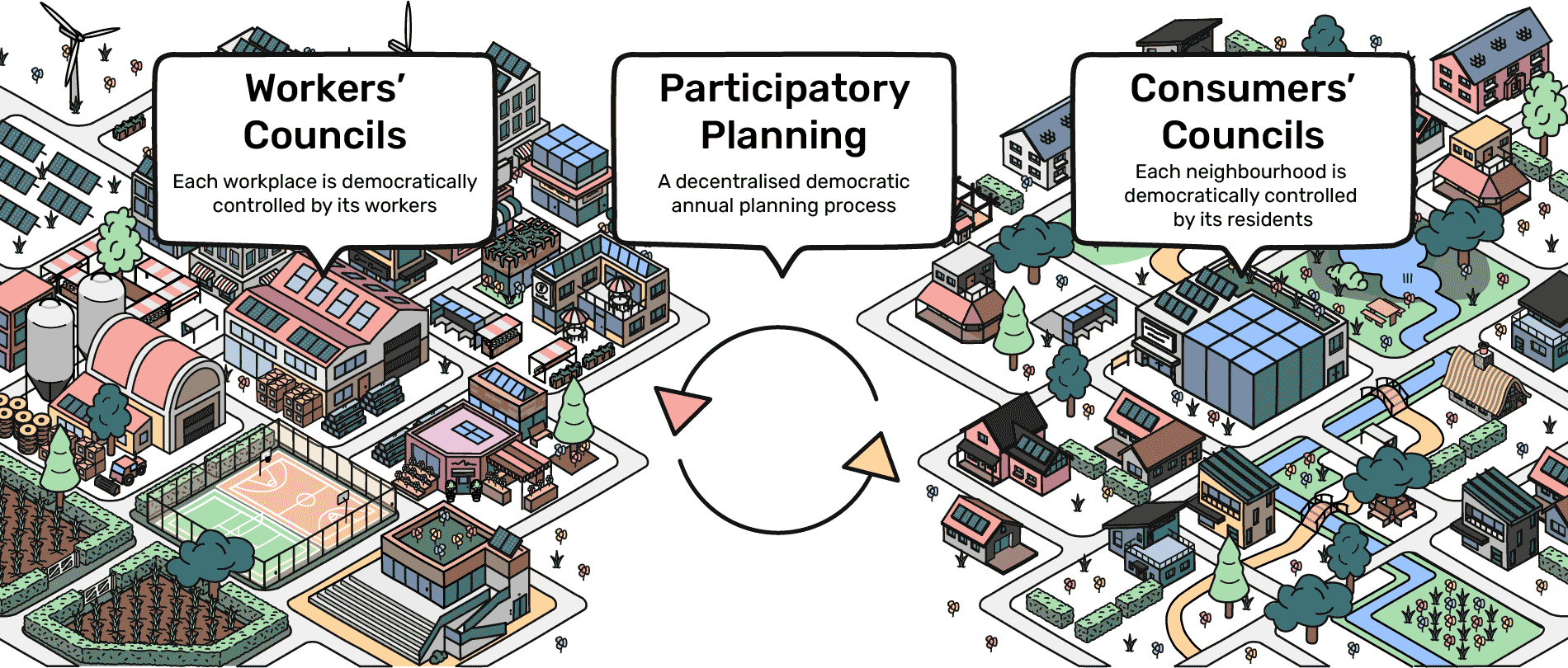
Economic Councils & Federation Assembly:
"Anarchist Communism seeks the eradication of all exploitation and violence, whether against the individual or against the working masses. To that end it creates an economic and social basis that fuses the country's economic and social life into a harmonious whole and guarantees every individual parity with everyone else and affords the maximum well-being to all. This basis is common ownership in the form of the socialization of all of the means and instruments of production (industry, transport, land, raw materials, etc.) and the construction of national economic agencies on the basis of equality and the self-management of the working classes."
Each region has its own economic councils i.e. the Producer/Worker Councils and the Consumer Councils that are integrated into broader networks across regions. In this model, regional economies could manage local production and distribution, with each region forming interconnected nodes within a wider federation. Councils are responsible for planning, production, and distribution within their own region, managing everyday needs like food, housing, healthcare, and public services. An "Industry Federation" coordinates production within specific industries across regions, ensuring efficiency and resource alignment. Regional councils collaborate through a Economic Councils Assembly(of Consumers Federation & Indistry Federation), which facilitates coordination between regions and sectors, maintaining a decentralized yet cohesive economic structure. They manage inter-community resource allocation, large-scale infrastructure projects, and regional resources through annual, decentralized democratic planning process called participatory planning.
History Videos ㅤ ㅤㅤ

Leninist USSR | The State is Counter Revolutionary II

Maoist China | The State is Counter Revolutionary III

Anarchist Catalonia: Creating a new society

Makhnovshchina: Building Anarchism in a civil war

Paris Commune: Our First Revolution

The Birth of the Anarchist Movement

The Bolshevik War Against the Soviets

Anarchist Counter Culture in Spain

Inside the Zapatista movement: Mexico's hidden revolution

Inside Rojava: The Autonomous Region in Syria
Theory Videos ㅤㅤㅤㅤㅤ ㅤ ㅤ ㅤ ㅤ ㅤ ㅤㅤ ㅤ

The Conquest of Bread by Peter Kropotkin

Anarchism and Sovietism by Rudolf Rocker

Anarchist Constitutions | Alex Prichard & Ruth Kinna

Peter Kropotkin: Well-Being for All | Ruth Kinna
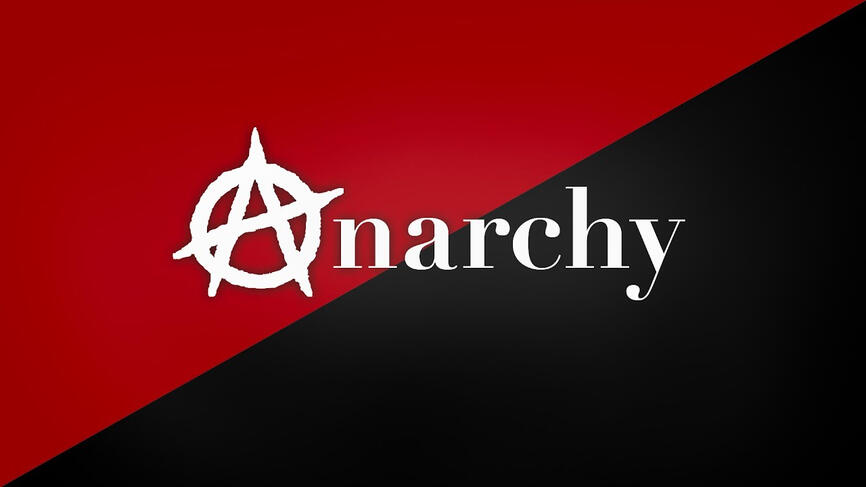
A Guide to: Anarchy by Malatesta

A Modern Anarchism by Daniel Baryon

Fighting For Ourselves: Anarcho-Syndicalism and the Class Struggle

Anarcho-syndicalism: Theory and Practice By Rudolf Rocker

Post-Scarcity Anarchism by Murray Bookchin

Mutual Aid a Factor of Evolution by Kropotkin
Libertarian Socialist Channels

Anarchism Research

Zoe Baker

Anark

RE-EDUCATION

LuckyBlackCat

Champagne Anarchism

Andrewism

BadMouse

subMedia

Black Rose Federation

Lee Cicuta

Thought Slime

Radical Reviewer

Final Straw

Step Back

AnRel

The Canvas

Then & Now

Skeptical Leftist

Revolution and Ideology
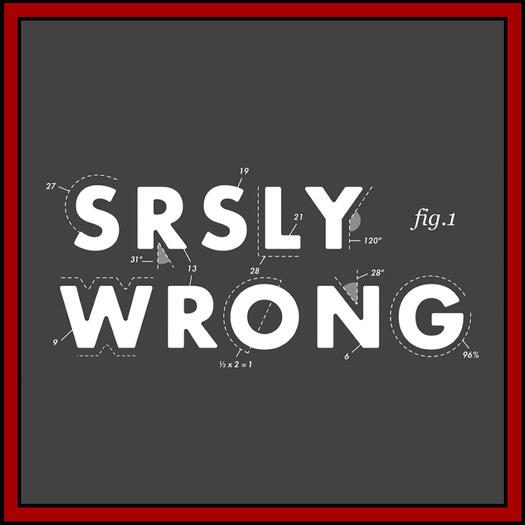
Srsly Wrong

Tacticool Girlfriend

Queer Armorer

Anansi’s Library

Anarcha Semiyah

Prince Shakur

AnarchisTara

Sluggbait

Renegade Cut

Audible Anarchist
Introductory Resources:
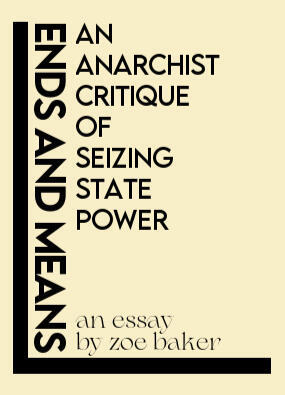
Means and Ends (Essay)
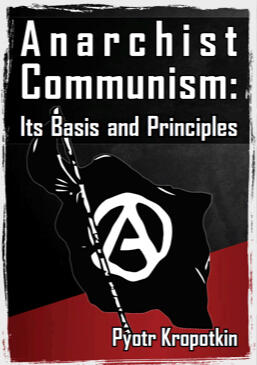
Anarchist Communism: Its Basis

The Anarchist Revolution

Anarchism and Sovietism

Federalism

The Heart of Democracy

Basic Bakunin

Anarchist Morality

An Anarchist Programme

The Two Octobers

Guide to Anarchist Ecology

What is Social Ecology?
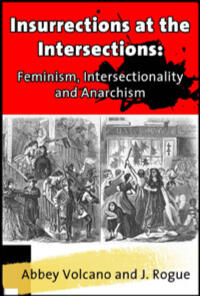
Intersectionality & Anarchism

Anarchy Works

An Anarchist FAQ
Modern Resources:

Social Anarchism and Organisation

Means and Ends (History)

Anarcho-Communist Planning

Turning The Tide
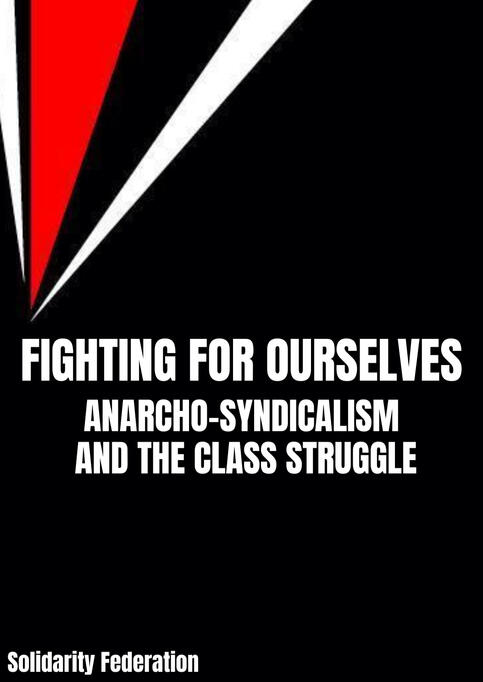
Fighting for ourselves: Anarcho-syndicalism and the Class Struggle

Anarchist Communists: A Question of Class

Emergence & Anarchism

A Modern Anarchism

Participatory Economics

Post-Scarcity Anarchism

The Ecology of Freedom

The Anarchist Collectives

Horizontalism: Voices of Popular Power

The Democracy Project
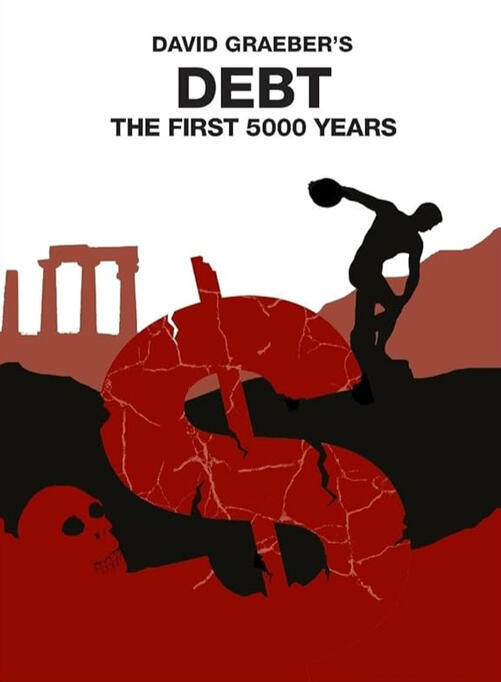
Debt: The First 5,000 Years
Historical Foundations:

The Conquest of Bread

Bakunin: Selected Writings

Statism and Anarchy

Anarchism and Sovietism

Anarcho-syndicalism

Organisational Platform

Marxism, Freedom and the State

Liberating from the State

Anarchy by Malatesta

Words of a Rebel

The Struggle Against the State and Other Essays

Malatesta: Life and Ideas

Mutual Aid: A Factor of Evolution

Nationalism and Culture

Memoirs of a Revolutionist
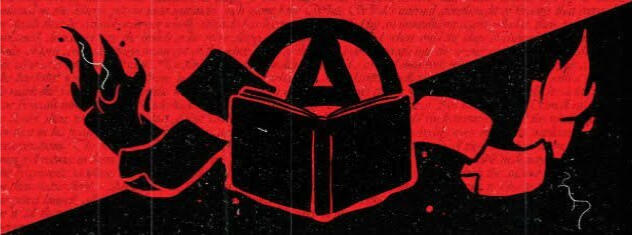
Anarchist Theorist Library
Mikhail Bakunin
Lucy Parsons
Erich Mühsam
Peter Kropotkin
Nestor Makhno
Rudolf Rocker
Errico Malatesta
Emma Goldman
Modern Contributors
Murray Bookchin
Scott Nappalos
Zoe Baker
David Graeber
Uri Gordon
Cindy Milstein
Link List: Anarchist Currents
Platformist literature
Classical Platformism:
- Organizational Platform of the General Union of Anarchists
- The Problem of Organization and the Notion of Synthesis
- Supplement to the Organizational Platform
- The Old and New in Anarchism
- Elements Old and New in Anarchism
Modern Platformism:
- Ireland: Platformism in action
- The Global Influence of Platformism Today
- Social Anarchism and Organisation
- Constructing the Revolution
Especifismo:
- Social Anarchism and Organisation
- The Strategy of Especifismo
- Foundational Concepts of the Specific Anarchist Organisation
- Especifismo by Adam Weaver
Anarcha Feminism literature
- Anarchy and the Sex Question
- Breaking the Waves
- Socialism, anarchism and feminism
- Insurrections at the Intersections
- Feminism and Organized Anarchism
- Free Women of Spain: Anarchism and the Struggle for the Emancipation of Women
Communalist literature
Anarcho-Syndicalist literature
- Fighting For Ourselves: Anarcho-syndicalism and the class struggle
- Anarcho-syndicalism: Theory and Practice
- Anarchism and Sovietism by Rudolf Rocker
- Black Flame: The Revolutionary Class Politics of Anarchism and Syndicalism
- Anarcho-syndicalism in the 20th Century
- Anarchism, Syndicalism and Workers Councils
- Anarchism/Syndicalism as a Vision, Strategy and Experience of Bottom-up Socialist Democracy
Black Anarchism literature
- Black Anarchism: A Reader
- As Black as Resistance: Finding the Conditions for Liberation
- Anarchism and the Black Revolution
- Anarcho-Blackness Notes Toward a Black Anarchism
- Black Autonomous Movements: New Dynamics in Black Liberation
Anarcha Queer literature
- Queering Anarchism
- Queers With Guns
- Queer Social Anarchism
- DISMANTLING HIERARCHY, QUEERING SOCIETY (Pamphlet)
Eco-Anarchist literature
History literature
- A Brief History of Popular Assemblies and Worker Councils
- Breaking the Chains: A History of Anarchism
- The Bolshevik Myth
- The Anarchist Collectives (Spanish Revolution)
- THE RUSSIAN REVOLUTION by Rosa Luxemburg
- Anarchism in the Chinese Revolution
- Kronstadt 1921: An Analysis of Bolshevik Propaganda
- 1919: When the Bolsheviks Turned on the Workers
- The Russian Counterrevolution
- Cuban Anarchism: The History of A Movement
- Manifesto of the Makhnovists
- Towards a Fresh Revolution
Capital as Power Economics
A post-Marxist economic theory that closely aligns with an anarchist analysis.
CasP offers a critical perspective on capitalism, emphasizing the role of power dynamics in economic processes, distinct from both mainstream and Marxist economic theories.
(A CasP primer pre-text for the full following economic text.)
(Full CasP economic theory.)
Libertarian Socialist Economy
JOIN THE ANARCHISTS
You want to make a difference? Connect with an anarchist group or union, build popular power, get organized !
About This Website:
This is a collaborative project written form a social anarchist perspective.
We started working on this website to make it easy for non-anarchists to get started and help new anarchists dig deeper into their journey. Whether you're just curious or looking to learn more, we hope you found this site helpful.Our site was inspired by and draws heavily on the german anarchist website anarchismus.de and our overview draws heavily on, and includes excerpts from, the following sources: Black Rose Federation: New to Anarchism?, Basic Principles of Anarchism, The Heart of Democracy., Social Anarchism and Organisation, Means and Ends by Zoe Baker, The State is Counter-Revolutionary , Fighting for ourselves: Anarcho-syndicalism and the Class Struggle, Building Dual Power, Anarcho-Communist Planning, Conceptions of Social Change, Revolution, and Anarchist Organisation as well as a wide range of classical, foundational anarchist texts, which are listed in our Literature section.For any issues, corrections, or change requests, please contact us at "[email protected]"
- Anarchist Signal Collective
Disclaimer: This website presents theoretical discussions on anarchist theory and history. It is not a call to illegal action activities. The content is for educational & activist purposes only.
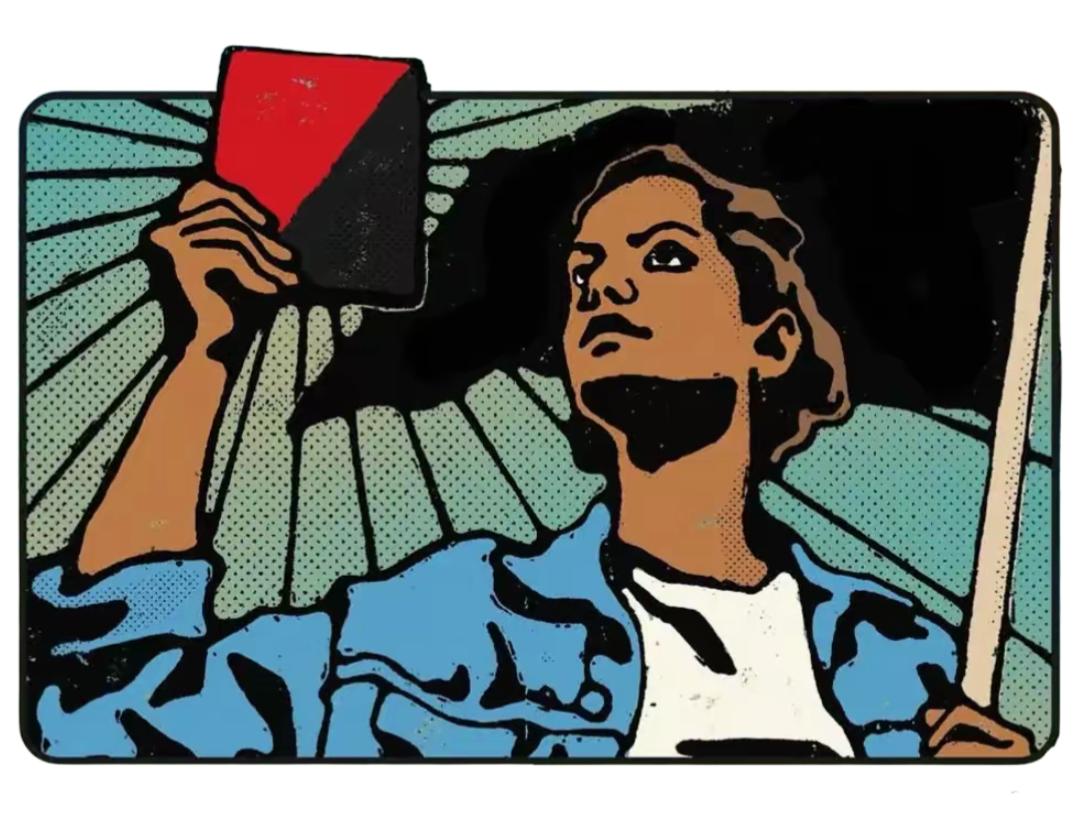
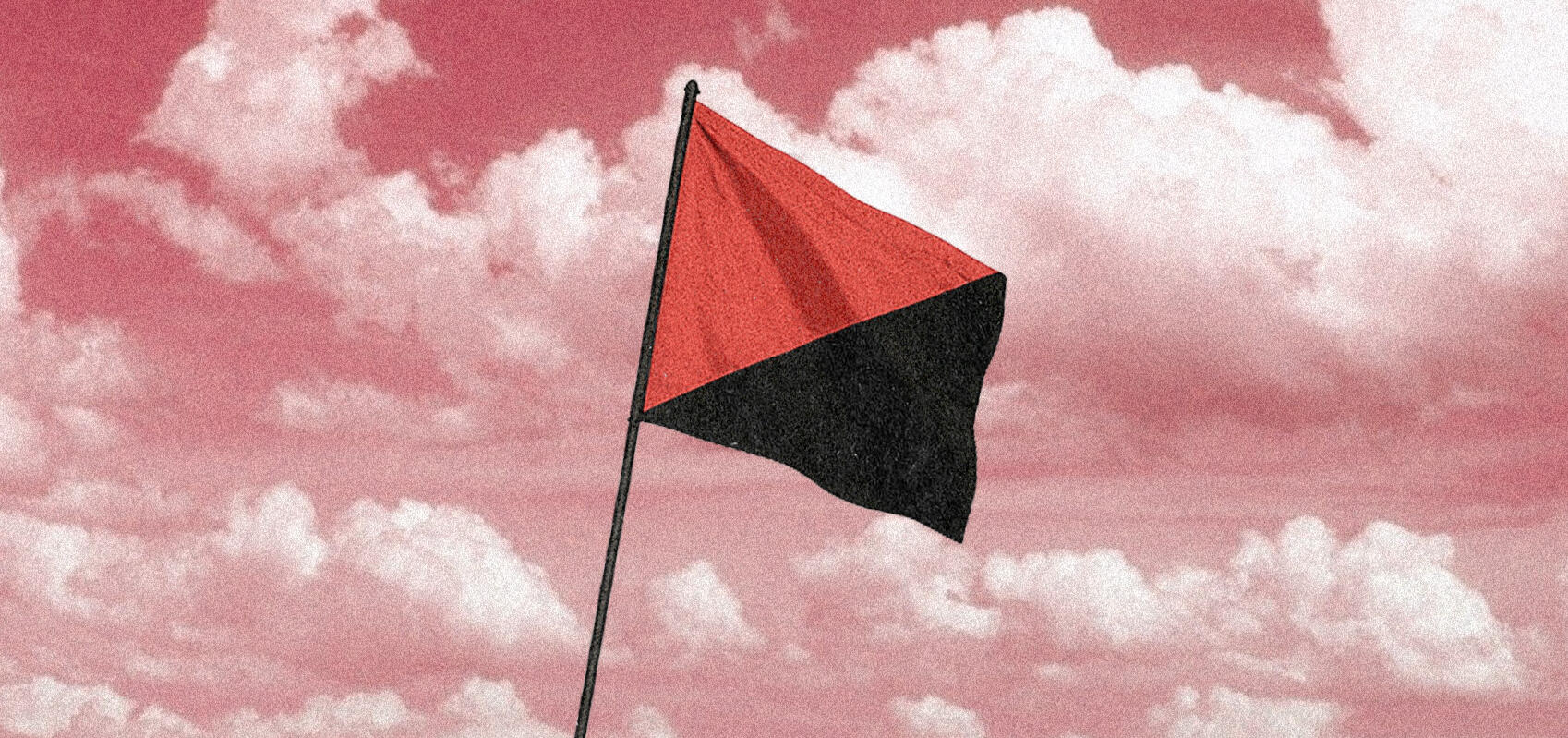
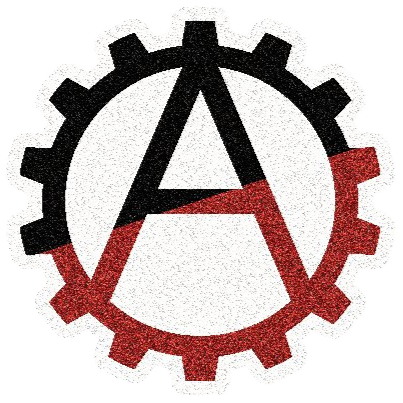
Anarchism: Foundations
Anarchism emerged as the anti-state wing of the socialist movement, which is commonly referred to as libertarian socialism or libertarian communism. Anarchists, without exception, are opposed to all structures of hierarchical domination, including capitalism, the state, white supremacy, heteropatriarchy, imperialism, and settler colonialism. Instead, anarchists strive for a horizontal, stateless, classless, socialist society free from domination, that is grounded in the principles of solidarity, self-management, freedom, federalism, ecological sustainability and mutual aid.Within the anarchist movement are diverse currents of thought and practice that all share these principles while emphasizing different priorities & tactics. Yet anarchists broadly agree that a new society can only be brought into being through social revolutionary action by independent mass movements, which advance dual-power, practice prefigurative politics, and organize workers' strikes.

WHOOPS....
YOU'RE NOT SUPPOSED TO BE HERE.
(or don't.... anarchy n shit)
SPREAD THE WORD!
Material for posters, stickers, flyers.
Click the image to download it.
something something?
"The governments protected the bourgeoisie and their money and exploitation of workers and peasants.
As for the second way, the Popular Councils, they do not need a parasitic or oppressive government, in which classes, unemployment, poverty, labor, wages, private property, and the needs of all are realized, and greed, lies, deception, greed, laziness, and envy will disappear."The council system offers an directly democratic, anarchist approach to self-organization and decision-making that actually empowers the people, resolves conflicts peacefully and ensures responsive decision-making which is supported by most anarchists. The council system has always been a very important part in self-management to anarchists "The best method to create new collective freedom is the 'Free Soviet.' Proceeding from this conviction, the anarchist revolutionary will call the enslaved to struggle for these free associations."It is obvious that individuals must work together in order to lead a fully human life. And so, "having to join with others humans” the individual has three options: “ 1.he must submit to the will of others or 2.subject others to his will or 3.live with others in fraternal agreement in the interests of the greatest good of all. Nobody can escape from this necessity.”-Errico Malatesta.
Anarchists obviously pick the last option, where individuals engage as equals, expressing themselves and developing their intellectual and ethical capacities. Direct democracy allows individuals to participate in decision-making, fostering self-determination and critical thought, unlike hierarchical systems.For anarchists, "democracy" broadly usually means any form of direct voting based on full and equal participation within a free associations, which we see as essential for peoples self-management and free agreement. Some disagree with this definition and argue democracy always implying majoritarianism because they claim democracy strictly means "rule of the people" which was based on a historical misconception in the first place as the idea that democracy means "rule of the people" is false because "kratos" means "power" or "capacity". Therefore, demokratia is lacking in archy "arkhe" and even in pointless semantic discussions around the word aligns with the anarchist conception of "Power to the People," Democracy only became associated with "rule of the people" since it was used synonymously with republicanism between 18th- and 19th century."Democracy was not invented in ancient Greece. Granted, the word “democracy” was invented in ancient Greece —but largely by people who didn’t like the thing itself very much. Democracy was never really “invented” at all. Neither does it emerge from any particular intellectual tradition. It’s not even really a mode of government. In its essence it is just the belief that humans are fundamentally equal and ought to be allowed to manage their collective affairs in an egalitarian fashion, using whatever means appear most conducive. That, and the hard work of bringing arrangements based on those principles into being.In today’s North America, its anarchists - proponents of a political philosophy that has generally been opposed to governments of any sort - who actively try to develop and promote such democratic institutions. In a way the anarchist identification with this notion of democracy goes back a long way. In 1550, or even 1750, when both words were still terms of abuse, detractors often used “democracy” interchangeably with “anarchy”, - But while “democracy” gradually became something everyone felt they had to support (even as no one agreed on what precisely it was), “anarchy” took the opposite path, becoming for most a synonym for violent disorder. Actually the term means simply “without rulers”. Just as in the case of democracy, there are two different ways one could tell the history of anarchism. On the one hand, we could look at the history of the word “anarchism”, which was coined by Pierre-Joseph Proudhon in 1840 and was adopted by a political movement in late-nineteenth-century Europe, becoming especially strongly established in Russia, Italy, and Spain, before spreading across the rest of the world; on the other hand, we could see it as a much broader political sensibility."This understanding follows the same logic we have on anarchism, meaning that Bakunin, Kropotkin, and others, did not invent the idea of anarchism, but, having discovered this broader phenomena among the masses, they merely helped refine and propagate it.Anarchist organisations dislike the enforcement of decisions upon dissenters and instead, members of anarchist associations collectively define obligations, managing their own activities. These associations operate through assemblies where decisions are made collaboratively, ensuring laws can be revised as needed. Administrative tasks may be delegated to elected individuals with clearly defined, limited mandates. These delegates are recallable at all times and hold no personal power; their role is simply to relay proposals from their council and act as a conduit for the region's collective interest. They can be immediately recalled if they stray far from their directive, which is set by the council through an imperative mandate. This directive could outlines specific guidelines or instructions that delegates must adhere to, ensuring they remain accountable to the councils. Additionally, any outcomes from discussions at higher levels are shared with the community for review. This process ensures that all affected councils have a direct role in shaping decisions, while maintaining their self-determination. "We consider the working people capable of building, on their own and without parties, commissars or generals, their own Free Soviet System, in which those who are elected to the Soviet(Councils) will not command and order us but on the contrary, will be only the executors of the decisions made in our workers' gatherings and conferences"The federative council system connects associations(councils) into federations. These relationships, like those within associations, are free and horizontal, maximizing participation and individual freedom. "It is beyond question that the council idea arises naturally out of a libertarian socialist vision which has so taken root in a large part of the international labour movement. as opposed to the state idea with its wake of bourgeois ideological traditions"
Erich Mühsam in his work "The Liberation of Society from the State: What is Communist Anarchism? " writes "which manner the federated labor and distribution organizations of communist anarchism are to be realized by means of the council system. A council republic is created from the bottom up, its actual center of motion is the local urban and rural councils. According to circumstance and necessity, they can in occasional or regularly scheduled meetings of residents take note of, discuss, criticize, and expand upon the activities of the industrial or regional councils, making them the foundation of their own decisions. They can set up committees for specific purposes which might deal with specialized questions and independently under general vigilant supervision entrust individual persons with the carrying out of contracted duties. They will resolve the technical questions of medicine, construction, and commerce in the city or village, the educational and judicial affairs, the protection of the common institutions, in short they themselves will take care of everything which can be naturally accomplished at the scene by those immediately involved and affected."Direct participation in the decision-making process of a community improves people's understanding of civic participation and the impact they can have on shaping their lives. These assemblies foster open dialogue and peaceful conflict resolution by promoting the exchange of ideas, compromise, and negotiation. This approach leads to decisions that are broadly supported, reducing division within the community while effectively addressing local projects and issues. The decision-making on local issues and projects also leads to more responsible and thoughtful choices, as the community is directly influenced by the consequences of their actions because of the proximity to the outcomes.
Erich Mühsam writes: "In federalism, the agreement of individuals brings about the connection of their will, directed without distinction toward their own as toward the common good, with the rational production of necessities, with their rational distribution and usage and with the proper arrangement of all other life-relationships; in centralism the externally derived law of the momentary power is in force, which holds in its hands the tools for suppressing the will of the community."Anarchist decision-making emphasizes avoiding both majoritarian and minority rule. As noted by Malatesta, anarchists prevent majoritarian rule by prioritizing consensus-building to achieve collective agreement; however, if consensus proves unattainable, they may employ supermajority voting to prevent minority rule. This approach minimizes the risk of bad-faith obstruction by a minority while preventing the tyranny of a simple majority.Some Individualist critics argue that direct democracy may still impose majority rule. However, this is unsubstantiated since anarchists emphasize the rights of minorities to dissent, withdraw, or protest.
“If the majority have acted in bad faith then the minority will have to take political action, including politically disobedient action if appropriate, to defend their citizenship and independence, and the political association itself… Political disobedience is merely one possible expression of the active citizenship on which a self-managing democracy is based … The social practice of promising involves the right to refuse or change commitments; similarly, the practice of self-assumed political obligation is meaningless without the practical recognition of the right of minorities to refuse or withdraw consent, or where necessary, to disobey.”

{General List of Contemporary & Historical Social Revolutionary Activity. }
Anarchism: An Overview
Principles, Praxis and History of Anarchism
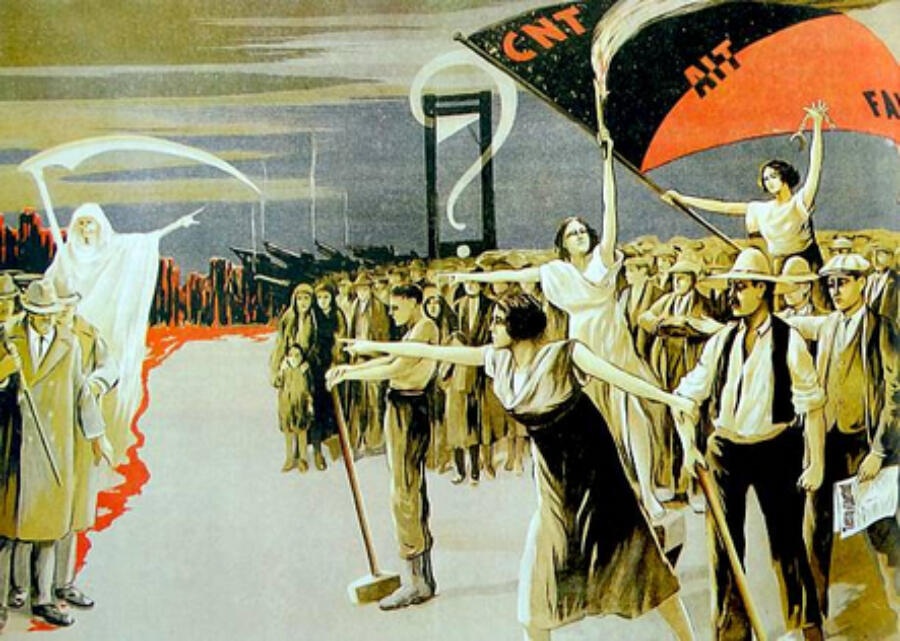
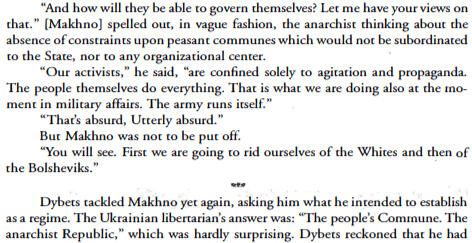
1. müshsam 2. anarchist republic fre terdesc 3.Proudhon's What is Property directly on this when he names himself an anarchist.What is to be the form of government in the future? hear some of my younger readers reply:“Why, how can you ask such a question? You are a republican.”“A republican! Yes; but that word specifies nothing. Res publica; that is, the public thing. Now, whoever is interested in public affairs — no matter under what form of government — may call himself a republican. Even kings are republicans.”“Well! you are a democrat?”“No.”“What! you would have a monarchy.”“No.”“A constitutionalist?”“God forbid!”“You are then an aristocrat?”“Not at all.”“You want a mixed government?”“Still less.”“What are you, then?”“I am an anarchist.”“Oh! I understand you; you speak satirically. This is a hit at the government.”“By no means. I have just given you my serious and well-considered profession of faith. Although a firm friend of order, I am (in the full force of the term) an anarchist.”
“The Republic is the organization by which, all opinions and all activities remaining free, the People, by the very divergence of opinions and of wills, thinks and acts as a single man. In the Republic every citizen, in doing what he wishes and nothing but what he wishes, participates directly in legislation and government, just as he participates in the production and circulation of wealth. There every citizen is king; for he has plenary power, he reigns and governs. The Republic is a positive anarchy. It is neither liberty subjected TO order, as in the constitutional monarchy, nor liberty imprisoned IN order, as the provisional government would have it. It is liberty delivered from all its hobbles, superstition, prejudice, sophism, speculation, authority; it is mutual liberty, not self-limiting liberty; liberty, not the daughter but the MOTHER of order.”“Royalty is never legitimate. Neither heredity, election, universal suffrage, the excellence of the sovereign, nor the consecration of religion and time, makes royalty legitimate. In whatever form it may appear, monarchical, oligarchic, democratic,—royalty, or the government of man by man, is illegal and absurd. (Democracy) is nothing but a constitutional arbitrary power succeeding another constitutional arbitrary power; it has no scientific value, and we must see in it only a preparation for the Republic, one and indivisible.”-PJ proudhon
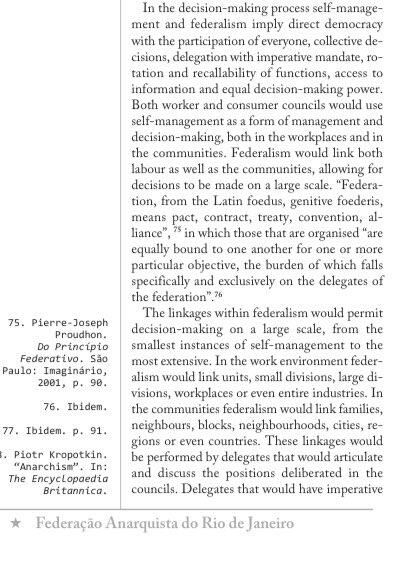
Anarchism and Human-Nature
"----"
s
The Social Reproduction of Libertarian CommunismFor anarchists one of the main consequences of the theory of practice was that there is an inherent connection between means and ends. The end goal of anarchism – free or libertarian communism – is a stateless classless society in which workers collectively own the means of production and self-manage their workplaces and communities through councils in which everyone has a vote and a direct say in the decisions that affect them. These councils would coordinate action over large areas by associating together into a decentralised system of regional, national and international federations in which as many decisions as possible were made by the local councils themselves. This would be achieved through regular congresses at a regional, national and international level which would be attended by instantly recallable mandated delegates that councils elected to represent them. Crucially, delegates would not be granted the power to make decisions independently and impose them on others. Decision making power would remain in the hands of the council who had elected them.Such a society would be reproduced over time by human beings engaging in these forms of activity and in so doing continuously creating and re-creating both communist social relations and themselves as people with the right kinds of capacities, drives and forms of consciousness for a communist society. For example, under libertarian communism workers within their local councils would make decisions through a system of direct democracy in which every member has a vote. Through participating in these local councils they would not only make decisions but also reproduce themselves as people who are able to and want to make decisions in this manner, such as being able to effectively take minutes, formulate proposals that people will support and make sure that a small minority of people do not do all the talking in meetings.People who want to and are able to reproduce a communist society will not magically come into existence. A communist society can only emerge through a social revolution that abolishes capitalism and therefore will have to be created by the people who presently live under capitalism. Given this, in order to achieve a communist society the majority of the population has to engage in activities during the struggle against capitalism itself that transform them into people who want to and are able to self-direct their lives and their community through local councils and federations of councils. If this does not happen, then communism will not be created. This is because for communism to exist real people must establish and reproduce it day after day through their own activity.Revolutionaries therefore have to use means that are constituted by forms of practice that will actually transform individuals into the kinds of people who will be able to and want to create the end goal of communism. If revolutionaries make the mistake of using the wrong or inappropriate means then they will produce people who will create a different society to one they initially intended. To quote Malatesta,it is not enough to desire something; if one really wants it adequate means must be used to secure it. And these means are not arbitrary, but instead cannot but be conditioned by the ends we aspire to and by the circumstances in which the struggle takes place, for if we ignore the choice of means we would achieve other ends, possibly diametrically opposed to those we aspire to, and this would be the obvious and inevitable consequence of our choice of means. Whoever sets out on the highroad and takes a wrong turning does not go where he intends to go but where the road leads him.
RANDOM QUOTES SHIT
Kropotkin on federalism and communes
Authoritarianism as The degree to which a power structure monopolizes control over the total social implementation of some power.
"A federal organization, from below upward, of workers associations, groups, communes, districts, and, ultimately, regions and nations – the sole condition for real as opposed to fictitious freedom" - Bakunin
-
"The Commune will be organized by the standing federation of the Barricades and by the creation of a Revolutionary Communal Council composed of one or two delegates from each barricade, one to district, vested with
plenary but accountable and removable mandates." - Bakunin
-
"It is beyond question that the council idea arises naturally out of a libertarian socialist vision which has so taken root in a large part of the international labour movement. as opposed to the state idea with its wake of bourgeois ideological traditions" - Rocker
-
"The forerunners of the council system appreciated well that along with the exploitation of man by man would have to vanish also the domination of man by man. They realised that the state, being the organised power of the ruling classes, cannot be transformed into an instrument for the emancipation of labour. Likewise, it was their view that the primary task of the social revolution has to be the demolition of the old power structure, to remove the possibility of any new form of exploitation and retreat. "- Rocker
-
"Opinions mingle and vary to the point of infinity, but two streams of ideas already sound more and more distinctly in this din of voices: the abolition of individual property and communism; and the abolition of the State, its replacement by the free commune, and the international union of working men."-Kropotkin
-
"A federal organization, from below upward, of workers’ associations, groups, communes, districts, and, ultimately, regions and nations – the sole condition for real as opposed to fictitious freedom " - Bakunin
-
.These agencies will signify the social driving force of the revolution, they will take in hand from the hour of triumph onward the economy and management of the polity, they will in the time of transition and during the whole development of the socialist forms of labor and society tend to and ensure the organization of freedom, they will create communist anarchy and in the anarchist community remain the bearers of the federation of labor and human alliances. These agencies are the free councils of the workers and peasants.-Mühsam
-
"We are of the opinion that, with regard to their decisions relating to the various realms of economic and social life, the councils of the workers' and peasants' organizations or the factory committees will see to those, not through violence or decrees but rather through common accord with the toiling masses who will be taking a direct hand in the making of those decisions."
-
"A Federation of these organizations and their soviets would dispense with the State and the capitalist system, and would be the chief pivot of the free soviets regime"
-
The idea of the council system is intimately intergrown with Socialism and is unthinkable without it; dictatorship, however, has nothing whatever in common with Socialism, and at best can only lead to the most barren of state capitalism. -Rudolf Rocker
-
"The council system tolerates no dictatorships as it proceeds from totally different assumptions. In it is embodied the will from below, the creative energy of the toiling masses. In dictatorship, however, only lives barren compulsion from above, which will suffer no creative activity and proclaims blind submission as the highest laws for all. The two cannot exist together. In Russia dictatorship proved victorious. Hence there are no more soviets there. All that is left of them is the name and a gruesome caricature of its original meaning." - Rudolf Rocker
-
each commune will have to combine with neighboring communes
in a federation - Bakunin
-
On delegation: "There will be provided deputies invested with imperative, always responsible, and always revocable mandates" -Bakunin
-
The communal council thus organized will be able to choose, from its own members, executive committees -Bakunin
-
"The future social organization should be carried out from the bottom up, by the free association or federation of workers…”-Bakunin
-
The State will be replaced by a federalist system of workers organisations of production and consumption. united federatively and self-administrating. This system excludes just as much authoritarian organisations as the dictatorship of a party, whichever it might be. - Dielo Truda
-
"We consider the working people capable of building, on their own and without parties, commissars or generals, their own free soviet system, in which those who are elected to the Soviet will not, as now, command and order us, but on the contrary, will be only the executors of the decisions made in our workers' gatherings and conferences. " - Black Army
-
"The governments protected the bourgeoisie and their money and exploitation of workers and peasants. As for the second way, the Popular Councils, they do not need a parasitic or oppressive government, in which classes, unemployment, poverty, labor, wages, private property, and the needs of all are realized, and greed, lies, deception, greed, laziness, and envy will disappear."
-
"There will be no bosses... In the new system of production, the functions of organization will devolve upon specially-created agencies, purpose-built by the working masses: workers councils or workplace committees. These agencies, liaising with one another at the level of municipality, province and then country, will make up the municipal, provincial and thereafter general (federal) institutions for the management and administration of production. Appointed by the masses and continually subject to their supervision and control, these bodies are to be constantly renewed, thereby achieving the idea of genuine self-management of the masses. Unified production, in which the means of production and their output belong to all, with wage slavery replaced by the principle of comradely cooperation and equality of rights for all producers an established fact, production overseen by workers' administration bodies elected by the masses." - Dielo Truda
-
"Anarchist Communism seeks the eradication of all exploitation and violence, whether against the individual or against the working masses. To that end it creates an economic and social basis that fuses the country's economic and social life into a harmonious whole and guarantees every individual parity with everyone else and affords the maximum well-being to all. This basis is common ownership in the form of the socialization of all of the means and instruments of production (industry, transport, land, raw materials, etc.) and the construction of national economic agencies on the basis of equality and the self-management of the working classes" - Dielo Truda
-
"Everything in this society, from each individual factory right up to the entire political system of the state, is nothing but a fortress of capital"- Dielo Truda
-
"Human history represents a continuous chain of struggles waged by the working masses in pursuit of their rights, freedom and a better life. At all times throughout the history of human societies, this class struggle has been the principal factor determining the form and structure of those societies."- Dielo Truda
-
Revolutionary army
"Having stressed the necessity and inevitability in the period of civil war for the workers to create their own revolutionary army, the Platform also asserts that this army must be subordinated to the overall (the highest) worker-peasant production and consumption organizations.The subordination of the army to these organizations does not in any way imply the idea of an elected civil authority. Indeed, an army, even the most revolutionary and most popular of armies in terms of its mentality and title, cannot, however, exist and operate off its own initiative, but has to be answerable to someone. Being an organ for the defence of the revolutionary rights and revolutionary positions of all the workers, the army must therefore be wholly subordinate to the workers and piloted by them politically speaking (we stress politically, for, when it comes to its military and strategic direction, that could only be handled by military bodies within the ranks of the army itself, answerable to the highest worker-peasant organizations).But to whom can the army be directly answerable, politically? The workers as a whole are not a united body. They will be represented by various economic organizations(the Workers' Committees and Free Soviets). It is to these very same organizations, in the shape of their highest federal agencies, that the army will be subordinated."
"The central tendency, the spinal column of anarchism is represented by communist anarchism"- Dielo Truda (Workers’ Cause)
[extra]
"The central tendency, the spinal column of anarchism is represented by communist anarchism. Anarcho-individualism is at best a philosophical and literary phenomenon and not a social movement. It often happens that the latter is drawn into politics and ends up as a bourgeois fad." Dielo Truda (Workers’ Cause)
----
“We are convinced that the formation of an anarchist party in Russia, far from being prejudicial to the general revolutionary endeavour, is instead desirable and useful in the highest degree.” -Kropotkin (Foreword to Bakunin’s Paris Commune, [Russian edition], 1892)-----
"We anarchists who agitate and fight for the emancipation of the proletariat, must, at all costs, have an end of the dissipation and disorganization prevailing in our ranks, for these are destroying our strength and our libertarian endeavours"- Dielo Truda (Workers’ Cause)
---
"Whatever the cost, we must set up soviets which are beyond pressure
from any and every party. Only non-party soviets of workers, freely
elected are capable of affording us new liberties and rescuing the labor
ing people from enslavement and oppression. Long life to the freely
elected, anti-authoritarian soviets!" - (Makhnovist) Anarchist Insurgent Boino
----
"In proportion as all classes of the community take a more lively part in public affairs and knowledge spreads among the masses, their longing for equality becomes stronger, and their demanda of social reorganization become louder and louder, they can be ignored no more." - Peter Kropotkin
---
"the means of production being the collective work of humanity, the product should be the collective property of the race. Individual appropriation is neither just nor serviceable. All belongs to all. All things are for all men, since all men have need of them, since all men have worked in the measure of their strength to produce them, and since it is not possible to evaluate every one’s part in the production of the world’s wealth.""What we proclaim is THE RIGHT TO WELL-BEING: WELL-BEING FOR ALL!"
-Kropotkin"We do not want to rob any one of his coat, but we wish to give to the workers all those things the lack of which makes them fall an easy prey to the exploiter, and we will do our utmost that none shall lack anything, that not a single man shall be forced to sell the strength of his right arm to obtain a bare subsistence for himself and his children."- Kropotkin---
"So what remains of individualist anarchism? Negation of the class struggle, of the principle of anarchist organization having as its object the free society of equal workers[.] That whole philosophy has nothing to do with anarchist theory and or anarchist practice." - Makhno
----"We must reckon with a residue of delinquency … which in the meantime will oblige the mass of workers to take defensive action. Discarding every concept of punishment and revenge, which still dominate penal law, and guided only by the need for self-defence and the desire to rehabilitate, we must seek the means to achieve our goal, without falling into the dangers of authoritarianism and consequently finding ourselves in contradiction with the system of liberty and free-will on which we seek to build the new society" - Malatesta
----
"Anarchy means society organized without authority, and this does not mean disorder, as is generally supposed. On the contrary, it means the highest order, order in freedom and equality."-Malatesta----Anarcho-Communists; are individualists, not in the sense of an exaggerated respect for the individual which, however it may be disguised, is a form of authoritarianism, but because they are supporters of communism for the very reason that it guarantees every individual the greatest physical, intellectual and moral development - International Anarchist Communist Federation-----Experience teaches us that anarchist action on a wide scale will only achieve its goals if it possesses a well-defined organizational base, inspired and guided by the principle of the collective responsibility of its militants. - Makhno----Unfortunately, as things stand anarchism is strong only in its philosophy. It lacks practical means. It is unable to manifest itself completely, even in times of revolution, and those spontaneous movements with an anarchist spirit that do appear, seem to the eyes of the wide masses to be merely desperate attempts. And that only goes towards making anarchism’s tragic state even worse. ---....-----“How do you wish to guide the masses?”, you ask. In reply, I would say that, during the course of events, every social movement, especially every revolutionary movement of the wide popular masses, is required to formulate certain proposals designed to help the intended goal be achieved. The mass is too heterogeneous to be able to do this. Only ideological groups with clearly-defined policies are capable of driving this process, particularly towards the beginning of the revolution. Only they will be able to throw enough light on events and clearly define the unconscious desires of the masses, and setting an example through actions and words. It is for this reason that our Party must, in my opinion, make clear its political unity and organizational character. In the domain of practical achievements, the autonomous anarchist groups must be able to face up to every new situation that presents itself, in establishing the problems to be resolved and the responses to make without hesitation and without altering the goals and the spirit of anarchism. - Makhno
---Man is only free if he is prepared to kill every hangman and every power magnate if they do not wish to stop their shameful tasks - Makhno-----The best method to create new collective freedom is the 'Free Soviet.' Proceeding from this conviction, the anarchist revolutionary will call the enslaved to struggle for these free associations.-Makhno-----Instead of spending their time rejecting left, right and centre, I believe that anarchists would be better occupied getting to grips with what they do want and proposing something realistic to the workers.-Makhno----------"If our movement is a revolutionary social movement, we have to acknowledge the need for it to be organized... Otherwise, our movement will be condemned to succumb once and for all to the influences of opportunists and liberals"- Nestor Makhno---"The essential point of the system was social equality between officers and men. Everyone from general to private drew the same pay, ate the same food, wore the same clothes, and mingled on terms of complete equality. If you wanted to slap the general commanding the division on the back and ask him for a cigarette, you could do so, and no one thought it curious. In theory at any rate each militia was a democracy and not a hierarchy. It was understood that orders had to be obeyed, but it was also understood that when you gave an order you gave it as comrade to comrade and not as superior to inferior. There were officers and N.C.O.S. but there was no military rank in the ordinary sense; no titles, no badges, no heel-clicking and saluting. They had attempted to produce within the militias a sort of temporary working model of the classless society."---"A council society, a council republic - this word republic in no way automatically designates a form of state, rather the self-administration of a commonwealth by the people - a council economy is only conceivable as a federative construct and can never be a state or find a place within the whole of a state. The council republic is created from the bottom up. Its actual center of motion is the local urban and rural councils. According to circumstance and necessity, they can in occasional or regularly scheduled meetings of residents take note of, discuss, criticize, and expand upon the activities of the industrial or regional councils, making them the foundation of their own decisions. They can set up committees for specific purposes which might deal with specialized questions and independently under general vigilant supervision entrust individual persons with the carrying out of contracted duties." - Erich Mühsam
FREEDOM OF SPEECH
Freedom of speech and the press is essential for a revolutionary workers' society and should generally be upheld, even for former enemies. However, in times of war, civil conflict, or military struggle, restrictions on press freedom may be necessary if enemy publications directly aid their military efforts. This censorship is strictly situational and should not become a general policy. Outside of war, all viewpoints should have the right to free expression.The core idea is that press freedom is a fundamental principle, but in wartime, preventing the enemy from using it as a weapon takes priority.by:-
"Victorious labour must not tamper either with freedom of speech or of the press, not even those of its erstwhile enemies and oppressors now defeated by the revolution. It is even less acceptable that there be tampering with press freedom and freedom of speech in the context of the revolutionary socialist and anarchist groupings in the ranks of the victorious proletariat.Free speech and press freedom are essential for the working people, not simply so that they may illuminate and better understand the tasks involved in their social and economic construction efforts, but also with an eye to better discerning the essential traits, arguments, plans and intentions of their enemies.It is untrue that the capitalist and the opportunist socialist press can lead the revolutionary working people astray. The latter will be quite capable of deciphering and exposing the lying press and giving it the answer it deserves. Press freedom and freedom of speech only scare those like the capitalists and the communists who survive through dirty deeds that they are forced to hide from the eyes of the great working masses. As for the working people, freedom of speech will be a tremendous boon to them. It will enable them to hear about everything, judge things for themselves, and give them greater consciousness and their actions greater efficacy.Monopolization of the press and the right to speak, or the limitation of these by their being squeezed into the confines of a single party's dogma, put paid to all confidence in those holding the monopoly and in their press. If free speech is stifled, it is because there is a desire to conceal the truth. This is something that was demonstrated sensationally by the bolsheviks, whose press is dependent upon bayonets and is read primarily out of necessity, in the absence of any other.However, there may be specific circumstances when the press, or rather, abuse of the press, may be restricted on the grounds of revolutionary usefulness. As an example, we might cite one episode from 1919.Throughout the month of November 1919, Ekaterinoslav was in the hands of the Makhnovist insurgent army. But at the same time, it was surrounded by Denikin's troops who, having dug in along the left bank of the Dniepr in the area around the towns of Amur and Nizhnedneprovsk, were continually shelling Ekaterinoslav with cannon mounted on their armoured trains. And a Denikinist unit headed by General Slashchev was simultaneously advancing on Ekaterinoslav from the north, from the area around Kremenchug.
At the time, the following daily newspapers were appearing in Ekaterinoslav, thanks to freedom of speech: the Makhnovist organ Put' k Svobode ["Road To Freedom"], the Right Social Revolutionaries' Narodovlastie ["Peoples' Power"], the Ukrainian Left Social Revolutionaries' Borot'ba ["Struggle"], and the Bolsheviks' organ Zvezda ["Star"]. Only the Cadets, then spiritual leaders of the Denikinist movement, were without their newspaper. But if the Cadets had at that time wanted to publish in Ekaterinoslav their own newspaper, which would without any doubt have been an accessory to Denikin's operations, would the revolutionary workers of Ekaterinoslav and the insurgents have had to grant the Cadets the right to publish one, even at a time when its military role in events would have been apparent? We think not.In a civil war context, such cases may arise more than once and in these cases, the workers and peasants will have to be guided not by the broad principle of freedom of press and free speech, but by the role that enemy mouthpieces would enjoy in relation to the ongoing military struggle.Generally speaking, and with the exception of cases of civil war, victorious labour will have to grant free speech and freedom of the press to left-wing views and right-wing views alike. That freedom will be the pride and joy of the free society of free working people.Anarchists countenance and urge the use of revolutionary violence in the fight against its class enemies, but they will never agree to wield power, even for a single instant, nor impose their decisions on the masses by force. In this connection their methods are: propaganda, force of argument, and spoken and written persuasion"
MÜSAHM QUOTES
"A council republic - in no way automatically designates a form of state, rather the self-administration of a commonwealth by the people - a council economy is only conceivable as a federative construct and can never be a state or find a place within the whole of a state."----The goal is a community which knows neither majorities nor minorities, nor dubious compromises between the two by which no one is satisfied; the goal is a community which everywhere enables unanimous resolutions because it allows every individual to fit himself into the common whole at the right place. Voluntary ties through contract and camaraderie allow such agreement of all in desire and action in every union and co-operative, and the comradely spirit which the anarchists cultivate among themselves will show and at the same time smooth the way for the cultural and economic co-operatives and voluntary agreements of the future.
[ Updates and news on the situation of the revolutionary project of Rojava. ]
Councils should always strive for a directly democratic consensus when possible. Rejecting majority dominance and striving for consensus when possible facilitates the resolution of grievances and the creation of collectively decided solutions, while actively fostering solidarity. There are different possible ideas/conceptions of modified direct voting out there that could be useful in reaching as high of a consensus as possible.
This specific proposal of how modified consensus could theoretically be organized comes from After the Revolution written by Daniel Baryon.
First, a resolution is presented by an individual in the democratic body. Following this, there is a discussion period about the resolution. After this discussion has concluded, the voters all place their first votes as a temperature check and the results are tallied. If the first vote comes to a 90% majority, the measure is passed and planning will begin.
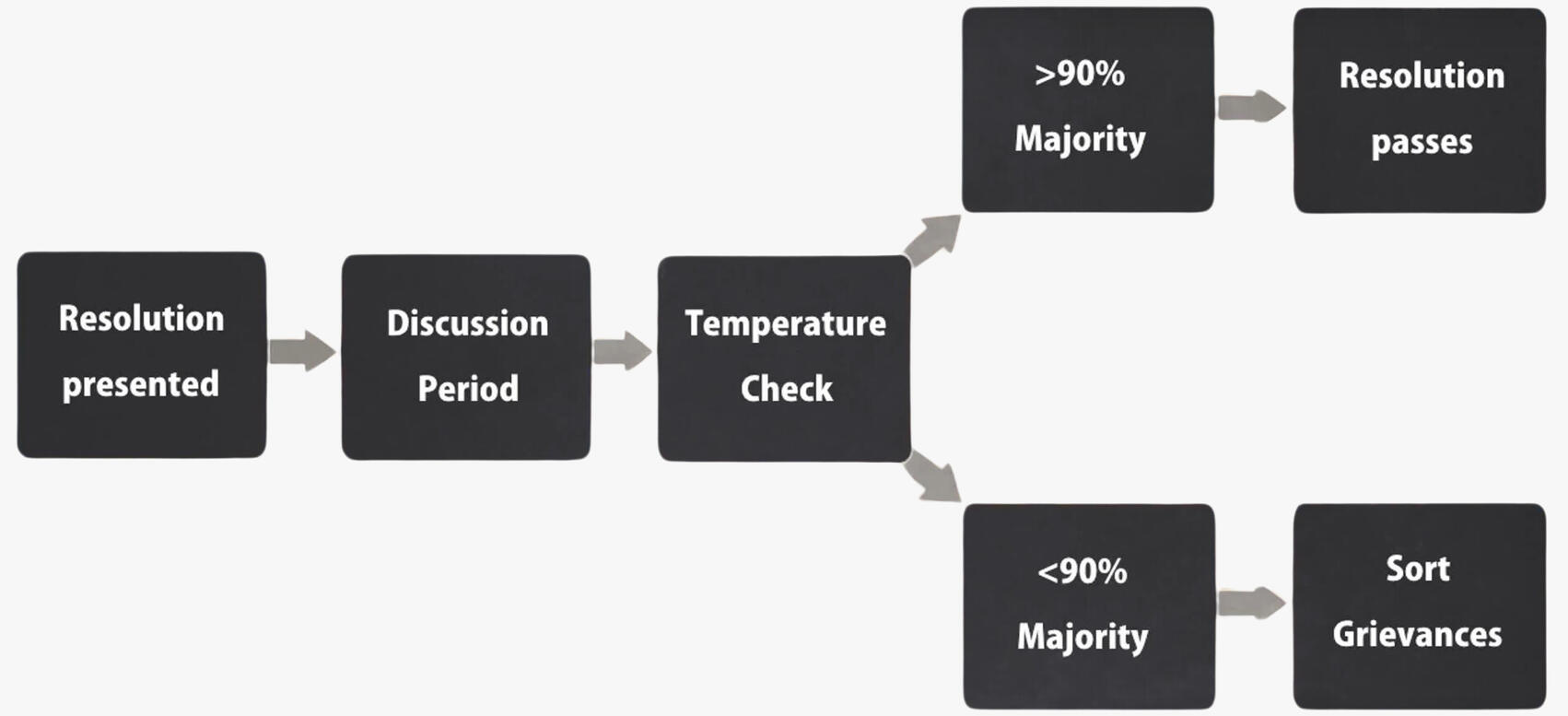
If not, those who voted against the measure are asked to qualify their concerns into deal-breakers or non-deal-breakers. Those who have said that their grievances are not deal-breakers put their complaints into one of several categories and each category of complaint elects a delegate to plead their case.
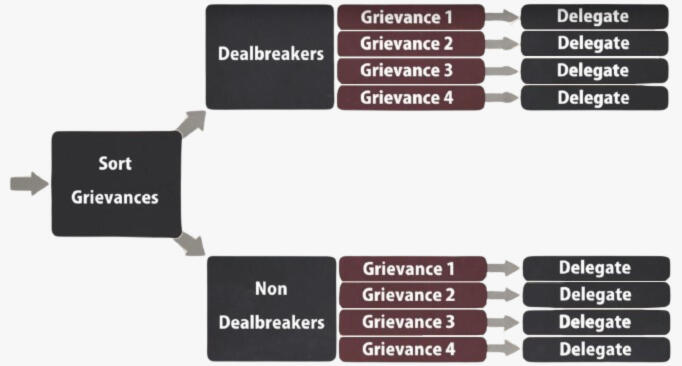
After these delegates have each plead their case, voters are asked to weigh in on their agreement with the grievance and those with the grievance offer amendments that, if instituted, would garner their support. These friendly amendments are then voted on and a temperature check is taken to re-assess the status of consensus. If majority has now reached 90%, the motion is passed and planning will begin.If not, those who said that their grievance was a complete deal-breaker are asked to categorize their complaints and elect delegates to plead their case. Voters are then asked to weigh in on their agreement with these grievances and more amendments are gathered. If, after all amendments have been passed, turned down, or sustained, the majority has now reached 2/3, the motion is passed and planning will begin.
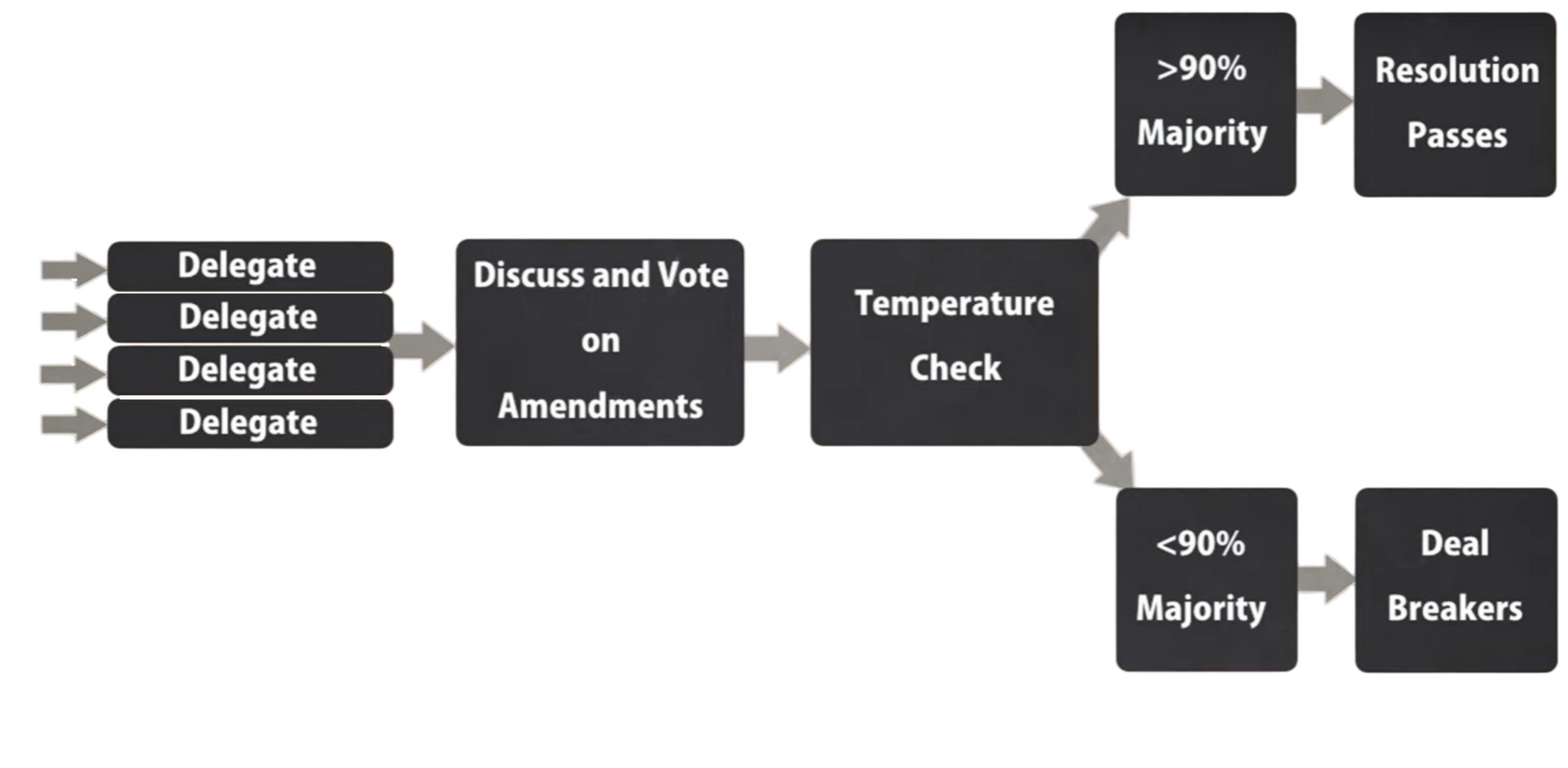
After passage, the minority enters into a contention process during the planning phase of the resolution, such that they might still have some recourse before the resolution is fully implemented. If, during this contention phase, the majority drops below 50%, the resolution is tabled or dismissed.
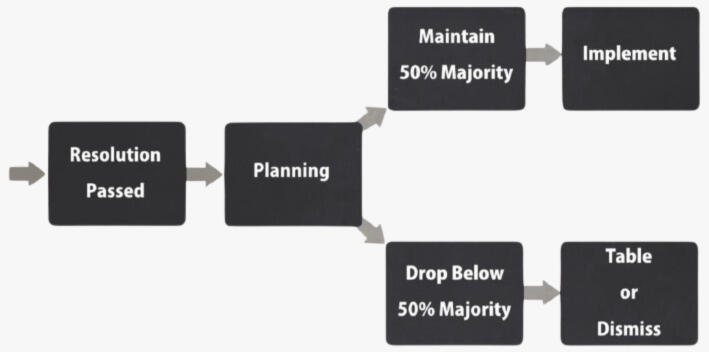
However, if the minority can’t reach a simple majority during planning and implementation, the resolution is carried forward. The body now elects a delegate or numerous delegates to carry out the implementation of the measure under the strict mandate of what was contained in it.




































